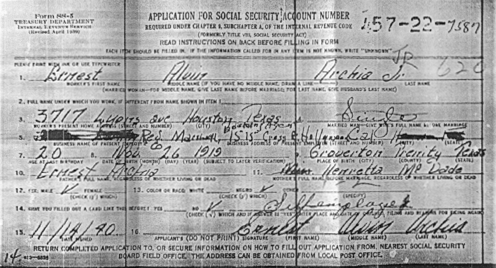
Revision note.We've provided a more accurate release date for Lonnie Johnson's Federal 12376. We belatedly note the first reissue of Wynonie Harris's "Good Rockin' Tonight," on a French Vogue 78. We have correct label copy (at last) for Chess 1445, the reissue of Aristocrat 606. We have added some information about Tom Archia's club gigs in 1954 and 1955. We have also added some information on Barbara Cameron, a singer who recorded at least once with the Hot Lips Page band while Tom Archia was in it (her records are so rare that we still don't know about a second session she made a few days earlier). We have added some information about Brunswick 80117, an early commercial release of Roy Eldridge's World Transcription date, and Decca 23783, from Tom Archia's second recording date with Roy. We added information about the release date for King 4445 by Wynonie Harris. The 2015 release of Wynonie Harris King & Deluxe Acetates, a 2-CD set on Ace, was a major event, throwing new light on the great sessions of December 23 and 28, 1947. Two previously unreleased tracks (one in 2 complete takes and one in 3) now join the Tom Archia solography. Not to mention previously unreleased takes of "Good Morning, Mr. Blues" and "Good Rockin' Tonight." And the material that was previously available is in better sound than ever before.
"Texas Tenors" occupy a well-defined niche in the worlds of jazz and blues. The virtues of Herschel Evans, Illinois Jacquet, Arnett Cobb, and Booker Ervin have been sung loudly and often. Some even remember John Hardee, James Clay, or Marcel Ivery. But little has been said about Tom Archia; this is the first full-length article ever written about him. As a great blues player, an instantly recognizable soloist, and the only Texas Tenor to have taken his inspiration straight from Lester Young, Tom Archia deserves better.
Thanks to Johnnie Mae Walton, Tom Archia's first cousin, we have learned something about his family background. The Archie family (as most of them have always spelled the name) came from the area around Hempstead, Texas (a small town about 50 miles northwest of Houston). In fact, there were several different Archie families (unrelated) around Hempstead and Bellville. Ernest Archie Sr. was born near Hempstead in the late 1880s or early 1890s; his father, Nathan Archie, who died in 1910, was a farmer who had been born into slavery.
Nathan's wife Virginia Archie (1862 - 1932) had a major impact on her family's destiny. Born in Mississippi, she arrived in Waller County, Texas while still a child. She and Nathan had 14 children. Six daughters and 5 sons were still alive at the time of her death. According to one obituary, "Her husband having died in later years leaving her with a number of small children on their farm, with confidence and perseverance she carried on; besides educating all of her children, she greatly increased her holdings. At her death she was reported to be one of the largest land holders in Waller County." Another obituary noted that she was "one of the leading watermelon growers of the state." After she died suddenly while attending an event at Odd Fellows' Hall on February 5, 1932, Black newspapers throughout the state of Texas ran obituaries. An item in the Dallas Express, which ran a few weeks after her death, emphasized her significance as "a firm believer in higher education."
Although she was denied the opportunity to gain a college education, she has invested heavily that her descendants might have the benefit of such training. Being the mother of eleven children, five boys and six girls, this noble soul was left a widow in 1910, but she was able to maintain her own by putting into execution sound principles of business, industry, and thrift.
Mrs. Archie's first child entered Prairie View College in 1905 and from that date till now, each year has found one or more children, or grandchildren of hers at this institution seeking higher learning at her behest and expense.
Eight of her children and two of her grand-children are Prairie View graduates, three of them having graduated with honors. An eleventh descendant, a grandson, is now enrolled at the same institution.
Ernest Archie decided to become a schoolteacher. Following the path already blazed by his older siblings, he attended Prairie View A&M (which is located just a few miles from Hempstead). After graduating he taught school in a small all-Black community known as Sunnyside, which was located 10 or 15 miles south of Hempstead on the road to Brookshire. There he met a local girl named Henrietta McDade. According to Johnnie Mae, "She told me she made it her business to be out in back combing her hair when he passed by on the way to the school." Ernest and Henrietta were married around 1917. As a young man, Ernest Sr. had concluded that his father, whose educational opportunities had been few, was spelling the family name incorrectly; he modified his last name to "Archia." This decision was met with skepticism among his relatives, who continued to spell it "Archie"; referring to Ernest Sr.'s new orthography, Johnnie Mae Walton commented that "he manufactured that." Quite a few years later Tom Archia's last name would show up as "Archie" in his Social Security records (even though he clearly spelled it "Archia" on his application).
Ernest Alvin Archia Jr. was born on November 26, 1919, in Groveton, Texas, where Ernest and Henrietta taught in the local schools. Groveton is a rural town in East Texas, about halfway between Huntsville and Lufkin; its population today is only 1,000. Not long afterward the family moved to Rockdale, Texas (another little town closer to to the center of the state), and then to the Houston area. As a boy Ernest Jr. was generally known as "Sonny." When he became active in music, he decided that he wanted to be called "Tom," because neither "Ernest" nor "Alvin" sounded professional to him; for a while he was billed as "Texas Tom." He even signed some of his autographs with the Tom in quotes. We will respect his wishes here. Tom's sister Richie Dell (named after her mother's sister Susie Dell) was born on October 4, 1922.
For some years, Tom lived with his parents in Baytown (an oil-refinery town east of Houston, where his father was a school principal—in 1932, his place of residence was listed as Goose Creek, a village just outside of Baytown), while Richie Dell lived with her grandmother and aunt in Houston. Although Johnnie Mae also lived in Houston at the time, in the summer and fall everyone made frequent visits to the family farm outside of Hempstead. "My people were watermelon farmers. They had a stand at Lyons and Hill in Houston." (Hill Street is now known as Jensen Drive; in those days, the intersection of Lyons and Jensen was not the fearsome place it would become in the 1960s and 1970s.) She recalls Ernest and Henrietta Archia bringing red snapper with them, which they had bought fresh in Houston. Tom enjoyed riding the horses and watching the cows being milked. "He would tell the man, 'Shoot some of that hot cow's milk in my mouth.'" The frequent visits lasted from 1924 or 1925, when Tom was 5 years old, until 1932, when his grandmother died.
Tom Archia's musical training began early. Every Saturday during the summer (when the family was together in Houston), their parents would drive Tom and Richie Dell across town to their music teachers. Johnnie Mae says that "his mama had him taking violin lessons. I remember the violin case." Richie Dell played piano. "We all embraced music like we'd known it before," Richie Dell said in 1998.
Tom was adept at picking up tunes by ear, and asked his parents to buy him a saxophone. By his teenage years, the family was living in Houston in the district called the Fifth Ward, at 4519 Lyons Avenue, across from the old St. Elizabeth's Hospital. Illinois and Russell Jacquet lived down the street.
At Phyllis Wheatley High School, Tom Archia had the good fortune to work with one of the great band teachers of the era. Percy McDavid (who later became the Supervisor of Music in the Los Angeles schools) was Houston's answer to such legendary figures as Capt. Walter Dyett in Chicago and John T. "Fess" Whatley in Birmingham. He had the same kind of perfectionism. Richie Dell recalls, "He was absolute in what he wanted from you... One wrong note and everybody had to stop and be blessed."
Formal music instruction at the time was strictly classical in orientation. Walter Dyett may have turned out great jazz players, but his bands kept to a strict diet of Sousa marches and Suppé overtures. Very unusually for the period, Percy McDavid taught an eclectic repertoire to his orchestra classes, including "Solitude" and other Duke Ellington compositions. Tom Archia played saxophone in the orchestra, while Richie Dell played piano. Their bandmates included Illinois and Russell Jacquet, Arnett Cobb (tenor saxophone), Calvin Boze (trumpet), and George Haynes (violin—Haynes later became known as a drummer). The high point for this band came in 1935, when Duke Ellington visited Wheatley High School to hear the orchestra. "It was our first visit from a big person...," Richie Dell recalled. "We knew all of his tunes."
Ernest and Henrietta Archia insisted that Tom and Richie Dell get their college degrees. Tom Archia majored in Education at Prairie View, graduating in 1939. He was not the most conscientious student. Richie Dell remembers him frequently skipping class and needing help with his assignments. The bands that came through Prairie View on their way to Houston were far more interesting. "He would disappear with bands... My father would drive across Texas to find him and bring him back." Johnnie Mae Walton, who was a year ahead of her cousin at Prairie View, remembers him as "very immature then—he wasn't even 16 years old" when he started in August of 1935. (In those days, Texas high schools did not go beyond the 11th grade, so 15 and 16-year-old college freshmen were nothing unusual.) "They used to do industries then" at Prairie View, Johnnie Mae says. "He was taking tailoring as an industry, and messed up all of his clothes. I can remember his daddy being mad and upset." When not sewing new pieces into his outfits or trying to tour with other bands, Tom Archia was a member of the Prairie View Collegians, a band that included his old classmate Calvin Boze, and, starting in 1938, a Chemistry major named Charles Brown (1922-1999).
To please his father, Tom Archia worked at an East Texas school for one year (1939-1940); he taught history and served as band director in a small town. But there was no holding him after that. He shipped out with Milt Larkin's band, the premiere Swing aggregration in Houston, which by this time had been in operation for 4 years. Richie Dell recalls getting a letter from Paducah, Kentucky, then one from the Howard Theater, in Washington, DC.

Trumpeter and singer Milton Larkin started his band at the Aragon Ballroom in Houston in 1936. Eddie "Cleanhead" Vinson (alto sax) and Arnett Cobb (tenor sax) were charter members, and Lester Patterson (trumpet) and his brother Gus (saxes) were in the band early on, along with pianist and arranger Cedric Haywood and bassist Lawrence Cato. The Pattersons and Cato defected to Don Albert's band in December 1938, though they would return later. Illinois Jacquet (alto sax in those days) and William Strethen "Wild Bill" Davis (guitar, piano, arranger) had entered the band by 1939.
A few of Wild Bill Davis's recollection of the band are preserved in his two 1987 interviews with Bob Rusch (published in Cadence, 14(9), pp. 23-26, 88, 90 (September 1988). Davis (who was born in 1918) had previously played in bands at the Tuskegee Institute and Wiley College (in Marshall, Texas), but when he left Wiley to join Milt Larkin he was entering his first professional band. Comparing the Larkin band of the late 1930s to the group that Larkin recorded with for Copasetic in the 1970s, Davis commented that the Copasetic ensemble "wasn't as large or able to play the kind of fantastic arrangements that he he had made by a fellow named Cedric [Haywood]. It was something else" (p. 23). Davis noted that the Larkin band toured Texas and Louisiana (with everyone on one bus) and on one occasion went all the way to the West Coast, when the band was recruited to fill in for Floyd Ray's orchestra, which had recently disbanded. "We played a lot of dates in California, Oregon, Washington—up the West Coast and then we went back to Texas" (ibid.).
According to Down Beat on September 1, 1940, the band then consisted of: Milt Larkin (tp, voc, ldr); Eddie "Gogo" Hutchinson, Calvin Ladnier, and Lester Patterson (tps); Henry Sloan, Richard Waters, and Weldon Bolding (tbs); Eddie Vinson (as); Frank Dominguez (as); Ernest Archia (ts); Arnett Cobb (ts); Cedric Haywood (p, arr); Lawrence Cato (b); Henry Mills (d); and George Layne (voc).
For a time, Tom sat alongside "Cleanhead" Vinson, Illinois Jacquet, and Arnett Cobb —that was some reed section. When Bob Rusch mentioned that the Larkin band had Arnett Cobb and Eddie Vinson, Davis hastened to add, "Yeah and Tom Archie [sic], a very, very good tenor saxopone player" (p. 23). The first member of this all-star section to go was Jacquet, grabbed up by Lionel Hampton in time to appear on Hamp's 1942 recordings. Not long after that, Cootie Williams hired Eddie Vinson away. On July 15, 1942, the band, then playing in Houston, consisted of Milt Larkin, Calvin Ladnier, James Lee, and Romie Lewis (tps); Nolan Boldin, Arnett Sparrow, and Gus Evans (tbs); Eddie Vinson (as); Frank Dominguez (as); Ernest Archia (ts); Arnett Cobb (ts); Sam Player (as, bars); Cedric Haywood (p, arr); Lawrence Cato (b); Henry Mills (d); George Layne (voc); and Mabel Franklin (voc). Our source is a Down Beat article titled "Milton Larkin Band Heads for Chicago." At the time, Eddie Vinson was expected to leave Cootie Williams and return to Larkin on a permanent basis—which didn't happen.
What brought Tom Archia to Chicago was the Larkin band's legendary 9-month stand at the Rhumboogie Club in Chicago (from August 1942 to May 1943). This was a major break for the band, which was brought in by clubowner Charlie Glenn to back fellow Texan T-Bone Walker, whose appearance at the club made a tremendous impact. Larkin's contract was accepted and filed by Musicians Union Local 208 on August 6, just in time for the band to open on August 8.
An item by Bruce Baker, Jr., titled "Milton Larkin Band Heads for Chicago" (Down Beat, July 15, 1942, p. 6), gave Larkin a major buildup: "Coming out of Texas with all the might for of a rhythmic tornado..." At the time the story was filed, the band was playing the College Inn in Kansas City, but the Rhumboogie engagement had already been scheduled.
The Chicago Defender's August 8 issue announced the band's opening night at the Rhumboogie, reproducing the lineup from the Down Beat story. Unfortunately, as Down Beat went on to clarify in its September 1 story, "Larkin Leads Are Drafted," the band had to leave James Lee, Romie Lewis, and Gus Evans back in Houston when they received their "greetings" from the local draft board, "scant hours before the band left Houston." Consequently Louis Ogletree had to be added to the trumpet section when the band got to Chicago (and Larkin had to play nearly full time in a section that was temporarily reduced to 3 men); Charles Dirden stepped into the trombone section; and Moses Gant moved into the sax section (initially on alto sax, though in the photo we have of the band, Arnett Cobb is not present, Gant is on tenor and Tom Archia has moved over to alto). Lawrence Cato was also summoned by the local draft board, but was rejected and was able to travel to Chicago and catch up with the band a few days later. In addition Mabel Franklin apparently did not make the trip to Chicago.
During the 9-month engagement other musicians who came up with the band from Texas would be replaced by Chicagoans. Eddie Vinson decided to stay in Cootie Williams' band after all, and Lionel Hampton would carry out another raid, grabbing up Arnett Cobb in April 1943. According to Charles Walton, further turnover resulted because the elaborate arrangements by Marl Young, who took over the Rhumboogie floor show in the summer of 1942, were too difficult for some of the Texans.
In the photo we have of the band, Chicagoans Clarence Trice (formerly of Andy Kirk's band) and Jesse Miller have moved into the trumpet section, Streamline Williams has joined Arnett Sparrow in what is now a two-man trombone section, and Chicagoan Alvin Burroughs is in on drums.
Here are the other musicians who, according to Cedric Haywood in his interview with Kurt Mohr, played in the band at different times during the stand at the Rhumboogie: Lester Patterson (tp); Russell Jacquet (tp); Eddie "Gogo" Hutchinson (tp); William Luper (tb); Henry Sloan (tb); Willie "Blip" Thompkins (tb); Illinois Jacquet (ts); Gus Patterson (saxes); Kermit Scott (ts); and Wild Bill Davis (g, p, arr).
Roy Porter says in his memoirs that Larkin sent for him in April 1943, at which point Porter replaced Joe Marshall on drums, and Tom Archia replaced Arnett Cobb on tenor sax. (Tom Archia really just moved back over one chair; he probably got stuck with the alto assignment when the reality sank in that Eddie Vinson wasn't coming back.) The Larkin band's timing was most unfortunate. The band arrived in Chicago just after the first "recording ban" was imposed on August 1, 1942, so it never did get to record; then, after 7 highly productive years, it broke up when most of the musicians were drafted. Milt Larkin himself was conscripted into the army in November 1943. Archia was still in the band when it played the Howard Theater in Washington DC in May, as mentioned in Porter's There and Back (Bayou Press, 1991, p. 53). The band also played Pittsburgh and hit the Apollo in New York City before returning to Texas and then embarking on an another tour.
The Larkin band's long engagement at the Rhumboogie convinced Tom Archia to settle in Chicago. "That was his town," Richie Dell says. "He loved that place... except when it snowed." He got his first recording opportunity with a Roy Eldridge octet in November 1943, right after Larkin disbanded.
We have indicated solos by Tom Archia, or prominent accompaniments, with an asterisk.

Roy Eldridge (tp); Joe Eldridge (as); Andrew "Goon" Gardner (as); Ernest "Tom" Archia (ts); Ike Quebec (ts); Rozelle Gayle (p); Ted Sturgis (b); Harold "Doc" West (d).
World Transcriptions, Chicago, November 16, 1943
| After You've Gone (Creamer-Layton) [ens shouts] | World JS14B-1, MCA 1355 | ||
| After You've Gone [alt.; ens shouts] | Decca GRD605 [CD] | ||
| Body and Soul (Heyman-Green-Sour-Eyton) | World JS15A-5 | ||
| Embraceable You (Gershwin-Gershwin) | World JS15A-4 | ||
| C15095 | The Gasser (Eldridge) | World JS14B-2, Brunswick 80117, Brunswick BL58045, SoS LP108, MCA [Fr] 510.107, Coral [G] 6855, Affinity [Br] AFSD1016, Decca GRD605 [CD] | |
| I Surrender, Dear (Barris-Clifford) | World JS14-B3, Decca GRD605 [CD] | ||
| I Can't Get Started (Gershwin-Duke) | World JS15A-2, MCA 1355 | ||
| C15096 | Jump through the Window* (Eldridge) | World JS15A-3, Brunswick 80117, Brunswick BL58045, SoS LP108, MCA [Fr] 510.150, Coral [G] 6855, Affinity [Br] AFSD1016, Decca GRD605 [CD] | |
| Minor Jive (Eldridge) | World JS14B-4, Brunswick LP BL58045, MCA [Fr] 510.150, Coral [G] 6855, Affinity [Br] AFSD1016, Decca GRD605 [CD] | ||
| Stardust (Carmichael-Parish) | World JS15A-1, Decca 25440, Brunswick LP BL58045, MCA [Fr] 510.150, Coral [G] 6855, Affinity [Br] AFSD1016, Decca GRD605 [CD] | ||
| Lady Be Good (Gershwin-Gershwin) [inc] | Decca GRD605 [CD] |
Roy Eldridge had just arrived in Chicago to play an 8-week engagement at The Preview (contract accepted and filed by Musicians Union Local 208 on November 18). Our information about the session comes from Tom Lord's Jazz Discography, and Dan Morgenstern's notes to Decca GRD605. Lord incorrectly has Archia playing alto and Gardner playing tenor. Archia's first known solo, on "Jump through the Window," is a well-formed outing with more fuzz on his tone than would be the case later on; he sounds a lot like early Dexter Gordon.
The session was recorded on 16-inch acetates; separate matrix numbers weren't given to each track. The original transcriptions on the World label were released at the time. "Stardust" was released on a singles by Decca later in the 1940s. Brunswick 80117 (with The Gasser" and "Jump through the Window") was listed as a new release in Billboard on October 22, 1949 (p. 67). "Minor Jive" was first released on a Brunswick LP. Affinity AFSD1016 was an LP titled Tippin' Out. French MCA 510.107 was an LP titled Little David and the Goliath MCA 1355 was an LP, released in the early 1980s, titled All the Cats Join In. Decca GRD605 is a CD, released in 1991 and titled After You've Gone; it has also appeared as MCA GRP16052.

Shortly after his transcription session with Roy Eldridge (he may have worked with Eldridge at The Preview, but if so he left before the engagement ended), Tom Archia joined the legendarily troubled "Dream Band" at the Rhumboogie. Pianist Marl Young, who was a mainstay of the "Dream Band," began doing arrangements for the Rhumboogie floorshow during the summer of 1942; he had arranged many of the show numbers for the Larkin band during its stay. When interviewed by Charles Walton, Young recalled, "In 1943, Charlie Glenn, who owned the place, put together what he called his 'Dream Band.' He had Charlie Parker, Eddie Johnson, Tom Archia, Gail Brockman, Paul King, Hillard Brown and a whole lot of other guys. The union put Carroll Dickerson in as leader." He recalled Johnny Houser as the lead altoist; Raymond Orr was in the trumpet section.
An ad ran in the Chicago Defender on November 20, 1943 to the effect that a new review with "Carroll Dickerson and a New All Star Band" would open on the 24th. But in fact, Glenn seems to have assembled this band over the previous month, after Nat Towles and His Orchestra from Omaha finished a run on October 21. He hired what had been King Fleming's Swing band, which since July 30, 1943 (when Fleming was drafted) had continued under the direction of alto saxophonist Richard Overton. Shortly after Overton got the Rhumboogie job, many of the young musicians in the Fleming band were drafted in their turn (eventually so was Overton). Meanwhile, various of the Larkin musicians had had time to return to Chicago and Glenn was able to recruit some of them for his new band. Glenn's enterprise caused trouble later on, when the band members decided that they answered to him instead of their nominal leader, Carroll Dickerson, who was installed at the insistence of Musicians Union Local 208. (Overton was out and Dickerson in as the leader by November 24, when Defender ads touted a new show with Dickerson's band.).
On January 6, 1944, Carroll Dickerson and the members of the Rhumboogie band were hauled in front of Local 208's Board. Band members had failed to show up at a rehearsal that followed a strenuous weekend at the club and a trip to Camp Ellis to entertain troops. "Carroll Dickerson stated that the orchestra had some very good possibilities, but that they lacked discipline, mentioning the fact that some of the members persisted in reporting late, drinking, and smoking on the band stand." However, Dickerson took the blame for not being clear about when the rehearsal was supposed to take place and begged the Board not to fine the musicians. A confrontation ensued between Eddie Johnson and the imperious president of the Union Local, Harry Gray:.
Member Edwin Johnson asked the President if Carroll Dickerson was placed on the engagement by the Board. THE ANSWER WAS NO. Edwin Johnson then asked if the Rhumboogie engagement was classified as an OFFICE JOB? THE ANSWER WAS NO. President Gray then asked Johnson why he asked the questions. Johnson replied that he did not care to answer, and upon insistence from the chair, REFUSED TO ANSWER.
For this act of lèse-majesté Johnson was hauled back in front of the Board on January 20, grilled repeatedly, and fined $10. The other musicians were reprimanded; Charlie Glenn also appeared before the Union Board and "was told that all of his business must be transacted with the leader of the orchestra, as some of the musicians thought they had no reason to respect Dickerson because the band was on the job when he was engaged as it's [sic] leader.".
From the January 6 minutes, we gather that the band consisted of Carroll Dickerson (nominal leader); Gail Brockman, Calvin Ladnier [consistently misspelled Ladner], and Raymond Orr (trumpets); George Hunt and J. Taylor (trombones); Nat Jones (alto sax); Tom Archia and Eddie Johnson (tenor saxes); Marl Young (piano, arranger); Clarence "Hog" Mason (bass—by this time he was the only holdover from the old King Fleming band); and Hillard Brown (drums). The second alto player is the only musician not named. This could be a sign that Charlie Parker had already arrived from Kansas City. (As an out-of-towner, Parker appears to have escaped the summons from Harry Gray and his board.) However, Raymond Orr and Marl Young's remniscences have Johnny Houser on lead alto instead of Nat Jones by the time Bird arrived.
Bird Lives! by Ross Russell has Parker playing the Rhumboogie in Noble Sissle's band, in mid-April 1944—a confused reference to Carroll Dickerson Orchestra. We know that Parker was around on June 1, as the dénouement to the saga will make clear.
Raymond Orr recalls Bird arriving at a Rhumboogie rehearsal after hoboing his way to Chicago. "Marl rushed to the piano and began playing a fast Cherokee. Bird had a little difficulty with the mouthpiece at first [he had borrowed a horn from Johnny Houser, who played lead alto], but when he got that together, he was okay. Everyone in the dressing rooms came out to hear him play. Marl began to change keys every chorus, but Bird still had no problems. When the tune was finished, the band was wringing wet. Bird was fabulous!" (see Charles Walton's interview with Orr in Bronzeville Conversations). Charlie Parker did not have a show-band mentality, as he had already demonstrated during his stint with Earl Hines. What's more, he encouraged Tom Archia in his own rebellion against band discipline. Consequently, when Marl Young finally got control of the band, he fired both of them.
Young recalled one Monday morning when members of the band were playing a breakfast dance at the Club DeLisa, and he caught Charlie Parker surreptitiously removing Johnny Houser's music from the music stand and replacing it with his own. Young threatened to brain Parker with a Coke bottle if he didn't put Houser's music back—immediately. As Young told Walton in 1985:
It was soon after that incident that Carroll Dickerson walked out. He just couldn't take it any more. Parker and Tom Archia were running him crazy. Sometimes we would play a number with no music. This is what we called a head number. The saxes would start playing something and Tom and Parker would turn their backs and just play something altogether different.
Young took over the band shortly after June 1, 1944, when at a stormy Board meeting Dickerson threw in the towel. Dickerson had tried to get the Board to go easy on his musicians, but now he was past the point of exasperation, and so was the club owner.
Mr. Glenn stated that Dickerson had absolutely no control over the members of his orchestra. He further stated that the band played too loud and had not had a rehearsal for the past three months. Mr. Glenn sighted [sic] an instance where 16 out of 18 parties walked out of the Rhumboogie, complaining that the music was too loud. Members of the band continued to come late and after reporting were late after intermissions getting on the bandstand. Mr. Glenn explained that he was taking a loss due to the 30% caberet [sic] tax, bad weather and the orchestra.
Dickerson stated that after the first three days he was on the job, he knew that he would never be able to make anything out of the orchestra. He attributed this to certain factions in the orchestra that resented his leadership, and due to the fact that Charles Glenn had secured most of the men at varied salaries. He further stated that he had tried every trick of the trade to win the men over, even to raising their salaries out of his pay. Dickerson stated that he was so disgusted with the band that he wanted to be released immediately.
Dickerson was reprimanded for the lack [sic] manner in which he had handled the orchestra during the past seven months.
The Local 208 Board then called band members on the carpet, so we know that the lineup now consisted of: Paul King, Calvin Ladnier, and Raymond Orr (trumpets); Gerald Valentine and Milburn Newman (trombones); Johnny Houser (alto sax); Ernest Archia and Edwin Johnson (tenor saxes); Marl Young (piano and arrangements); Clarence Mason (bass); and Hillard Brown (drums). The second alto, Charlie Parker, was not at the meeting, but was in the band and on Marl Young's mind.
Young "could not explain why the band was too loud, explaining that Charles Parker could not play soft which caused the entire band to come up." Young asserted that none of the bands at the Rhumboogie had been able to play softly, except Nat Towles' aggregation, whereupon "Mr. Glenn refuted this last remark by saying that Dickerson's band played softer than Towles for the first two months that they were on the job."
Tom Archia did not escape the governing body's wrath: "Archia seemed to think that his appearance before the Board was a joke, until President Gray asked him what was so funny. His excuse was that he overslept most of the time." And while Carroll Dickerson tried to be diplomatic and refrained from singling out individuals,
Mr. Glenn then stood up and named Archia and Ladner [sic] as the ones that were continuously late and insubordinate. When asked why the men did not got on the stand and play when he called them, he explained that Marl Young talked more than anybody else and usually finished his tale before the orchestra would begin to play. He would start a head number and the men would come in as they got on the stand.
After the entire band was chewed out by Harry Gray, the Board concluded that Dickerson couldn't handle them and granted his request to leave the engagement immediately. Charlie Glenn suggested making Paul King or Johnny Houser the leader, but neither wanted the responsibility. Except for Gerald Valentine and Hillard Brown, who had given notice, the other members of the band were allowed to stay on the job (Brown was in simultaneous hot water with the Board for engaging out-of-towner Ellis Bartee to replace him). However, "Archia offered to quit, inasmuch as he seemed to be the cause of so much trouble. He admitted owing Mr. Glenn some money."
Despite lack of support from the Union leadership, which during the Board meeting pointedly ignored his proposals for improving discipline, Marl Young was allowed to take over as leader at some point in June 1944. There is no reason to doubt that he fired Tom Archia and Charlie Parker at the first opportunity. However, Eddie Johnson, who was popular with the nightclub goers at the Rhumboogie, was kept on, and his initial moves otherwise consisted of engaging a new drummer and a new trombonist. Young was first advertised as directing the house band at the Rhumboogie behind T-Bone Walker's third stay at the club, which began on June 29, 1944; the Young band, probably with some changes in personnel, remained on the job until January 18, 1945. After recording behind Walker and working as a pianist and arranger in the Fletcher Henderson band at the Club DeLisa (February through August, 1946) Young started his own Sunbeam label. For more on the Dream Band, see Charles Walton's interview with Marl Young in Bronzeville Conversations.
After graduating from Prairie View A&M in 1942 with a degree in music, Richie Dell Archia taught school in Port Arthur, Texas, then moved to Los Angeles (Charles Brown, who had had enough after his year of teaching, did the same). She arrived to find no work for Black pianists in classical music, but after working some odd jobs, landed a gig with the Dorothy Dandridge show, "Sweet and Hot" (Charles Mingus also worked this show for a time). Bob Eagle reports that Richie Dell Archia was listed in the September 1944 directory of the old Black Musicians Union Local 767 as living at 984 East 50th Street. From 1945 to the end of 1949, she worked at Ivie Anderson's Chicken Shack, at Vernon and Central.
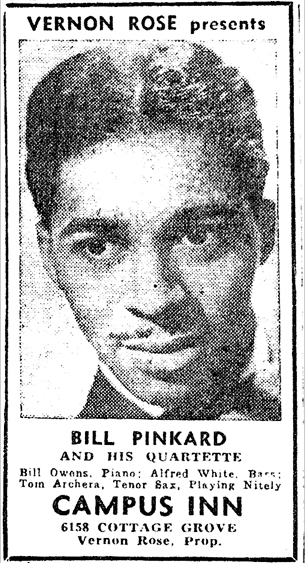
After making his exit from the Rhumboogie, Tom Archia could not take jobs as a leader in Chicago, on account of Harry Gray's opposition. (The Local 208 leadership maintained this attitude through the end of 1947.) Consequently, his subsequent moves are hard to trace. At some point he joined Bill Pinkard's swing combo, which was enjoying a long run at the Campus Inn (6158 Cottage Grove). An advertisement in the Chicago Defender for September 30 named "Tom Archera" as a member of Pinkard's Quartette.
Around the middle of 1945, Tom Archia came out to Los Angeles, where he met up again with the Jacquet brothers (Illinois Jacquet had by this time risen to fame in Hamp's band, then worked with Cab Calloway for a couple of years). He spent several months in Los Angeles in 1945, staying with his sister, and got two more recording opportunities. He was listed in the February 1946 directory of the Union local as c/o his sister's address (though by that point he was actually in the Bay Area.)
By the end of August 1945, Tom Archia had hooked up with old bandmates Illinois and Russell Jacquet..

Russell Jacquet (tp); Henry Coker (tb); Jean Baptiste "Illinois" Jacquet (ts); Tom Archia (ts); Sir Charles Thompson (p); Ulysses Livingston (g); John Simmons (b); John Veliotes [Johnny Otis] (d).
Los Angeles, August 28, 1945
| ARA-1049-2 | Ladies Lullaby [alt.]* (Thompson) | Metro 23000, Mosaic MQ6-165, Mosaic MD4-165 [CD] | |
| ARA-1049-3B | Ladies Lullaby* (Thompson) | ARA 144-B, Mosaic MQ6-165, Mosaic MD4-165 [CD], Classics 948 [CD] | |
| ARA-1050-3A | Illinois Stomp* [Jacquet Special^] (Jacquet) | ARA 144-A, Metro 23000^, Mosaic MQ6-165, Mosaic MD4-165 [CD], Classics 948 [CD] |
Information from the booklet to Mosaic MQ6-165, a box of 6 LPs, and MD4-165, a box of 4 CDs, both titled The Complete Illinois Jacquet Sessions 1945-1950, and released in 1996. The two master takes are also included in Classics 948, a CD released in 1997 under the title Illinois Jacquet 1944-1945. ARA 144 was the original 78-rpm issue, and the only one to identify the group as the "Jacque Rabbits."

Metro 23000 was a 78-rpm single; a copy was the source for the alternate take of "Ladies Lullaby" included in the Mosaic collection. Bob Porter estimates 1948 as the issue date for Metro 23000; the Metro label had the same design as the Rex label, which came from a small Los Angeles operation that was active in 1948..
Though this session shows the Jacquet Brothers to advantage, the potentially explosive reunion between Tom Archia and Illinois Jacquet doesn't come off. Archia gets a little solo space on both sides. On both takes of "Ladies" he has an 8-bar tenor sax solo on the bridge, after Thompson's 16-bar piano solo and before Coker's trombone statement; on "Stomp" he gets the second 4-bar break at the beginning (after Coker's), then 8 bars on the bridge in between muted trumpet statements by Russell Jacquet. His sound is thick and coarse and he seems to be fighting his reed, especially on the alternate take of "Ladies Lullaby.".

Helen Humes (voc); Snooky Young (tp); Willie Smith (as); Corky Corcoran (ts); Tom Archia (ts); Arnold Ross (p); Allen Reuss (g); Red Callender (b); Henry Tucker Green (d); ensemble vocal (-1).
Los Angeles, November 1945
| M-121-A | Voo-It (Frosty) | Philo 121A; Aladdin 121A; Whiskey, Women and... KM701, Classics 1036 [CD] | |
| M-121-B | Did You Ever Love a Man? (no composer listed)* | Philo 121B; Aladdin 121B; Whiskey, Women and... KM707, Classics 1036 [CD] | |
| M-122-A | Central Avenue Boogie* (Hunter) -1 | Philo 122A; Aladdin 122A; Whiskey, Women and... KM701, Classics 1036 [CD] |
Our session information is from Lord. Philo, which would quickly change its name to Aladdin, released 121 and 122 as 78s. (The B side of 122 was "Please Let Me Forget" from Humes' next session on December 22. On that occasion Maxwell Davis and Lester Young took over on tenor.) Whiskey, Women and... KM701, compiled by Dan Kochakian, was a Swedish LP of Humes' material titled Be-baba-leba. KM707, also compiled by Dan Kochakian, was another Humes LP titled New Million Dollar Secret. Classics 1036 is a French CD, released in 1998, under the title Helen Humes 1945-1947.

"Stop Jivin' Around" is occasionally said to have been the fourth title from this session, but it is actually a different title for "Pleasing Man Blues" from Helen Humes' December 22 session (which produced 5 sides all told).
Tom Archia has an obbligato behind Humes' vocal on "Did You Ever" and a long solo on "Central Avenue Boogie." The tenor sax solo on "Voo-It" is by Corky Corcoran. According to Bob Porter, Norman Granz may have produced this session. We'll upgrade the producer credit from "may have," because shortly after this outing, Granz tapped Archia for at least one Jazz at the Philharmonic concert.
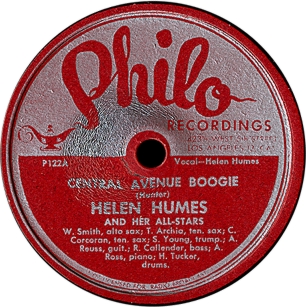
Richie Dell Archia said that Tom Archia participated in some of the early Jazz at the Philharmonic concerts. During Tom's stay in LA, "Norman Granz used to call me, looking for him."
On November 26, 1945, Norman Granz kicked off a three-week JATP tour with a concert in Los Angeles. Not all of the locations have been identified, but the tour appears to have worked its way up the West Coast (including Portland and Seattle), finishing in Victoria, British Columbia. The exact date for Victoria is not known, but the concert took place around December 16, 1945, probably at the Armory.
Canadian musician Fraser MacPherson (then just 17 years old) attended the concert and got several members of the band to sign the program. Courtesy of his son Guy MacPherson, we can now see that Tom Archia was there:
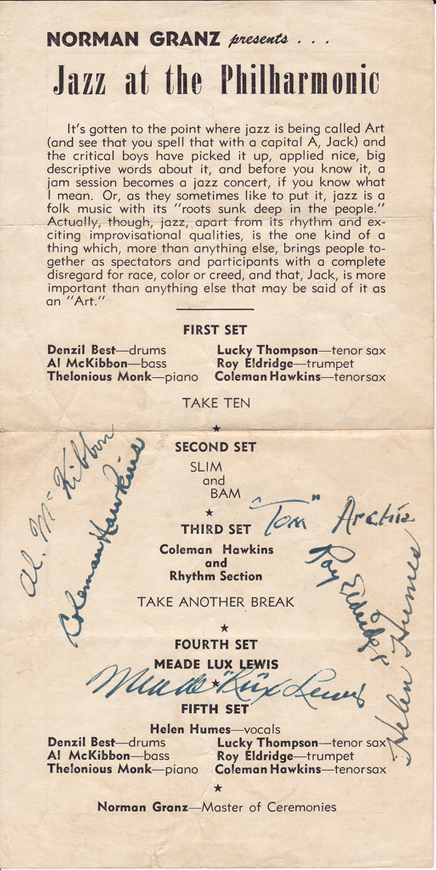
Tom's name wasn't printed on the program, so he must have been called in at some point during the tour to replace Eli "Lucky" Thompson (1924 - 2005). (This could have been as early as the first out-of-town concert, if Thompson decided not to leave LA. However, Thompson doesn't appear to have been added to the Dizzy Gillespie-Charlie Parker combo at Billy Berg's until somewhat later.) Note the quotation marks around Tom's stage name. Coleman Hawkins had been brought back to the West Coast for this particular tour. Thelonious Monk, still a long way from becoming a "name" artist, had been in Hawk's band the previous year. Norman Granz was obviously promoting Helen Humes at the time, and as a recent participant in her session for Philo, Tom was an obvious candidate to fill in on the tour, where his duties consisted of playing in the sextet that opened the concert then finishing the night behind Helen Humes. Hawk got his own set with the rhythm section; the other attractions were boogie woogie pianist Meade Lux Lewis and the vout-o-reenyish duo of Slim Gaillard (piano, guitar, vocals, etc. etc.) and Bam Brown (bass, vocals).
Our thanks to Nou Dadoun for alerting us to Tom's presence at this concert; see the "Monk in Victoria" discussion on the Vancouver Jazz site (May 24, 2010) for more about this tour and the Victoria concert (according to contemporary reports, it was a complete flop commercially).
According to Kirk Silsbee (email of August 31, 2013; see now also his liner notes to Howard McGhee: West Coast 1945-1947, a 2014 release on Uptown CD 27.74), Tom Archia spent the last part of his West Coast sojourn as a member of Howard McGhee's combo. Not too shabby—this was the first bebop band in California, active several months before Bird and Diz arrived for their legendary gig at Billy Berg's on December 10, 1945.
McGhee had arrived in Los Angeles with Coleman Hawkins in late January 1945 and started his own band in April, after he quit Hawk's after a dispute over pay. In May 1945, he recorded "Deep Meditation" with a band that included Teddy Edwards (no second tenor), Vernon Biddle on piano, Stanley Morgan on guitar, Charles Mingus on bass, and Nat McFay on drums.
In July, members of the McGhee band—McGhee himself, Teddy Edwards, Stanley Morgan, and bassists Bob "Dingbod" Kesterson—recorded behind blues shouter Wynonie Harris (1913-1969) for Philo. (The recording outfit was rounded out by Johnny Otis, drums, and Lee Wesley Jones, piano). It appears that Morgan was in the McGhee band from April or May 1945 till July or August.
The McGhee band then recorded on September 4, 1945—when they cut "Intersection," "Lifestream," "Mop Mop," and "Stardust" for Philo/Aladdin. This band has James D. King on second tenor (and Morgan had departed). Also in September the McGhee band cut "Cool Fantasy" (in 2 parts) and "McGhee Special" for the Modern label in Hollywood. These were made with a much augmented ensemble: 2 trumpets, 2 trombones, and 2 saxes added. In November 1945 (listed as December in discographies, but "11:45 Blues" and the presence of Oscar Pettiford, who was about to split to join the Duke Ellington band, point to November), a band of McGhee, Edwards, Biddle, Pettiford, and new drummer Roy Porter, plus vocalists, cut seven more sides for Modern. J. D. King, we should point out, was out of the Hawk lineage and had a characteristically wavery tone that contrasted nicely with the more modern sound Edwards got out of the tenor sax (he had recently switched from alto). Roy Porter had replaced McFay, something he remembered in his 1986 Cadence interview—but this detail did not make it into his autobiography.
Kirk Silsbee (email of August 31, 2013) notes that Tom Archia replaced J. D. King for a few weeks in January and February 1946. He suggests that Archia and McGhee met up at a Saturday afternoon jam session at Billy Berg's. In any event, Archia joined McGhee after his JATP spell ended. The McGhee combo wrapped up a gig in Los Angeles, at the Streets of Paris, in late December 1945, then took an engagement at the Back Stage in Oakland, which lasted for several weeks. The band now consisted of Maggie (trumpet, leader); Teddy Edwards (tenor sax); Tom Archia (tenor sax); Vernon Biddle (piano); Stanley Morgan (guitar); Bob Kesterson (bass); and Roy Porter (drums), plus a singer named Bill Jones (who went, at least for this gig, as "Billy Renault"). See There and Back, pp. 53-54. Roy Porter recalled Tom Archia replacing J. D. King in the band; however, this apparently was only for the duration of the gig.
McGhee then returned to Los Angeles. When he next recorded, for Melodisc in the Spring of 1946, J. D. King was back (definitely—he sang on one side) and Jimmy Bunn had probably replaced Vernon Biddle. Shortly thereafter, McGhee began his rather ill-fated collaboration with Charlie Parker, which was interrupted when Bird freaked out from drug withdrawal and was sidelined for several months at Camarillo. Better musical results would obtain after Bird was released from Camarillo, from March to May of 1947.
By November of 1947, McGhee had made his departure from Los Angeles and was in Chicago recording for Vitacoustic; he would cut another two sessions for the short-lived company in December. On returning to Chicago in March 1948, he found Vitacoustic in Chapter 11, still owing him money for the sessions. Nothing was released until March 1949, when Egmont Sonderling and Al Benson put out a single on their scavenge operation, Old Swing-Master; many of the McGhee sides were then sold to Chance, in 1952, but nothing happened to them on that account. Some use was finally made of them in 1956, after Al Benson sold 12 of the McGhee Vitacoustic to Savoy.
Many thanks to Joseph Scott for detailed information about the 1945 recordings of the Howard McGhee combo, and to Kirk Silsbee for an update on when Tom Archia actually played with McGhee.
We would love to hear Teddy Edwards and Tom Archia trading on "Mop Mop"—is there still a broadcast somewhere?
Roy Eldridge had been working El Grotto with his own big band when the entire aggregation was called on the carpet by the Board of Musicians Union Local 208 on April 4, 1946. Apparently band members had been smoking and drinking on the stand, showing up late, and otherwise giving their leader trouble; alto saxophonist Porter Kilbert and bassist Rodney Richardson drew particular wrath from the Board for not showing up for the meeting, and Eldridge was strongly encouraged to fire them. Eldridge must have recruited Tom Archia in Chicago before traveling to New York City for his next recording session; he also scooped up Ed Gregory, who had been working in the Fletcher Henderson Orchestra at the Club DeLisa.
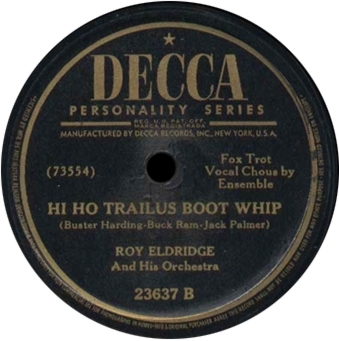
Roy Eldridge (tp, voc); Henry Clay (tp); Elmon Wright (tp); Tom Grider (tp); Jim Thomas (tp); Nat Atkins (tb); Al Riding (tb); George Robinson (tb); Sandy Watson (tb); Edmund Gregory [Sahib Shihab] (as); Chris Johnson (as); Tom Archia (ts); Al Green (ts); Al Townsend (bars); Buster Harding (p, voc, arr); Snags Allen (g); Louis Carrington (b); Earl Phillips (d).
New York City, May 7, 1946
| 73554-A | Hi Ho Trailus Boot Whip* (Harding-Ram-Palmer) [RE, ens voc] | Decca 23637 B, MCA [Fr] 510.107, MCA 1355, Coral [G] 6855, Affinity [Br] AFSD1016, Decca GRD605 [CD], Classics 983 [CD] | |
| 73555-5A | Tippin' Out (Harding-Eldridge)* | Decca 23637 A, SoS LP108, MCA [Fr] 510.107, MCA 1355, Coral [G] 6855, Affinity [Br] AFSD1016, Classics 983 [CD] | |
| 73556-13A | Yard Dog (Eldridge-Harding) | Decca 23697, SoS LP108, MCA [Fr] 510.107, MCA 1355, Coral [G] 6855, Affinity [Br] AFSD1016, Decca GRD605 [CD], Classics 983 [CD] | |
| 73557 | Les Bounce (Eldridge-Harding) | Decca 23783 B, SoS LP108, MCA [Fr] 510.107, MCA 1355, Coral [G] 6855, Affinity [Br] AFSD1016, Classics 983 [CD] |
Session information from Lord. Decca 23637, 23697, and 23783 were 78-rpm singles released at the time. MCA 1355 was an LP titled All the Cats Join In. Decca GRD605 is a CD, released in 1991 and titled After You've Gone. Classics 983, released in 1998, is titled Roy Eldridge 1945-1947.
Archia has long solos on "Hi Ho Trailus" and "Tippin' Out" (where he and Eldridge are the only featured players). His solos have been praised by Gunther Schuller in his book The Swing Era; as Schuller notes, there is still some resemblance to Dex here (the persnickety Schuller is not so fond of Roy's playing on these sides). The tenor sax solo on "Yard Dog" is by Al Green.
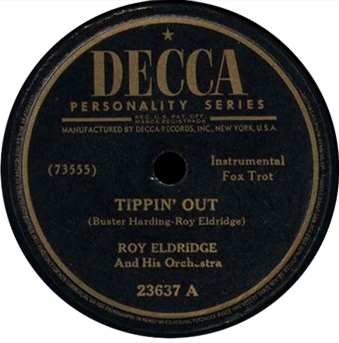
Tom Archia was no longer around when Roy Eldridge recorded his last big band sides, for Decca later in the year. Very likely he was working with Dinah Washington, who appeared at various nightspots in the Chicago area during June and July 1946, following up with a several-week tour of the Midwest. Dinah Washington then decamped to New York City, where her next recording session (in October) was done with Tab Smith's combo.
Early in 1947 Tom Archia joined the house band at the Macomba Lounge, a neighborhood bar and after-hours joint at 39th and Cottage Grove in Chicago. Leonard Chess had opened the Macomba in February 1946. Phil Chess, in an interview with Charles Walton, stated that "After four months we got a band which included Tom Archia and every famous jazz musician came by." (See Bronzeville Conversation: The DuSable Hotel and the Drexel Square Area, http:/www.jazzinstituteofchicago.org/jazzgram/bronzeville/dusable-bronzeville.asp). The Macomba may have acquired a house band in 4 months, but it was more like a year before Archia became a regular. Timothy Brown was the first bandleader to be signed to a Union contract at the Macomba; he held sway for about a month, ending on June 23, 1946 (his contract was accepted and filed by Local 208 on June 6). From June 24 through November 10, 1946, the Macomba used a trio nominally led by drummer Charles Hawkins (contract recorded by Local 208 on July 3, renewal contracts recorded on August 1 and September 19). Wendell Owens was at the piano, and the third member was a saxophonist. We don't know who that was for most of the engagement; it is even possible that Tom Archia played at the Macomba during part of it. George Sims led the off-night band during this period (his contract was also accepted and filed on July 3). Cyril "Cozy" Eggleston, who would gain local renown as a bar-walking tenor player, was on the Macomba payroll from late October 1946 through January 1947, and overlapped with Tom Archia for a while in the first quarter of 1947.
On November 7, 1946, the Board of Local 208 hauled Leonard Chess and the band members in to explain why Chess's tax withholding arrangements did not constitute an end-run around paying Union scale to the leader. While satisfied that Chess was not "chiseling," the Board was upset with Hawkins and booted him out as leader, taking away his contracting rights for two years. The Local 208 Board demand that Chess fill out a new contract that would go into effect on November 11, with Wendell Owens as the leader (this was duly recorded on the contract list for November 21). Owens' status as leader was strictly political, which would cause a lot of trouble for Tom Archia later on.
At the same meeting at which Hawkins was ousted, Ernest Archia posted an "indefinite" contract that he had inked as a leader with Sonny Boswell's Lounge, 55th and Michigan Avenue. The gig at Boswell's seems to have listed till early December; it ended with in an acrimonious dispute over whether Archia had gotten all of his pay. Apparently he was out of work for some time after that, for on January 18, 1947 the Defender announced that he was about to depart for New York City. The entire item (titled "Fete Tommy Archie at Strode Lounge") is worth quoting:
Tommy Archie, one of Chicago's best known musicians who leaves soon for New York and greater fields will be tendered a "going away party" at the Strode Lounge on Oakwood Wednesday night, Jan. 22 it is announced by Charles Gray, owner of the lounge.
Tommy, besides being a top musician, is one of the grandest sports in town which would indicate a large number of his friends and pals will turn out for the party.
Besides indicating his popularity on the South Side, the item shows that people in Chicago paid little attention to the way he preferred to spell his name.
It looks like an offer from Leonard Chess at the Macomba changed his mind about leaving. Tom Archia appears to have joined the Macomba Lounge trio in February of 1947 (during January 1947 pianist King Fleming was booked at the club). Once he came into the Macomba, Chess quickly came to regard him as the leader, but he was still in bad odor with the Union leadership because of his role in the "Dream Band" fiasco three years earlier, while Wendell Owens enjoyed the favor of Harry Gray.
Documentation on Jazz at the Philharmonic concerts is unfortunately not complete, but we know that, as he had done at the end of 1945, Tom Archia spent a little time on the road with JATP. He was on the bill in Detroit on April 12, 1947, along with Coleman Hawkins, Buck Clayton, Howard McGhee, Trummy Young, Willie Smith, Kenny Kersey, Benny Fonville, and Helen Humes. The concert was reviewed in the Michigan Chronicle on April 19 (all of this is duly noted in the book that accompanies the Complete Jazz at the Philharmonic set on Verve). The concert was, alas, not recorded. Tom Archia may have played another JATP event or two during this period. Thanks to Joseph Scott for bringing this item to our attention.
During June 1947, the Chicago Bee ran four weekly advertisements for the Macomba Lounge, promising "continuous entertainment" by the Wendell Owens Trio: "Tom Arche, sax, Wendell Owens, pianist, Glenn Brooks, drummer." Our thanks to Nadine Cohodas for locating these ads, one of which is now reproduced in her book Spinning Blues into Gold. The obstacles to getting acknowledgment as the bandleader came into plain sight on June 19, 1947, when the Union blocked Leonard Chess's effort to replace Wendell Owens with Eddie "Sugarman" Penigar at the piano.
The Board wanted to know why Chess was giving the trio 2 weeks' notice, effective June 29—only to hire Archia and Brooks right back. The word "collusion" was used. Owens claimed that the other two knew about the 2 weeks' notice before he did. The Board also got Chess to admit that Tom Archia had been drawing his salary in advance and owed him $150 (nearly two weeks' pay).
Mr. Chess stated that he did not feel as though this procedure on his part was irregular. He was of the opinion that Penigar was a better and livlier [sic] pianist than Owens, and that by making the change, he would have better entertainment to meet his competition. He also stated that Penigar did not approach him for a job...
Archia stated that he had made no effort to obtain leadership, and mentioned the fact that Chess had offered the job as a contractor several months ago, which he refused.
In a Pyrrhic victory for Leonard Chess, Board allowed the Macomba let the trio go—on the condition that Archia and Brooks not return for three months! Consequently Chess withdrew the notice to Owens—for the time being.
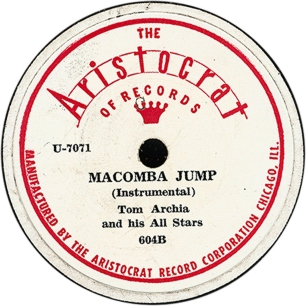
The Macomba has been magnified by legend. It was not a posh nightclub; Billy Eckstine and Ella Fitzgerald may have visited (as so many out-of-town musicians did) and even jammed there, but they were never booked at the Macomba. In truth, it was a narrow little dive with a tiny bandstand; the club was just off the intersection that reform-minded politicans and their supporters knew as "Sin Corner."
What mattered at the Macomba was the music. The house band always included some of the best jazz musicians in Chicago. Leonard Chess paid them better than Union scale, though Tom Archia took more of his compensation in alcoholic form than was prudent. The jam sessions, which could go on till dawn or beyond, were locally renowned. They were not, however, appreciated by Local 208, which had a rule against jamming. Local 208 began periodic crackdowns against the practice in 1946 (for instance, on October 17, 1946, the 208 Board fined Jack Cooley, Cozy Eggleston, and three other musicians for jamming at three different clubs); President Gray's assistants were sent to monitor what was happening in the clubs, and periodically they would break up jam sessions. Despite the occasional chilling effect, the Monday night sessions at the Macomba were attended by all the local musicians and anyone who was visiting.
Tom Archia's next recording opportunity was with a brand-new independent operation called Aristocrat. Aristocrat had been opened by Charles and Evelyn Aron (and their partners Fred and Mildred Brount and Art Spiegel) on April 10, 1947. Its first recordings featured hotel-band leader and singer Sherman Hayes, a vocal harmony group called the Five Blazes, and jazz singer Jackie Cain backed by the George Davis Quartet. But the Arons were willing to venture into any genre if it might sell records. In June 1947, they hooked up with black talent scout Sammy Goldberg, who would bring them Clarence Samuels, Sunnyland Slim, and Andrew Tibbs. He began by pulling in drummer Armand "Jump" Jackson, who was already a veteran of the Chicago recording scene. At the time Jackson's quartet was working the New Morocco Lounge, in the same neighborhood as the Macomba.
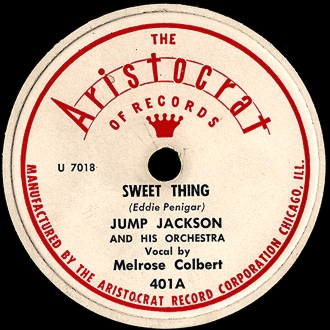

Armand "Jump" Jackson (d); Johnny Morton (tp except -1); Oett "Sax" Mallard (as except -1); Eddie "Sugarman" Penigar (ts except -1); Tom Archia (ts); Bill Owens (p); Hurley Ramey (eg); Dallas Bartley (b); Melrose Colbert (voc); Benny Kelly (voc).
Universal Recording, Chicago, June 1947
| U7018 | Sweet Thing (Eddie Penigar) [MC voc] | Aristocrat 401A | |
| U7019 | Choo Choo Blues* (D. Clark) [BK voc] | Aristocrat 403A | |
| U7020 | The Greatest Mistake (Sax Mallard) [MC voc] | Aristocrat 402B | |
| U7021 | Not Now Baby* (Kelly-Goldberg) -1 [BK voc] | Aristocrat 401B, Oldie Blues [Nl] OL 8014 | |
| U7022 | Hey Pretty Mama* (Hickman-Jackson) [BK, ens voc] | Aristocrat 402A, Oldie Blues [Nl] OL 8014, MCA 380-596 [CD] | |
| U7023 | I'm Cutting Out on You [prob. BK voc] | unissued |
Aristocrat matrix numbers in the U7000 series point to Universal Recording, which was the premier studio in Chicago during the late 1940s and most of the 1950s.
Jepsen's Jazz Records and Michel Ruppli's discography The Chess Label have mistakenly split this session in two. They have U7018-U7020 with Morton, Mallard, Penigar, and the rhythm section; then they list U7021-U7023 with only Archia and the same rhythm section. Yet all four horns are present on U7018, U7019, U7020, and U7022. Only on U7021 is Archia the sole horn.
A major cause of confusion for the previous discographies was swapping U7019 and U7022 (and besides being given the wrong matrix number in these sources, U7019 was retitled "Train Blues.") The dangers of relying on the skimpy documentation retained by Chess Records are fully evident! Jepsen and Ruppli's longer title for U7021, "Not Now Baby, I'll Tell You When," is presumably derived from the Aristocrat master book.
Our correct information on U7018-U7022 comes from copies of Aristocrat 401, 402, and 403 in Dan Kochakian's collection. U7023 is as listed in Ruppli—is the master still extant?
"My Greatest Mistake" features Sax Mallard's rather lachrymose alto sax (Melrose Colbert, it should be noted, was a female vocalist). Mallard, a Hodges acolyte, gets assigned to the schmaltz patrol again on "Sweet Thing." "Hey Pretty Mama" has solos by Tom Archia, Hurley Ramey (presumably—the guitarist sounds a little different from the guitarist on the next session), Johnny Morton, an "oo-bop she-bam" riff that Archia picks up and carries, and a break by Sax Mallard. Archia is the sole horn on "Not Now Baby" and has a long solo on "Choo Choo Blues." This is mature Tom Archia: smoother now, closer to Lester that way, with a sound as big as a house.
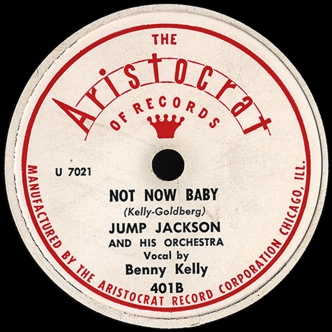

According to George R. White ("The Aristocrat of Records,"Blues and Rhythm, 124, Nov. 1997, pp. 4-8), Aristocrat 401 was released in September 1947, 402 in November 1947, and 403 in December of that same year. Aristocrat 402 was listed in the Advance Record Releases in Billboard on November 15, 1947 (p. 32). The flip side of 403 came from a September 1947 session by Clarence Samuels with Dave Young's Orchestra (U7047, "I Don't Love You Mamie").
Two sides from this session were reissued in 1986 on a various-artists LP from the Netherlands, Screaming Boogie: Hot Screamin' Saxes from Chicago 1947-1951, on Oldie Blues 8014. Sides by Dick Davis, Buster Bennett, and the Chicago All Stars were also included. Another side from this session was reissued in 1999 on Chess MCA 380-596, a 15-CD extravaganza titled The Chess Story 1947-1975.
The June 1947 recording date seemed likely for a number of reasons. It is clinched by a June 30, 1947 item in Cash Box. In the gossip column "Around the Wax Circle," a letter from Evelyn Aron is cited announcing that Aristocrat has signed Jump Jackson and his band, along with "Melrose Colbert, sepia torch."
Wendell Owens, still the nominal leader at the Macomba, was not the same pianist who appeared on this session, or the next one; this is not surprising, given that Leonard Chess and Tom Archia were dissatisfied with his playing. In fact, Eddie Penigar (who Chess attempted to hire for the Macomba) made the first session, playing his other instrument, the tenor sax. The core membership of the band on these sessions came from Jump Jackson's combo that held a gig at the New Morocco Lounge. (Other Aristocrat sessions would feature Andrew Tibbs, who was working at Jimmy's Palm Garden, and Gene Ammons, who frequently headlined at the Congo Lounge—all in the same neighborhood.) A photo in the June 14, 1947 Chicago Defender mentions this long engagement at the Morocco, and shows Sax Mallard, Bill Owens, Johnny Morton, and Jump Jackson.
Also worthy of note is that a similar lineup (horns minus Archia, different guitarist and bassist) recorded for Columbia as the Chicago All Stars (see our Sax Mallard page for details). Their first session took place on June 27, 1947, very close to this one. Their second and last session on December 6, 1947, added Joseph "Cool Breeze" Bell, Clarence "Pro" McClam and Cozy Eggleston on vocals; it included a version of "Ice Man Blues," sung by Cool Breeze, which has never been released. Was this the same number that George Kirby sang on the first session by Tom Archia and his All Stars?
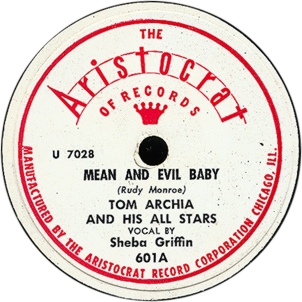
Tom Archia (ts); Buster Bennett (ts, voc); Bill Owens (p); Hurley Ramey (eg); Dallas Bartley (b); Jump Jackson (d); Sheba Griffin (voc); George Kirby (voc).
Universal Recording, Chicago, July 1947
| U 7028 | Mean and Evil Baby* [Mean and Evil Daddy^] (Rudy Monroe) [SG voc] | Aristocrat 601A, Chess 1448^, Classics 5006 [CD] | |
| U 7029 | Ice Man Blues* (George Kirby) [GK voc] | Aristocrat 602A, Chess CHD2-9387 [CD], Chess MCA 380-596 [CD], Indigo IGOCD 2111 [CD], Classics 5006 [CD] | |
| U 7030 | Cherry* (Sheba Griffin) [SG voc] | Aristocrat 602B, Classics 5006 [CD] | |
| U 7031 | Fishin' Pole* (Buster Bennett) [BB voc] | Aristocrat 601B, Chess CHD2-9387 [CD], Classics 5006 [CD] |
Aristocrat 601 and 602 were 78-rpm singles; according to George R. White, they were released around November 1947 and February 1948. Aristocrat 601 was listed as an Advance Record Release in Billboard on November 15, 1947 (p. 32). Chess 1448 was a 78-rpm single (the company hadn't adopted the 45 yet); it was released in November1950.
Chess CHD2-9387, The Aristocrat of the Blues: The Best of Aristocrat is a 2-CD various artists collection from the Aristocrat label, released in August 1997. "Ice Man" appeared again in 1999 on Chess MCA 380-596, a 15-CD extravaganza titled The Chess Story 1947-1975. Indigo IGOCD 2111, Rhythm & Blues All Stars Vol. 3: Jump and Shout, was released in Britain in 2000; it was a various-artists compilation, with the "The Fish" by Sonny Thompson and "Easy Baby" by Sugarman Penigar as the other Chicago entries. The first full reissue of this session is Classics Blues and Rhythm 5006, a CD issued in February 2001 under the title Tom Archia 1947-1948.
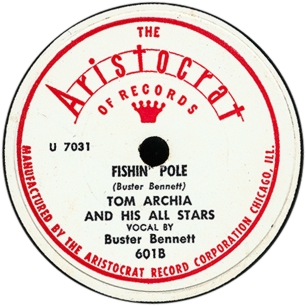
Lord's treatment of this session is highly incomplete. Even Ruppli's Chess discography does not specify the rhythm section; neither Lord nor Ruppli mentions the second tenor sax. The Chess CD gives the rhythm section listed here, which is identical to the Jump Jackson lineup. The guitarist does sound different from Leo Blevins, who worked with Archia later, and George Freeman, who may have been on the clandestine live sessions from early 1948; the pianist does not resemble either Bill Searcy or Willie Jones, who worked regularly with Archia later.
The second tenorist is not mentioned in any source. Back in 1997, speculation in these quarters pointed to Gene Ammons (possible with "Mean and Evil Baby" but not the other tracks, where the second tenorist plays rougher than Jug ever did) and to Sugarman Penigar, who was on the previous session. But the vocal credit to Buster Bennett on "Fishin' Pole" (and the fact that the vocals on this one number are accompanied by Tom Archia only) solves the mystery at last. "Fishin' Pole" is presumably the same as "Let's Go Fishin'," which Bennett recorded for Columbia on September 30, 1946; "Let's Go Fishin'" has never been released.
"Mean and Evil Daddy" uses the words that Sheba Griffin actually sang, but "Mean and Evil Baby" was the title on the Aristocrat label.
The vocal credits have been garbled in all previous sources, including the one CD reissue of two of these items. For instance, Sheba Griffin did sing on this session, as advertised. But the liner notes to Chess CHD2-9387 claim that she was the vocalist on the phallocentric "Fishin' Pole"!
Worse yet, the two male vocalists were never correctly identified. George Kirby (best known for doing impressions at the Club De Lisa, but also a capable vocalist, according to Vernel Fournier) is identified on the label as the singer on "Ice Man Blues." Buster Bennett is identified as the vocalist on "Fishin' Pole" and his singing is recognizable. Ruppli and others have attributed these vocals to Dr. Jo Jo Adams.

Another session that really did include uptown blues singer Dr. Jo Jo Adams followed quickly. Born in Alabama somewhere around 1918, Adams rose to prominence at the Club De Lisa, where he was renowned for his salacious lyrics (which of course had to be toned down on records) and his wardrobe of loudly-colored tuxedos. On this occasion, Tom Archia seems to have recruited his own band instead of relying on Jump Jackson.

Johnny Morton (tp); prob. Andrew "Goon" Gardner (as); Tom Archia (ts); unidentified (p); Floyd Smith (eg); unidentified (b); unidentified (d); Dr. Jo Jo Adams (voc).
| U7032 | Love Me (Adams) [JJA voc] | Aristocrat 801A, Classics 5006 [CD] | |
| U7033 | Drinkin' Blues* (Fenner-Adams) [JJA voc] | Aristocrat 801B, Classics 5006 [CD] | |
| U7034 | If I Feel like This Tomorrow* (Adams) [JJA voc] | Aristocrat 802-A, Classics 5006 [CD] | |
| U7035 | Cryin' by My Window* (Adams) [JJA voc] | Aristocrat 802-B, Classics 5006 [CD] |
Aristocrat 801 and 802 were 78-rpm singles. Aristocrat 801 was released in November 1947. By interpolation between the release dates for 801 and 803, George White has estimated that 802 was released in March 1948, but this needs to be confirmed (no advertisements for 802 are known). The first reissue ever of this material is Tom Archia: 1947-1948 on Classics Blues and Rhythm 5006, issued in February 2001.
Our thanks to Bob Porter for composer credits on Aristocrat 801. Meanwhile, all previous discographies have omitted 802. "If I Feel like This Tomorrow" was listed by Ruppli as unissued and without a vocal credit. "Cryin' by My Window" showed up in Ruppli as an unissued "untitled jazz instrumental." Lord, meanwhile, lists "Cryin' by My Window" with no session or matrix information. The Fenner who was jointly responsible for "Drinkin' Blues" was Senabelle Richie Fenner, later mentioned in the Chicago Defender on February 23, 1952 as a "writer, poet, and song-stylist, whose compositions have been recorded by numerous artists."
"Cryin' by My Window" has an obbligato by Tom Archia, but the solo is taken by the altoist. We used to think that this was Sax Mallard (who we know appeared on Tom Archia's session of October 1947 with Andrew Tibbs), but the soloist uses many bebop licks—our best current guess is Goon Gardner, who worked frequently with Archia over the years. On "Love Me" the only solo is by the trumpet player; on "Drinkin' Blues" the solos are by Archia (who also handles the obbligato behind the vocal) and the guitarist. Archia launches his solo with an apt quotation of "I Got Plenty o' Nothin'."

The instrumental lineup here is completely different, yet Ruppli collapsed this session together with U7028-U7031. Our identifications are still tentative; the guitarist is loudly amplified and treads heavily—not Hurley Ramey, and not Leo Blevins. Willie Jones, who was Archia's regular pianist in from 1948 through 1950, was not at the Macomba yet and is not on this session either; Bill Searcy appears to have made the two Tom Archia sessions in October 1947.
Meanwhile, the battle over Wendell Owens continued. On July 3, Glenn Brooks and Tom Archia appeared in front of the Local 208 Board, trying to get the Board's previous ruling rescinded.
Brooks thought it was unfair to deny him the privilege of working the Macomba Lounge, and stated that Owens did not do the things that a leader was expected to do. He contended that Owens got drunk and disregarded chord changes, or deliberately went to sleep on the stand.
Wendell Owens didn't take this too well, particularly since he had often loaned Brooks money when the club's management wouldn't give him an advance on his salary.
Archia stated that Mr. Chess had asked him several times to assume leadership of the unit, but that he refused until this time. He admitted that all of them drank on the job. In answer to Owen's [sic] question pertaining to his musical ability, he gave a round the bush answer, but when finally pinned down to the question, he replied that Owen's was alright.
The Board refused to budge. But while Leonard Chess was new to the music business, he had already taken some hardball lessons. He encouraged Brooks and Archia to go over the head of Harry Gray, the President of Local 208, and write directly to James Caesar Petrillo, the redoubtable President of the American Federation of Musicians.
On August 7, Leonard Chess was back in front of the Local 208 Board; he had given Owens his notice but was begging to be able to keep Tom Archia on the gig:
Chess explained to the Board that Tom Archia was a wonderful musician and definitely an asset to his business. He begged the Board to rescind its previous ruling, whereby Archia could not return to his establishment for 90 days after Owens left. HE MADE IT VERY PLAIN THAT HE WAS NOT INTERESTED IN MEMBER GLENN BROOKS.
Archia was apologetic for going past Harry Gray to James Caesar Petrillo:
The letter addressed to President Petrillo and signed by Archia and Brooks was read. Archia stated that he signed the letter without reading it, realizing now that he shouldn't have done it. He also stated that it was at Brook's [sic] suggestion that the case was re-opened on July 3, 1947. Archia apologized to the Board for all the trouble he had been and stated that he could get another job and that it was Mr. Chess who wanted him to work at the lounge.
At which point Leonard Chess took charge of the discussion.
Mr. Chess stated that the whole affair was his fault because he did not understand the Union's rules and regulations. He stated that he had tried to make a go of it with member Owens, but just couldn't take it any longer. He suggested that the Local select any two men to play with Archia and collect the payroll if necessary.
The Board repealed its previous rulings, allowing Archia and Brooks to continue after Owens was let go. But there was a kicker; the Board also "RULED THAT MEMBER TOM ARCHIA CAN ONLY BE EMPLOYED AS A SIDE MAN."
On August 10, Leonard Chess was finally able to fire Wendell Owens, who had been the nominal leader at the Macomba; he had also signaled his intent to let Glenn Brooks go. It would more than a year before the Union would recognize Tom Archia as the bandleader.
A photo taken at the Macomba Lounge in Fall 1947 (in the Charles Walton collection) shows Archia with a rhythm section of Bill Searcy, Lowell Pointer, and Robert "Hendu" Henderson. Drummer Oliver Coleman (Charles Walton's teacher) was a member of this band before Henderson. However, the drummer on the Jo Jo Adams session doesn't sound especially different from the drummer on the October 1947 sessions; Coleman was basically a Swing drummer.
Though Leonard Chess was the proprietor of the Macomba Lounge, where Archia was a mainstay, it appears that he was not yet involved with Aristocrat at this early stage. The next session, by 17-year-old blues singer Andrew Tibbs, has always been said to be the first one that Leonard Chess attended; the first public mention of his employment by the label appeared in Billboard on October 11, 1947.
Tibbs' debut session for Aristocrat is thoroughly confusing. The singer was backed by a band led by tenor saxophonist Dave Young (who had been in Roy Eldridge's band; he also recorded with Lucky Millinder and Dinah Washington). David A. Young was born on January 14, 1912, in Nashville, Tennessee and died in Chicago on December 25, 1992.
Tom Archia seems to have sat in on this session, though. Archia co-composed "Bilbo Is Dead"; after Aristocrat hid Tibbs out in a hotel under the wise guidance of Sax Mallard, so other labels couldn't steal him, Archia and Tibbs worked out the number in the back seat of a cab on the way to the session, and Tibbs brought the lyrics into the session inscribed on a paper bag. However, an instrumental number featuring Archia ("Hey Tom Archia") that looks as though it came from this session had an entirely different origins; though given the matrix number U7048S, it is a duel between Tom Archia and Gene Ammons that originated at Pershing Ballroom jam sessions clandestinely recorded by Al Benson in early 1948.
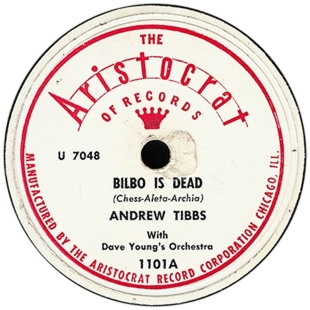
Andrew Tibbs [Melvin Andrew Grayson] (voc); Dave Young's Orchestra: Dave Young (ldr, ts); Harry "Pee Wee" Jackson (tp); Andrew "Goon" Gardner (as); Tom Archia (ts); Rudy Martin (p); Bill Settles (b); Curtis "Geronimo" Walker (d).
Universal Recording, Chicago, September 1947
| U7048 | Bilbo Is Dead (Archia-Tibbs) [AT voc] | Aristocrat 1101A, Chess CHD4-9340 [CD], Chess CHD2-9387 [CD], Chess MCA 380-596 [CD], Classics 5028 [CD] | |
| U7049 | Union Man Blues (Archia-Tibbs-Grayson) [AT voc] | Aristocrat 1101B, Chess CHV 415, Bellaphon [G] BJS4032, Classics 5028 [CD] | |
| U7050 | Toothless Woman Blues (Coppage) [AT voc] | Aristocrat 1102A, Classics 5028 [CD] | |
| U7051 | Drinking Ink Splink (Banks-Pyles) [AT, ens voc] | Aristocrat 1102B, Chess CHV 415, Bellaphon [G] BJS4032, Indigo 2094 [CD], Classics 5028 [CD] |
Aristocrat 1101 and 1102 were singles released in December 1947 and March 1948.
George R. White points out that since Theodore Bilbo, a notorious segregationist who was Governor of Mississippi and later U. S. Senator, died on August 21, 1947, a September recording date is most likely.
Aristocrat 1101 was not played on the radio in some parts of the South because of its A side, a Black man's crocodilic lamentation on the death of a notorious White racist. Russian artists who composed ironic praises of Stalin would fully understand lines like "Since Mr. Bilbo is dead, I feel like a fatherless child." Nadine Cohodas has shown that the story about the 78 being destroyed in quantity by union truckers on account of Side B is completely apocryphal. (In fact, the number talks about how the Union is powerful and no one should mess with Tibbs now that he is a member—and the single seems to have sold well locally.)
Besides the confluence of matrix numbers, and Tom Archia's cab ride with Andrew Tibbs, the ensemble on the Tibbs numbers is just thick enough to have two tenors and an alto instead of one tenor and an alto. Jepsen put Tom Archia on the session. But other discographies have given Dave Young's regular lineup, which previously appeared on a session backing Clarence Samuels the same day—"Boogie Woogie Blues" and "Lollypop Mama" on Aristocrat 1001; "I Don't Love You Mamie" on 403B—and have not mentioned Archia.
Chess CHV 415 was a various-artists LP, issued in 1972 under the title Southside Jazz. There was a German issue later in the 1970s on Bellaphon BJS4032. Personnel and date from the Chess LP liners.
Chess CHD4-9340 was a 4-CD collection titled Chess Blues and released in 1992. Chess CHD2-9387 is a 2-CD various artists collection titled The Aristocrat of the Blues: The Best of Aristocrat. It was released in August 1997. Indigo IGOCD 2094, Rhythm & Blues All Stars Volume 2: Rockin' the House, is a various-artists CD released in Britain in 1999; other tracks are by Jimmy Witherspoon, Big Joe Turner, Roy Brown, Bull Moose Jackson, Dick Davis & Sonny Thompson, and many others. "Bilbo Is Dead," now a favorite item in reissue collections, appeared again in 1999 on Chess MCA 380-596, a 15-CD extravaganza titled The Chess Story 1947-1975 Classics 5028, Andrew Tibbs 1947-1951, was issued in February 2002.
The solo lineup:
The Chess CD lists Tibbs as the composer of "Bilbo." However, the original Aristocrat label from Dr. Demento's collection, reproduced on the back of the CD leaflet, attributes the number to "Chess-Aleta-Archia." In fact, Archia did contribute to it, as Andrew Tibbs acknowledged in a 1982 interview with Jim O'Neal of Living Blues. According to the same interview, Andrew Tibbs' mother helped out with "Union Man" (which is credited just to Tibbs on the label). Meanwhile, the copyright records in the Library of Congress attribute both "Bilbo" and "Union Man" to Archia; Tibbs' name is not mentioned. And Evelyn Aron and Mildred Brount are listed at the copyright holders!
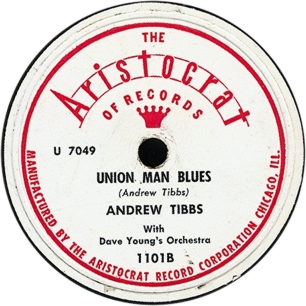
Although Tibbs is credited with "Drinking Ink Splink" on the label, this is bogus. The tune was first recorded in 1946 as "Ink Splink" by the Buddy Banks Sextet with Marion "Blues Woman" Abernathy handling the vocal chores—in Los Angeles, for the Melodisc label. A reissue of the Melodisc on Blue Moon BMCD 6015, Buddy Banks 1945-49, identifies Banks and William "Frosty" Pyles as the writers. One wonders whether Tom Archia heard Buddy Banks do this number during his stay in Los Angeles, or whether another musician on this date heard the record and thought the material would suit.
It appears from Nadine Cohodas' research that Clarence Samuels (U7044-7047) recorded with Dave Young the same day, and that Sunnyland Slim and Muddy Waters (U7056-7059) went on after the Dave Young-backed singers were finished. Even if Prince Cooper's piano trio (U7052-7055) actually recorded on a different day, Aristocrat was consuming lots of studio time on this occasion.
Although Tom Archia played the same way regardless of surroundings, most of his work for Aristocrat was in an R&B context behind vocalists. He did get to make two jazz sessions in the studio, however. His next session for the label is the only one he ever did with just himself and a rhythm sesssion. It is a neglected classic of post-World War II jazz.
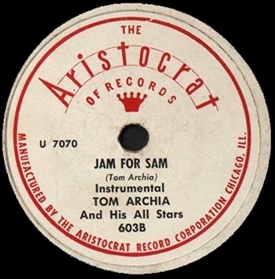
Tom Archia (ts, voc); Bill Searcy (p); Leo Blevins (eg); Lowell Pointer (b); Robert "Hendu" Henderson (d).
Universal Recording, Chicago, October 1947
| U 7070 | Jam for Sam* (Archia) | Aristocrat 603B, Classics 5006 [CD] | |
| U7071 | Macomba Jump* | Aristocrat 604B, Classics 5006 [CD] | |
| U7072 | Downfall Blues* [Whiskey^] (Archia) [TA voc] | Aristocrat 605, Chess CHV 414^, Classics 5006 [CD] | |
| U 7073 | Slumber* [Minor Blues^] (Archia) | Aristocrat 603A, Chess CHV 414^, Classics 5006 [CD] | |
| U7073 [reverb added] | Blues at Twilight* (Archia) | Chess 1448 |

Our basic session information comes from Ruppli. "Blues at Twilight" (not mentioned in Lord) and "Minor Blues" (listed as a separate item in Lord) are retitle jobs on "Slumber." In all cases the same performance was used. Aristocrat 603 had no reverb. Nor does the 1972 reissue on Chess CHV 414, Chicago's Boss Tenors. Heavy echo was added n 1950, by Leonard Chess using his home-made sewer-pipe rig, for the issue on Chess 1448. The first ever reissue of the original session took place in February 2001 when Classics 5006 appeared, under the title Tom Archia 1947-1948.
Ruppli lists the matrix number for "Slumber" as U7073R but neither Aristocrat 603 nor Chess 1448 includes the "R" suffix on the label. The "R" suffix does not mean "reverb," as Ruppli lists other R suffixes for Aristocrat tracks that were never reverbed, one of them "Jam for Sam." Aristocrat 603 has simply U7070 on the label, and no reverb. According to Bob Porter, the runoff grooves for Aristocrat 603 do specify 7070-R and 7073-R; the runoff grooves (but not the label) for Aristocrat 604 have 7071-R (and 7048-SR for "Hey Tom Archia"). So R really meant "remastered."
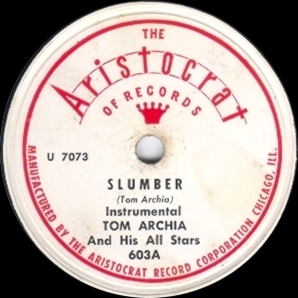
Aristocrat 603, 604, and 605 were 78-rpm singles released in May, August, and October 1948, respectively. "Jam for Sam" was obviously titled to get the attention of DJ Sam Evans, who put on "Jam for Sam" events for the next decade. Chess 1448 was a 78-rpm single released toward the end of 1950.
Careful listening to the October 1948 session reveals that Willie Jones was already characteristically spiky in his delivery and given to fast locked-hands patterns, while the pianist on this date has a heavier tread and favors thick chords. No reason to doubt that it is Bill Searcy, who was the regular pianist at the Macomba in Fall 1947.
The singer on the autobiographical "Downfall Blues" is Tom Archia himself. Previous discographies identified Andrew Tibbs as the singer, but Tibbs had, shall we say, a more refined vocal technique.
Chess CHV 414, Chicago's Boss Tenors, was an LP collection including work by Archia, Gene Ammons, Claude McLin, and Johnny Griffin; it was released in November 1971. The compilers of this collection knew virtually nothing about the Archia tracks they included: they gave 1948 as the recording date; they did not know the original Aristocrat releases; they attached new titles to "Slumber" and "Downfall Blues"; and they hedged about the identity of the vocalist on "Downfall Blues."
Aristocrat expected great things from Andrew Tibbs, and after the Musicians Union announced a recording ban for January 1, 1948, the label whisked him back into the studio before his first 78 had seen release. This time Tom Archia was the bandleader.
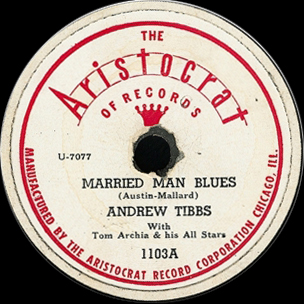
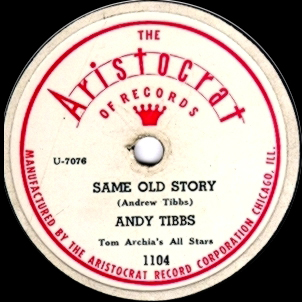
Andrew Tibbs (voc); Tom Archia (ts, ldr); poss. Johnny Morton (tp); Oett "Sax" Mallard (as, arr); Bill Searcy (p); Lowell Pointer (b); Robert "Hendu" Henderson (d).
Universal Recording, Chicago, October 1947
| U-7074 | I Feel like Crying* (Tibbs) | Aristocrat 1103B, Chess MCA 380-596 [CD], Classics 5028 [CD] | |
| U-7075 | Going Down Fast^ (Mallard) | Aristocrat 1104, Classics 5028 [CD] | |
| U-7076 | Same Old Story*^ (Tibbs) | Aristocrat 1104, Classics 5028 [CD] | |
| U-7077 | Married Man Blues (Austin-Mallard) | Aristocrat 1103A, Classics 5028 [CD] |
Ruppli omits personnel other than Tibbs (who sings on all 4 sides) and Archia; no previous discography mentioned either of the alto saxes or the trumpet. The solo alto spot on "Married Man Blues" is by Sax Mallard, who co-composed the tune. Mallard wrote "Going Down Fast" and obviously arranged the smooth ensemble, dominated by the alto sax and Archia's tenor, in the middle of "Going Down Fast." (Now that we have been able to listen to clean dubs of all four sides, we don't believe that a second altoist was present; it is Mallard's skill at scoring the ensembles and the big sound that he and Archia got from their instruments that creates the illusion of more saxes. What's more, Mallard seems to have written for the higher register of the tenor sax at times, creating the illusion of another alto, and Tom Archia unusually starts two of his solos on this session well up in his upper register.) There are no solos for the trumpet, but he does get to play muted behind the vocal on "Same Old Story." There are prominent piano intros on all four sides; these are definitely by the same pianist who participated in the previous session. At present Bill Searcy is the logical choice.
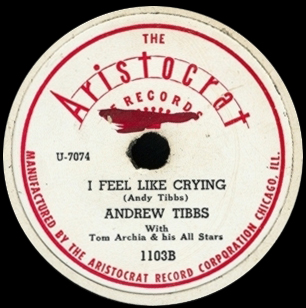
Aristocrat 1103 and 1104 were 78-rpm singles; they were released in June and October 1948. There are no side indications on Aristocrat 1104. Ruppli omits U7077 and incorrectly gives U7078 as the matrix for "Married Man Blues." Lord mentions Aristocrat 1103 but gives no matrix numbers or date; he omits Aristocrat 1104 entirely. Aristocrat 1103 was one of Aristocrat's best sellers in the early going (we are talking modest numbers here).
MCA 380-596 is a 15-CD extravaganza, released in 1999 and titled The Chess Story 1947-1975. It contains the first reissue of anything from this session in 52 years. The entire session is now available on Classics 5028, Andrew Tibbs 1947-1951 (released in February 2002). Unfortunately the discographical listings that Classics provides for this session are completely wrong.
At the beginning of November 1947, Tom Archia went on the road for two and a half months, with an eight-piece band led by Oran "Hot Lips" Page (Page had done a session in New York City on October 28 with a different band). The previous two sessions can be dated to October because obviously they were cut before Archia went on the road.
A photo in the collection of Charles Walton, which could have been taken around this time, shows Claude McLin at the club, with Clarence "Sleepy" Anderson (piano), LeRoy Jackson (bass), and Wesley Landers (drums). However, McLin had a steady gig at Ciro's Lounge with his regular band during this period. McLin was in a good position to sit in (Ciro's was also on 39th Street), but someone else must have been called on during Archia's absence. We also know from the minutes of the Local 208 Board meeting, November 20, 1947, that tenor saxophonist Tommy "Madman" Jones was leading the "relief night" band at the Macomba during this period (Jones also led a trio. He got in trouble for inviting Thomas Davie to jam with his band—Assistant William Dover walked in and caught them.)
After a month or so on the road, the Page band got the call to accompany vocalists for King Records in Cincinnati. They began with a four-tune session behind Mabel Smith.
Mabel Smith (1924-1972) was a great R&B singer whose career was too quickly ended by overeating and drugs. She was already a veteran performer when she sang on a side by Christine Chapman's band for Decca in 1944. She first recorded under her own name for King in early December 1947. She made 8 sides for the label all told. Six were released at the time; each of her singles paired one side from the first session with one from the second or third. They did not sell, and King dropped her. She reappeared on record in 1952, when OKeh began recording her as Big Maybelle, and enjoyed several hits for OKeh and Savoy from 1952 through 1956. After being dropped by Savoy, she enjoyed moderate success recording soul music for several labels between 1962 and 1967, but by the end of the decade had been forced to retire from performing because of poor health.
Mabel Smith [Big Maybelle] (voc); Oran "Hot Lips" Page (tp); Hal "Oklahoma" Singer -1 (ts); Tom Archia -2 (ts); Joe Knight (p); Lonnie Johnson (eg); Carl "Flat-Top" Wilson (b); Clarence "Bobby" Donaldson (d).
Cincinnati, November or early December, 1947
| K5286 | Indian Giver -1 (Jacobs-E. Blackman) | King 4227-A, Classics 5089 [CD] | |
| K5287 | Foolin' Blues -1 (unknown) | Classics 5089 [CD] | |
| K5288 | Little Miss Muffet* -2 (unknown) | King 4271, Classics 5089 [CD] | |
| K5289-1 | Bad Dream Blues -1 (Blackman) | King 4207, Classics 5089 [CD] |
King 4207, 4227, and 4271 were 78-rpm singles released at the time (see below for the couplings). Classics 5089, Big Maybelle 1944-1953, is a CD released in 2004. On it, "Little Miss Muffet" comes out "Little Miss Moffat."
The Page band's involvement in this session remained a secret for over 50 years, until the Classics reissue was put together. Previously some discographers placed the session in New York City in November, and claimed that Tiny Bradshaw's band was involved (Tom Lord's Jazz Discography, Volume 2, is in this tradition). Other sources, such as Blues Records L-Z by Leadbitter, Fancourt, and Pelletier, have given the date and location as Cincinnati in early December, listing the accompaniment as unknown. But Bradshaw had not begun his association with the King label yet, and as Dave Penny's liner notes for the Classics release point out, Lips Page's trumpet work is clearly audible on these sides. What's more, Penny was able to get confirmation from Hal Singer that the Page band was on the session, along with solo lineups for each track. The source of the confusion is probably the fact that the sides from this session were credited to "Mabel Smith" without any reference to the accompaniment. Penny also identified Lonnie Johnson by ear, and there isn't any question about his being there, though the credits to the Classics CD put a question mark next to his name.
As we will see was often done on the vocal accompaniments for King, Vincent Bair-Bey (alto sax) and Joe Britton (trombone) sat out this session. And only one tenor sax can be heard on each side.
The Page band was asked to return to the studio later that December, while King Records was frantically stockpiling material (around 100 sides) in advance of the recording ban.
During that same month, Aristocrat, which was doing its own frantic stockpiling, recorded Jimmy Bell's Trio. "Just about Easter Time," a blues sung by Jimmy Bell that appeared on Aristocrat 1901, is credited to Tom Archia on the label. The Aristocrat composer credits are pretty slapdash, but it would be interesting to find out whether Tom Archia got label credit to any songs written for other performers besides Jimmy Bell and Andrew Tibbs.
The Hot Lips Page Band that went into the King studios, for two marathon series of sessions in late December 1947 (K5322-5333 and K5374-5404; see the Appendix for additional material that we once thought came from another session with the Page band) has never gotten its due. Oran "Hot Lips" Page (1908 - 1954) had been leading his own jump bands for most of the previous decade. Although his trumpet playing on some of the King sides is excellent, his Armstrong-derived style was considered archaic by the record company (and Page gets little solo space on the Wynonie Harris sides, disappearing entirely from some). Too much of the band's output was left in the vaults by King (this incuded nearly everything that Lips recorded in his own name). Many other sides were issued in small quantities and never re-pressed (for instance, we have been able to hear just two Barbara Cameron sides with the band). Collectors have focused on the justly famous performances by Wynonie Harris. All that were released sold well (and "'Good Rockin' Tonight" was a monster hit). We may congratulate Wynonie for his good taste in spotlighting Tom Archia and encouraging Tom to battle with Hal Singer (not yet known as "Cornbread"; he would record his signature number for Savoy in June 1948). We wish that Tom had been given more emphasis elsewhere. Brilliant though they are, the Harris sides are atypical.
Left to its own devices, the Page band played a lot of tightly charted swingers like "Fat Stuff" and "Boodie, Boodie" (the last is a real curiosity—a bop number with a solo by a prominent Swing artist), but King wasn't interested in these and didn't bother to release any at the time. "Undecided" with Marion Abernathy also shows off this side of the Page band. What made the band valuable to King in its recording rush was the ability of several of its instrumentalists (Archia, Singer, and Page himself, as well as the rhythm section) to back blues vocals with minimal preparation. During the first Wynonie Harris session, Wynonie was actually making up the lyrics while the band was improvising a background. Even a more polished number like "Good Rockin' Tonight" was done after little premeditation.
At full strength, the band included an altoist who was a passionate Bird imitator (Vincent Bair-Bey, who makes the most of his few solo opportunities), an interestingly leathery trombonist (Joe Britton), Hot Lips himself (one of the greatest Swing trumpet players after Louis himself, and a good blues singer as well), and the well-contrasted tenor duo of Tom Archia and Hal Singer (Singer was out of Ben Webster, though he had begun to acquire the R&B honk and an occasional scream). The rhythm section of Joe Knight, Carl "Flat-Top" Wilson, and Bobby Donaldson was reliable and versatile. Joe Knight, born May 14, 1922, in Brooklyn, New York, was known as Earl Knight on some of his recordings, which included outings with Clyde Bernhardt, Earl Bostic (when John Coltrane was in the band), Lucky Thompson, and others. Bobby Donaldson would be an extremely active session drummer throughout the 1950s.
Five horns were too much for most of the non-charted numbers, however, and the recording director cut down the section for many of the blues accompaniments. Despite the listings in discographies, for instance, neither Bair-Bey nor Britton plays on any of the Big Maybelle sides, and the second tenor is barely audible on them.
Mabel Smith [Big Maybelle] (voc); Oran "Hot Lips" Page (tp); Hal "Oklahoma" Singer (ts); prob. Tom Archia (ts); Joe Knight (p); Lonnie Johnson (eg); Carl "Flat-Top" Wilson (b); Clarence "Bobby" Donaldson (d).
Cincinnati, December 23, 1947
| K5322 | Too Tight Mama (unknown) | King 4227-B, Blue Boar [Fr] CDBB 1010, Classics 5089 [CD] |
Our basic information is from Lord, who includes the entire band and leaves off the guitarist. King 4227 was a 78-rpm single, released in 1948. The singer was known strictly as Mabel Smith at the time.
Blue Boar CDBB 1010, Shoutin' the Blues, is a CD, distributed by Culture Press and released in February 1999, that collects 24 of the Hot Lips Page Band's December 1947 recordings for King. It is the first reissue (in some case, the first issue, period) of the bulk of this material. Thanks to Joseph Scott for alerting us to this important release. Classics 5089, Big Maybelle 1944-1953, is a CD released in 2004.
The solo lineup on "Too Tight Mama" goes: Singer intro; Page and Singer, obbligato; Singer. If Tom Archia is present, he's well off-mike. Meanwhile, Blue Boar notes an unidentified guitarist, not previously mentioned in the discographies, but one listen to this track and one look at the next matrix number give Lonnie Johnson away.

Lonnie Johnson (voc, eg); Oran "Hot Lips" Page (tp); Hal "Oklahoma" Singer (ts); Tom Archia (ts); Joe Knight (p); Carl "Flat-Top" Wilson (b); Clarence "Bobby" Donaldson (d).
Cincinnati, December 23, 1947
| K5323 | Friendless Blues (Johnson) | Federal 45-12376, Charly 266 [CD] |
Our basic information is derived from Lord. Federal 12376 is the original 45-rpm issue; there were no 78s by then. This was a long time after the date of recording; King opened the Federal subsidiary in December 1950 and 12376 was released around July 1960. The matrix number on the 45 is 54-F4700. Charly 266 is a CD compilation of Lonnie Johnson's King recordings, entitled Me and My Crazy Self, issued in 1990.
Contrary to what Lord says, the entire Page band was not present on this cut; the discography provided with the Charly release gets it right. The horn accompaniment to "Friendless Blues" is extremely discreet. After careful listening to the preceding Big Maybelle number, we reversed our judgment about the tenor saxophonist who plays throughout the piece and though prominent, restricts himself to a near-subtone: it appears to be Hal singer. The second tenor sax is off mike and little more than a ghostly presence; and a muted Page, even farther off mike, is barely audible in the last two bars of the piece.
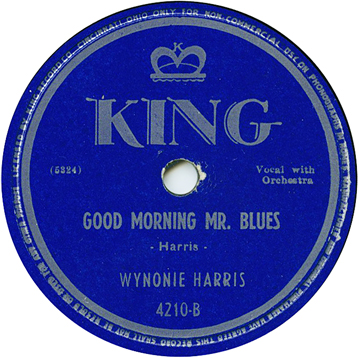
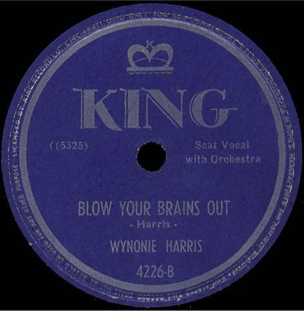
Wynonie Harris (voc); Oran "Hot Lips" Page (tp -1); Joe Britton (tb -1); Vincent Bair-Bey (as -1); Hal "Oklahoma" Singer (ts); Tom Archia (ts); Joe Knight (p); Carl "Flat-Top" Wilson (b); Clarence "Bobby" Donaldson (d).
Cincinnati, December 23, 1947
| K5324 tk. 1 | Good Morning Mr. Blues* (Harris) -1 | Ace CDTOP2 1124 | |
| K5324 tk. 2 | Good Morning Mr. Blues* (Harris) -1 | King 4210-B, Gusto GD-5040-X(2), Blue Boar [Fr] CDBB 1010, Classics 1139 [CD], Ace CDTOP2 1124 | |
| K5325 | Blow Your Brains Out* (Harris) | King 4226-B, Charly CRB 1097, Charly 244 [CD], Blue Boar [Fr] CDBB 1010, Classics 1139 [CD], Ace CDTOP2 1124 | |
| K5326 | Blowin' to California* (Harris) -1 | King 4252-B, Gusto GD-5040-X(2), Route 66 KIX 3, Blue Boar [Fr] CDBB 1010, Classics 1139 [CD], Ace CDTOP2 1124 | |
| K5327 | Comes Love [Crazy Love^] (Harris) -1 | Polydor LP 623 273^, Blue Boar [Fr] CDBB 1010^, Classics 1139^ [CD], Ace CDTOP2 1124 | |
| K5328 tk 1 | From Bad to Good Blues (Harris) -1 | Blue Boar [Fr] CDBB 1010, Classics 1139 [CD], Ace CDTOP2 1124 | |
| K5328 tk 2 | From Bad to Good Blues (Harris) -1 | unissued | |
| K5329 tk. 1 | Love Is Crazy (Crazy Love)* -1 (Harris) | Ace CDTOP2 1124 | |
| K5329 tk. 2 | Love Is Crazy (Crazy Love)* -1 (Harris) | Ace CDTOP2 1124 | |
| K5329 tk. 2 | Love Is Crazy (Crazy Love)* -1 (Harris) | Ace CDTOP2 1124 | |
| K5330 | Bite Again, Bite Again* (Harris) | King 4252-A, Route 66 KIX 3, Classics 1139 [CD], Ace CDTOP2 1124 | |
| K5331 tk. 1 | Don't You Want to Rock?* (Harris) | Ace CDTOP2 1124 | |
| K5331 tk. 2 | Don't You Want to Rock?* (Harris) | Ace CDTOP2 1124 |
Now we're getting to the choice stuff. And for the first time the full band is heard on some of the cuts. Our basic session and release information comes from Tony Collins' exemplary biography and discography, Rock Mr. Blues: The Life & Music of Wynonie Harris (Milford, NH: Big Nickel, 1995). Full information on the session comes, for the first time, in the liner notes to Wynonie Harris: King & Deluxe Acetates, a 2015 release.
King 4210, 4226, and 4252 were 78-rpm singles released at the time. Polydor 623 273 was a collection LP titled Kings of Rhythm & Blues, released in England in 1968.
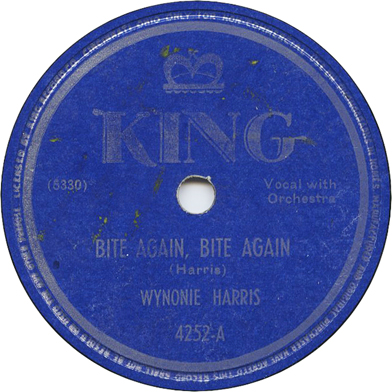
Gusto GD-5040-X(2) was a 2-LP set released in 1976 and titled Good Rockin' Blues. Charly CRB 1097 was an LP called Rock Mr. Blues, released in 1985. Charly 244 was a CD titled Good Rockin' Tonight, released in 1990. Route 66 KIX 3 was an LP released in Sweden in 1977 under the title Mr. Blues Is Coming to Town; it was reissued in 1991 as Route 66 RBD 3 [CD]. Blue Boar CDBB 1010, Shoutin' the Blues, is a French CD, distributed by Culture Press and released in February 1999, that collects 24 of the Hot Lips Page Band's December 1947 recordings for King. Classics 1139 is a French CD, released in September 2000 under the title Wynonie Harris 1947-1949. Ace CDTOP2 1124, Wynonie Harris: King & Deluxe Acetates, is a 2-CD set released in June 2015; it draws on nearly all of the surving acetates that Harris made for King from 1947 through 1950.
Feature credits:
Collins wrongly puts just one tenor sax on "Bite Again." We've referred to Singer as "Oklahoma" because he wasn't "Cornbread" yet, and Wynonie calls him "Oklahoma" on "Blow Your Brains Out." He would also shout "Rock, Oklahoma, rock!" on the master take of "Good Rockin' Tonight."
Despite the amount of jamming on these sides, extending to improvised lyrics and an occasional hasty ending, every one of them could have been released at the time. The K5329 "Love Is Crazy" invoked Santa Claus, which meant the release window wouldn't open till October 1948. But "Good Rockin'" had such a long ride on the charts, then Wynonie's first session after the end of the recording ban, in December 1948 produced more hits. In the end Syd Nathan probably forgot the side. Tony Rounce hypothesizes that Nathan passed on "Don't You Want to Rock?" because of some recording distortion on one Lips' solos, but it's unlikely Nathan cared; again, Harris just kept cutting hits.
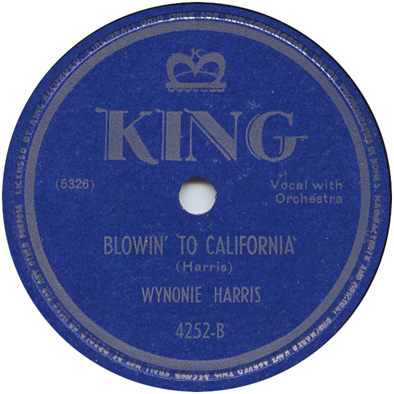
Oran "Hot Lips" Page (tp, prob. voc); Joe Britton (tb); Vincent Bair-Bey (as); Hal "Oklahoma" Singer (ts); Tom Archia (ts); Joe Knight (p); Carl "Flat-Top" Wilson (b); Clarence "Bobby" Donaldson (d).
Cincinnati, December 23, 1947
| K5332 | Fat Stuff | King (unissued) | |
| K5333 | unidentified title | King (unissued) |
Basic information from Michel Ruppli, The King Labels, Volume 1. Ruppli gives no date, and says only, "possibly same band as above [K5324-K5331]."
We can improve on that "possibly." These numbers are from the end of the Wynonie Harris session.
Blue Boar CDBB 1010, Shoutin' the Blues, is a CD, released in February 1999, that collects 24 of the Hot Lips Page Band's December 1947 recordings for King. No matrix numbers are given, but the version of "Fat Stuff" on that CD appears to be the remake, K5398, from the session (see Arch21 below) that the Page band did after they were finished accompanying all the vocalists.
According to Tony Rounce, in his 2015 liner notes to Wynonie Harris: King & Deluxe Acetates, acetates of K5332 and K5333 have indeed been recovered and will be included in a future Ace release. Eagerly awaited.
A single side by Lonnie Johnson, "Jelly Roll Baker," has matrix K5374 and was recorded with the Hot Lips Page Orchestra. It was originally issued on King 4388-AA and has subsequently appeared on King LP520, King KS1083, Parlophone GEP8693, Gusto GD5039-X [2 LPs] and other sources. A check of the Gusto reissue reveals just Lonnie and rhythm section—no horns. So here's the lineup: Lonnie Johnson (voc, eg); Joe Knight (p); Carl "Flat-Top" Wilson (b); Clarence "Bobby" Donaldson (d). "Jelly Roll Baker" is also a clue to the makeup of the band on the three Big Maybelle numbers that followed.
Mabel Smith [Big Maybelle] (voc); Oran "Hot Lips" Page (tp); Hal "Oklahoma" Singer (ts); Tom Archia (ts); Lonnie Johnson (eg); Joe Knight (p); Carl "Flat-Top" Wilson (b); Clarence "Bobby" Donaldson (d).
Cincinnati, prob. December 28, 1947
| K5375-3 | Sad and Disappointed Jill* (L. Blackman-E. Blackman) | King 4207-A, Blue Boar [Fr] CDBB 1010, Classics 5089 [CD] | |
| K5376 | Don't Try to Fool Me (L. Blackman-E. Blackman) | King 4271, Blue Boar [Fr] CDBB 1010, Classics 5089 [CD] | |
| K5377 | Dirty Deal Blues (L. Blackman) | Blue Boar [Fr] CDBB 1010, Classics 5089 [CD] |
Our basic information comes from Tom Lord's Jazz Discography Volume 2. Lord incorrectly includes Vincent Bair-Bey and Joe Britton on these sides, and leaves out Lonnie Johnson (who had obviously hung around after K5374).
King 4207 and 4271 were 78-rpm singles released in 1948 and 1949. The other side of 4207 was from a different session not involving the Page bnad. It's hard to believe, but this material was never reissued (never issued at all, in the case of "Dirty Deal Blues") until Blue Boar CDBB 1010, Shoutin' the Blues, a French CD, released in February 1999, that collects 24 of the Hot Lips Page Band's December 1947 recordings for King. "Dirty Deal" may have been held back because Big Maybelle drifts off-mike at one point and her vocal is subject to microphone distortion in some other places. Classics 5089, Big Maybelle 1944-1953, was a CD released in 2004. On it, "Sad and Disappointed Jill" comes out as "Sad and Disappointed Girl."
On Mabyelle's first session for King, just one tenor saxophonist appeared on each track. Here just one is featured on each track, but a second tenor can be heard at times, well off-mike. Here is our best guess as to the soloists:
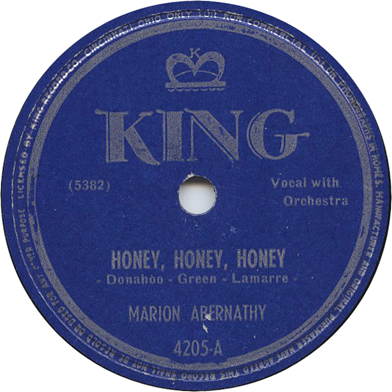
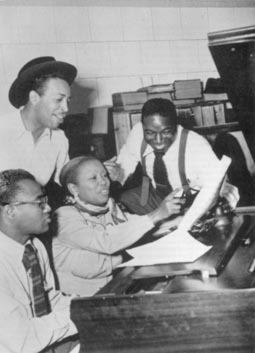
Marion "Blues Woman" Abernathy (voc); Oran "Hot Lips" Page (tp); Vincent Bair-Bey (as -2); Joe Britton (tb -3); Hal "Oklahoma" Singer (ts); Tom Archia (ts); Joe Knight (p); Carl "Flat-Top" Wilson (b); Clarence "Bobby" Donaldson (d).
Cincinnati, prob. December 28, 1947
| K5378 | My Man Boogie (Jenkins) -3 | Federal 12028, Chicago LP 213, Blue Boar [Fr] CDBB 1010, Classics 5001 [CD] | |
| K5379 | Brotherly Love (Moore) -3 | King 4219-B, Blue Boar [Fr] CDBB 1010, Classics 5001 [CD] | |
| K5380 | Nobody Wants You (Scherman) -2, 3 | King 4273, Blue Boar [Fr] CDBB 1010, Classics 5001 [CD] | |
| K5381 | Hey Little Boy* (Page) -2, 3 | King 4273, Blue Boar [Fr] CDBB 1010, Classics 5001 [CD] | |
| K5382-1 | Honey, Honey, Honey* (Donahoo-Greene-Lamarre) -2, 3 | King 4205-A, Classics 5001 [CD] | |
| K5383 | Little John Blues (Page) -2, 3 | King 4253, Blue Boar [Fr] CDBB 1010, Classics 5001 [CD] | |
| K5384 | What Is the Matter with Me* (Scherman) -2, 3 | Blue Boar [Fr] CDBB 1010, Classics 5001 [CD] | |
| K5385-1 | Undecided* (Robin-Shavers) -2 | King 4205-B, King 4490-AA, Sing [Dan] LP 1159, Classics 5001 [CD] |
Marion Abernathy was often billed as "The Blues Woman." She first recorded in 1945 for the Los Angeles-based labels Juke Box, Bel-Tone, and Melodisc (two sessions). In August 1947 she cut her first session for King, in New York with Paul Bascomb's band. Our information about the present session is from Ruppli's book The King Label. Ruppli says that Bair-Bey doubled on baritone sax, but the big horn cannot be heard on any of these tracks. Joe Britton (trombone) was on this session, but is not present on K5378 or K5385-1.
King 4205, 4219, 4253, and 4273 were 78-rpm singles released in 1948 and 1949. King 4490 was a single released in 1951 (listed in Billboard on November 3, 1951; reviewed in the same issue, p. 43); its A side is from a different session not involving the Page band. Federal 12028 was a 78-rpm single (possibly also on 45 rpm) from 1951. Chicago LP 213 is an untitled collectors' LP in a plain white sleeve. Sing LP 1159 was a Danish release titled Rare Blues Girls from King. Thanks to Daniel Gugolz for reissue information and dubs of these two tracks. Thanks to Bob Porter for information about King 4205 and 4253. Blue Boar CDBB 1010, Shoutin' the Blues, is a CD, released in February 1999, that collects 24 of the Hot Lips Page Band's December 1947 recordings for King. Classics Blues and Rhythm 5001 is a CD issued in March 2001 under the title Marion Abernathy 1947-1949; it is the first comprehensive reissue of Marion Abernathy's King recordings.
Ruppli claims December 23 (and the Classic release repeats this) but surely the date was later. (Lord actually has some of the tracks from this and the following Abernathy session dated 1946, and incorrectly gives the title of K5380 as "Nobody Knows You when You're Down and Out."
Hot Lips Page is the featured soloist on "My Man Boogie" and "Undecided." (He needed the space after the Wynonie Harris sides!) On "Honey, Honey, Honey," Lips backs the vocal and on "Little John Blues" he does the same, this time with band accompaniment.
On "Hey Little Boy," set at a blistering tempo, Tom does a 12 bar solo before the vocal; the hoarse tenor solo on the rideout is Singer's. Archia gets an 8 bar intro on "Honey, Honey, Honey"; there are no other solos on this number. Tom is given 2 relaxed choruses on the mellow "What Is the Matter with Me?" and 8 bars on "Undecided." Archia and Singer contribute strongly to various background riffs, and participate in a tricky bop introduction to "Undecided."
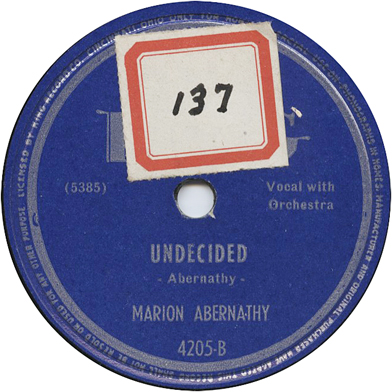
A full-page photo of Joe Knight, Marion Abernathy, Wynonie Harris, and Hot Lips Page in the King Studios is reproduced in Tony Collins, Rock Mr. Blues: The Life & Music of Wynonie Harris (Milford, NH: Big Nickel, 1995), p. 72.
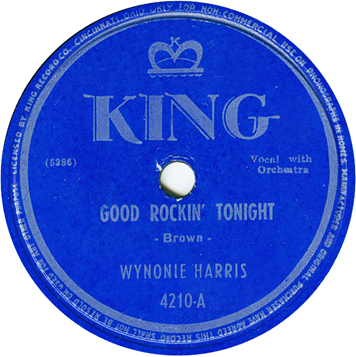
Wynonie Harris (voc); Oran "Hot Lips" Page (tp -1); Vincent Bair-Bey (as -1); Hal "Oklahoma" Singer (ts-1, 2); Tom Archia (ts -1, 2, 3); Joe Knight (p); Carl "Flat-Top" Wilson (b); Clarence "Bobby" Donaldson (d).
Cincinnati, December 28, 1947
| K5386 tk. 1 [inc] | Good Rockin' Tonight* (Roy Brown) -1 | Ace CDTOP2 1124 | |
| K5386 tk. 2 | Good Rockin' Tonight* (Roy Brown) -1 | Ace CDTOP2 1124 | |
| K5386 tk. 3 [inc] | Good Rockin' Tonight* (Roy Brown) -1 | unissued | |
| K5386 tk. 4 | Good Rockin' Tonight* (Roy Brown) -1 | King 4210-A, Vogue [Fr] V.3112, King 536, King 260, King 607, Vogue [Fr] LD082, King 725, King 1004, King 1026, Polydor [Br] 184.163, King KS 1086, Polydor [Br] 623273, Polydor [Fr] 2310110, New World 261, King 16004, Gusto GD-5040-X(2), RCA PL85463, Sing [Dan] 607, Charly CRB 1097, Charly CD 37, Charly 244 [CD], Charly CD PRO2, Rhino R2 71125 [CD], Rhino R2 71544 [CD], Hoy Hoy 40-S-01, Hoy Hoy 4050 [CD], Blue Boar [Fr] CDBB 1010, Classics 1139 [CD], Ace CDTOP2 1124 | |
| K5387 | Lollipop Mama* (B. Brown) -2 | King 4226-A, Vogue [Fr] V2127, Route 66 KIX 2, Charly 244 [CD], Blue Boar [Fr] CDBB 1010, Classics 1139 [CD], Ace CDTOP2 1124 | |
| K5388 tk. 1 | I Believe I'll Fall in Love* (Harris) -3 | Ace CDTOP2 1124 | |
| K5388 tk. 2 | I Believe I'll Fall in Love* (Harris) -3 | King 4445-AA, King 4461, Blue Boar [Fr] CDBB 1010, Classics 1139 [CD], Ace CDTOP2 1124 |
Although "Good Rockin'" required four takes (take 3, which broke down after Harris sang, "Tonight I'll know she's a mighty man," remains unissued), the reason only 3 songs were attempted with Wynonie Harris is that the band had already cut 8 sides (not counting any alternate takes that might survive)… and had another 16 to go (again, not counting any alternate takes!).
Our basic session information is from Tony Collins. Collins incorrectly states, however, that the band was cut down to Page, Singer, and the rhythm section for this session. Not really. Collins is also the source for nearly all of our release information. There have been more reissues of the master take of "Good Rockin' Tonight" (a celebrated number that stayed in the Billboard "Race" chart for 25 weeks, starting on May 1, 1948) than of the rest of Tom Archia's output combined. We're sure we've missed some.
For the alternate takes, we have relied on their very first issue after 67 years, Wynonie Harris: King & Deluxe Acetates (Ace CDTOP2 1124), from 2015. The master take is billed as uncut but this just means that the sound is better because it's right off the acetate. King 4210 is uncut: the fade was done in the studio, not produced through editing. Take 2 gives us more of Archia's conclusion because it wasn't faded.
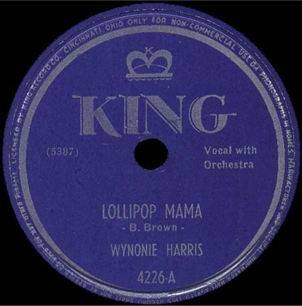
"Good Rockin' Tonight" was Harris's biggest hit; it lasted 6 months on the R&B charts, and it has been reissued countless times. Oddly, the very first reissue, on a French Vogue 78, has passed unnoticed for years, but we are now able to add V.3112. On it, the title is "Good Rocking Tonight." For details on nearly all of the other reissue packages, see Collins' book. "Lollipop Mama," though it reached number 8 on the Billboard charts as Wynonie's followup release, has been reissued sparingly. "I Believe I'll Fall in Love" was held back until May 1951, by which time Wynonie's King 4448 was already out (King 4445 was listed in Billboard for May 19, 1951, p. 33, and reviewed in Cash Box on May 12, p. 13). King 4445 got minimal promotion from the company—it was skipped over the King/Federal trade paper ads—and maybe that's why "Believe I'll" has appeared on CD just three times. Vogue V2127 was a French 45-rpm single, released in the 1950s. Polydor 623 273 was a collection LP titled Kings of Rhythm & Blues, released in England in 1968. Route 66 KIX 2 was a Swedish Wynonie Harris LP titled Playful Baby. Rhino R2 71544 was a CD issued in 1994 under the title Bloodshot Eyes: The Best of Wynonie Harris. Blue Boar / Culture Press CDBB 1010, Shoutin' the Blues, is a CD, released in February 1999, that collects 24 of the Hot Lips Page Band's December 1947 recordings for King. Classics 1139 is a French CD release from September 2000, titled Wynonie Harris 1947-1949. (Unfortunately the Classics liner notes didn't even mention that Tom Archia was on this session.)
Marion Abernathy (voc); Oran "Hot Lips" Page (voc -2, tp except -2); Joe Britton (tb except -1); Vincent Bair-Bey (as); Hal "Oklahoma" Singer (ts); Tom Archia (ts); Joe Knight (p); Carl "Flat-Top" Wilson (b); Clarence "Bobby" Donaldson (d).
Cincinnati, December 28, 1947
| K5389 | Wee Baby (Turner) | Federal 12028, Chicago LP 213, Blue Boar [Fr] CDBB 1010, Classics 5001 [CD] | |
| K5390 | Bessie's Sin* (Scherman) [MA, ens voc] -1 | King 4219-A, Classics 5001 [CD] | |
| K5391 | I Can't Stand It (Abernathy) -1, 2 | King 4253, Classics 5001 [CD] | |
| K5392 | It's a Low Down Dirty Shame* (Wilson) -1 | Blue Boar [Fr] CDBB 1010, Classics 5001 [CD] |
Our session information is drawn from Ruppli. Ruppli says December 23, but the later matrix numbers indicate December 28 (assuming, of course, that it wasn't 11 pm on December 31!). Lord incorrectly gives the title of K5391 as "I Can't Get Started." King 4219 and 4253, as well as Federal 12028, were 78-rpm singles released at the time.
Chicago LP 213 was an untitled collectors' LP with plain white sleeves. Thanks to Daniel Gugolz for alerting us to this reissue and providing a dub. Thanks to Bob Porter for information about King 4253. Federal 12028 was issued early on for the Federal subsidiary, probably in 1951. Blue Boar / Culture Press CDBB 1010, Shoutin' the Blues, is a CD, released in February 1999, that collects 24 of the Hot Lips Page Band's December 1947 recordings for King. Classics Blues and Rhythm 5001 is a CD issued in March 2001 under the title Marion Abernathy 1947-1949. The sound on "I Can't Stand It" and "Bessie's Sin" is rather poor because well-worn 78s were the only available source. It is also the first Marion Abernathy collection ever undertaken. (Again, there is no trace of baritone sax on these sides; Bair-Bey is heard on alto only.) Note that the first riff on "Dirty Shame" is lifted from Bird and Diz! Tom Archia is featured on "Bessie's Sin" and "It's a Low Down Dirty Shame."
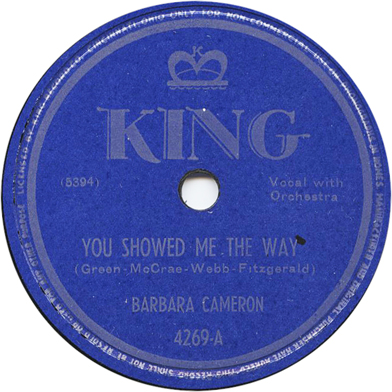
Barbara Cameron (probably born in 1925) was from Dayton, Ohio. When her records were made she was working as a staff vocalist on WLW in Cincinnati. When WLW employees were first allowed to record with King, she made a limited edition 4-pocket album, similar in concept to "Lonesome Gal"''s slightly later compilation. Neither the release numbers on the the individual 78s (36801 through 36804) nor the matrix numbers (in a 2500 series) were typical for King; we figure the records were cut at the station. Sure enough, Billboard announced that "Barbara Cameron thrush heard on Moon River, WLW, Cincinnati, has made her first album on King records" (September 20, 1947, p. 121). The item ran in "American Folk Tunes" because so much country music was being broadcast over WLW. King K-4 was released as a four-pocket album in 1947; the 78s were reissued singly in 1948. Within two or three months of cutting the album, Barbara Cameron made some records that were released in the Queen/King 4000 series with standard matrix numbers. We have still not heard King 4203 and 4209. But having heard King 4269 and 4281, we can place one of her late-1947 sessions with the Hot Lips Page Band.
Barbara Cameron also hosted a local TV show on WCKR in the early 1950s. After she got married, she and her husband moved to New York City, and even after returning to Cincinnati she only sang on occasion. (She did write a new theme song for Road Runner cartoons.) Barbara Cameron died in Fort Myers, Florida, on January 6, 2013. Her son Doug is a professional violinist and her daugther Cam is a professional cellist.
Barbara Cameron (voc); Hot Lips Page Band with Oran "Hot Lips" Page (tp); Vincent Bair-Bey (as except -1?); Hal "Oklahoma" Singer (cl-1?; ts); Tom Archia (cl-1?; ts); Joe Knight (p); Carl "Flat-Top" Wilson (b); Clarence "Bobby" Donaldson (d)
Cincinnati, December 28, 1947
| K5393 | Call Me Darling | King (unissued) | |
| K5394 | You Showed Me the Way (Green-McCrae-Webb-Fitzgerald) -1 | King 4269-A | |
| K5395 | Flattery Will Get You Knowhere (Kuhn-Terry) | King 4281-B | |
| K5396 | Let's Pretend | King 4209 |
Our basic information comes from Michel Ruppli, The King Labels, Volume 1. Ruppli does not specify the accompaniment, but the location of this session in the K5300 series makes Page Band involvement very likely. The King 78s (none ever reissued) are very rare. However, we have a copy of King 4269 in Robert Campbell's collection, and we have been able to hear a copy of King 4281 in the collection of Tom Kelly; this side is identified as "Vocal with Orchestra." The other sides of 4269 and 4281 are from a session (K5354 to 5361; the see Appendix) on which the singer was accompanied by organ and guitar; none of the other sides from it were ever released. The other side of King 4209 (not that we've heard either side), along with both sides of King 4203, were from a Barbara Cameron session (K5370 to K5373) that might have involved the Page band, but we have yet to hear any of it (again, see Appendix).
The matrix number of "Flattery Will Get You Knowhere" (that's how it's rendered on the label) is 5395 without the K prefix. On this hip-chick Swing number, Barbara Cameron is backed mostly by Joe Knight and the rhythm section; there is no room on the record for instrumental solos. Four horns are heard briefly at the beginnning and end of the song only. On the ballad "You Showed Me the Way," which tries to evoke the sounds of Goodman and Shaw, two of the three saxophonists switch to clarinet and Page is muted.
The rest of this session needs checking, although given the spotlight on the vocalist, we don't expect Tom Archia solos here. There is no sign of Joe Britton's trombone on "Flattery" or "You Showed" but, of course, he may have participated on other sides.
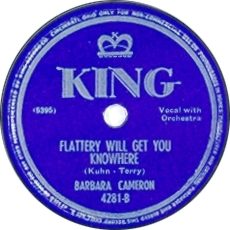
This Page band (somehow, not completely worn out) cut some more titles on its own for King... These are valuable, not only because of Lips' contributions, but also because they show us the band playing its own arrangements.
Oran "Hot Lips" Page (tp, voc); Joe Britton (tb); Vincent Bair-Bey (as); Hal "Oklahoma" Singer (ts); Tom Archia (ts); Joe Knight (p); Carl "Flat-Top" Wilson (b); Clarence "Bobby" Donaldson (d).
Cincinnati, December 28, 1947
| K5397 | Your Shirt Tail's Out (Gluck-Page) [HLP, ens voc] | Blue Boar [Fr] CDBB 1010 | |
| K5398 | Fat Stuff* (Coleman-Page) | Blue Boar [Fr] CDBB 1010 | |
| K5399 | Ashes on My Pillow* (Page) [HLP voc] | Blue Boar [Fr] CDBB 1010 | |
| K5400 | Boodie, Boodie* (unknown) | Blue Boar [Fr] CDBB 1010 | |
| K5401 | untitled | unissued | |
| K5402 | Pagan Love Song | unissued | |
| K5403 | How Deep Is the Ocean? | unissued | |
| K5404 | Blue Moon | King LP745 |
Our session information comes from Lord, who lists only Page and "unknown accompaniment." But obviously this was the same Page band that made all of the preceding sessions for King. Page did not record again till March 15, 1949 (for Columbia, in New York City; by that time only Bair-Bey was still around from this lineup).
Until 1999, only one side had ever been issued (on a King LP from 1961); "Blue Moon" has still not been checked for Tom Archia's contributions. King LP745 is insanely rare; at least we finally know the title and the correct number. It was a compilation titled Solo Spotlights, and included sides by Lynn Hope, Doc Bagby, Lucky Millinder, King Porter, Sonny Thompson, Johnny Pate, and most likely others. Discographies of Hot Lips Page previously transposed the numbers so they pointed to a nonexistent LP 475. Blue Boar CDBB 1010, Shoutin' the Blues, was a CD, released in February 1999, that collects 24 of the Hot Lips Page Band's December 1947 recordings for King, and released 4 from this session for this first time. It appears that the "Fat Stuff" on the Blue Boar CD is K5398, not the previous attempt (K5332—see above). At least, it is placed after "Your Shirt Tail's Out," and the other items on the CD are presented in order by artist and matrix number.
Tom Archia presumably made his way back to Chicago in early January of 1948. His next appearance on record was part of a series of staged "sax battles" on Sunday afternoons at the Pershing Ballroom in Chicago. Six tracks recorded live by DJ Al Benson eventually made their way to release on Aristocrat, but only after their origins were heavily disguised.
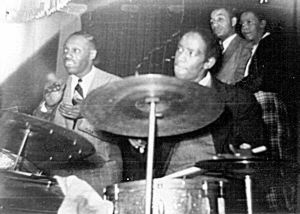


Gail Brockman (tp -2, 3, 4); unidentified (tp -3); unidentified (tb -3); Andrew "Goon" Gardner or John "Flaps" Dungee (as -2, 3); Gene Ammons (ts -1, 2, 3); Tom Archia (ts); poss. Claude McLin (ts -1, 2); poss. Julian "Junior" Mance (p); prob. George Freeman (eg -1, 2); unidentified (b); Ike Day (d); Dr. Jo Jo Adams (voc -4).
Pershing Ballroom, Chicago, early 1948
| U7048S | Hey Tom Archia* (no composer listed) -1 | Aristocrat 604A, Classics 5006 [CD] | |
| U-7139 | McKie's Jam for Boppers* (Archia) -2 | Aristocrat 605, Classics 5006 [CD] | |
| U-7172 | Come Back to Sorrento^ (DeCurtis) -3 | Aristocrat 3301A, Classics 5006 [CD] | |
| U-7173 | Bronzeville Swing^ ("S. Van") -3 | Aristocrat 3301B, Classics 5006 [CD] | |
| U-7128A | Cabbage Head Part I* [JJA voc] | Aristocrat 803A, Classics 5006 [CD] | |
| U-7128B | Cabbage Head Part II* [JJA voc] | Aristocrat 803B, Classics 5006 [CD] |
We're talking obscurities here. It took 50 years for two of these sides to be recognized as Gene Ammons recordings; they were purposely misattributed to "Skeetz Van and His Orchestra" on release. A third includes a solo by Tom Archia, and was given a matrix number implying that it came from a studio session by Tom Archia's All Stars. A fourth was attributed to the Tom Archia All Stars and was given a matrix number suggesting that it came from the Andrew Tibbs/Dave Young session. This, too, has been recognized as including Gene Ammons—now that it's been around for 52 years! All six sides were reissued for the first time on Tom Archia 1947-48, a CD released in February 2001 (Classics 5006). The fifth and sixth were identified until even more recently as coming from a studio session in July 1948 instead of this live event.
Charles Walton identified Gene Ammons as the only soloist on the "Skeetz" sides; two trumpets, a trombone, and another tenor sax can be heard at the end of "Sorrento," and riffing on "Bronzeville."
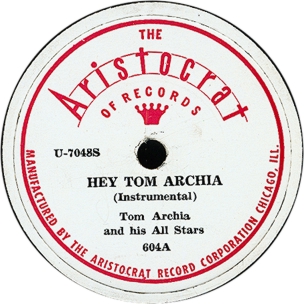
"Hey Tom Archia" includes a prominent guitarist (nearly in the front line, in fact), and there is a third tenor saxophone in the ensemble, though the saxes are sometimes well off-mike when not soloing. The piece is a derivative of "Flying Home" (which may explain the lack of composer credits on the label of Aristocrat 604) and of Illinois Jacquet's famous 1942 solo with Lionel Hampton. The structure is as follows: vamp; Archia (1 chorus); Ammons (1 chorus); Archia (1 chorus); Ammons (1 chorus; someone shouts "Jughead!" during this one); Archia and riffs (1 chorus); Ammons and riffs (1 chorus). During the final chorus, three tenor saxes are clearly audible. It's worth noting that Aristocrat 604 was issued in August 1948.
"McKie's Jam for Boppers" opens with a trumpet solo (which Campbell and Porter both suggest is Gail Brockman). Gail Brockman was billed as a "be-bop sensation" for a June 1946 appearance with the Dukes of Swing at the Club DeLisa. The trumpet solo is followed by an alto sax solo: Porter suggests Goon Gardner or Flaps Dungee, both Chicago altoists under the spell of Charlie Parker. (Porter further points out that Gene Ammons identified Dungee as the altoist on his Mercury recording, "Dues in the Blues"). The alto solo is followed by a piano solo (which Porter thinks may be Junior Mance), and finally a long solo by Tom Archia (Porter says the tenor is not Archia but both the tone and the licks are unmistakable). At least two tenor saxes can be heard riffing behind the trumpet solo. Porter also suggests that George Freeman could be the guitarist (all the more likely, on the evidence of "Hey Tom Archia").
Until recently we listed the Jo Jo Adams sides (which feature a reduced lineup of trumpet, one tenor sax, piano, bass, and drums) as products of a studio session, which we dated to roughly July 1948 (just before U7127-7130 by The Nighthawks, a sesssion that we believe took place in July or August—it was mastered November 10, which is the date that ended up going into the master book). However, close listening to the original 78 convinces us that it is not a studio recording. Jo Jo Adams is too close to the microphone (his p's pop audibly), the band is too recessed, and the ambience suggests a medium-sized hall, not the confines of Universal Recording. U7128A and 7128B, then, were two more bogus matrix numbers to keep inquisitive representatives of the Musicians Union off the trail.
Ruppli lists both sides of "Cabbage Head" (a single number split into two 78-rpm sides) and mentions JoJo Adams as the vocalist, but incorrectly lumps this session with the very first one under Archia's name. Ruppli gives no matrix numbers; these were taken from copies of Aristocrat 803 in the collections of Len Bukowski, Tom Kelly, and Robert Campbell. The trumpet player (who has a prominent muted accompaniment in Part 1) is not mentioned at all in previous discographies; he sounds like Gail Brockman.
"Cabbage Head" is not a blues, but an updated medieval English folksong about a fellow who keeps returning home very drunk to find increasingly convincing signs of another man in the house. Aleck Miller (aka Sonny Boy Williamson #2) later rendered the same piece as "Wake Up Baby." Jo Jo Adams provides a substantially more risqué treatment of the lyrics (as Sonny Boy #2 may well have when Leonard Chess wasn't encouraging him to tone it down).
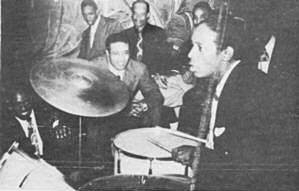
We are being rather daring, doubling the number of entries in his discography (from one to two!), but it appears to us that all six sides include legendary Chicago drummer Isaac Day, Jr. (c. 1927 - c. 1954). The only session on which Ike Day had been positively identified as the drummer was the Gene Ammons/Christine Chatman outing for Aristocrat, on February 28, 1949 (this produced Aristocrat AR-711 and 8001; Day is named on the label of AR-711). A comparison of Ike's playing on "Stuffy" and "Hey, Hey Mr. Freddy" from Aristocrat AR-711 and 8001 with the drumming on "McKie's Jam for Boppers" suggests that he is the drummer here as well. On "Hey Tom Archia" the drums are harder to hear, but the bass drum work is consistent with Day. There are more Ike Day trademarks on both of the Skeetz sides. Note the motoring-off that the drummer habitually does at the end of each piece, the explosive accents involving the snare drum, and the polyrhythmic tendencies on the bass drum and the tom-toms. The drumming on the Jo Jo Adams sides is more discreet, but some of these traits are still present.
According to Charles Walton, the story behind the "Skeetz Van" sides is as follows. DJ McKie Fitzhugh sponsored a series of Sunday afternoon dances at the Pershing Ballroom. These inevitably included tenor saxophone battles (Claude McLin was often featured at the Fitzhugh events, and actually garnered the most newspaper publicity out of them). Some of these events were broadcast locally in Chicago. At some point during the first half of 1948, DJ Al Benson recorded at least one of the events, at which Gene Ammons got prominent billing. The recording was strictly illegal because the Musicians Union's recording ban was still on. Moreover, Gene Ammons was under contract to Mercury, and would be through the end of 1949. So when Al Benson (cited on the "Bronzeville Swing" label in the phrase: "Dedicated to the 1949 Mayor of Bronzeville") purveyed the material to Aristocrat, devious measures were taken.
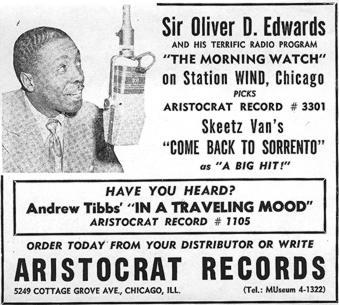
Two numbers with solos by Tom Archia were put out under Archia's name and given phony matrix numbers adjacent to the Andrew Tibbs session of September 1947 (U7148S) and Archia's October 1948 studio session (U7139). Two sides (U7128A and U7128B) with vocals by blues shouter Jo Jo Adams and Tom Archia as the only tenor soloist were packaged as though they came from an Archia studio session. The two sides where Gene Ammons was the only soloist were attributed to Al Benson's go-fer, a streetwise non-musician named Skeets Van Orn. (Aristocrat AR-711, from the first studio session for the label led by Gene Ammons on February 28, 1949, was attributed to the "Three O'Clock Jam Session," though the musicians' names did appear on the label. The matrix numbers for that session, by the way, were U7174-U7181; the "Skeets" sides are U7172 and U7173.) The matrix numbers for the four sides are out of sequence because they were meant to be misleading.
Loud applause from a large audience can be heard at the end of both Skeetz sides. This may have been overdubbed, as Bob Porter points out was often done on recordings at the time.... No applause is heard on "McKie's," but the ambience is similar and the ending is cut off awkwardly, as if to excise applause or an announcement. "Hey Tom Archia" also sounds like a live session, and so do the two parts of "Cabbage Head." Interestingly, Porter hears a tape splice in the middle of "McKie's," which would be unusual for an early 1948 recording that was issued before the end of that year. Tape machines were still rare; Aristocrat's studio sessions were not being taped in 1948.
Aristocrat 604, as we have noted, was a 78-rpm single that came out in August 1948. So did Aristocrat 803, which was reviewed in Billboard on September 4, 1948. Aristocrat 605 was a 78-rpm single released in October 1948. Aristocrat 3301 appeared in February 1949 (Gene Ammons' first studio release for Aristocrat, still semi-clandestine, came out in April 1949).
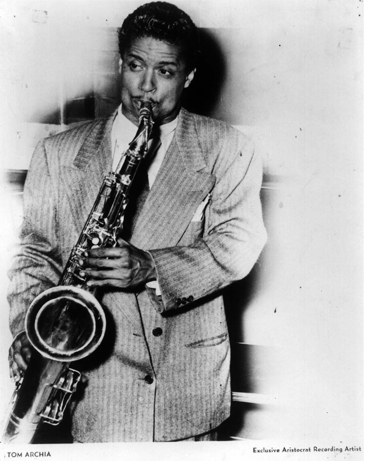
After halting its studio activity in late December 1947 (with a country session by Dick Hiorns), Aristocrat returned to the studio in July or August 1948 when it recorded The Nighthawks, but kept its activities strictly under wraps. Only the mastering dates were written down during 1948, and some of these were substantially later than the recording dates. (Though many of the smaller labels had been flouting it since the summer, the majors were largely compliant, and the American Federation of Musicians didn't officially end the recording ban until December 13, 1948.)
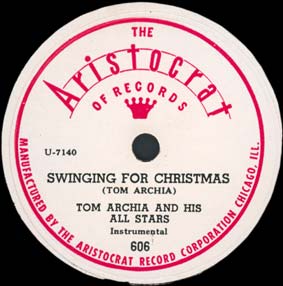
Tom Archia (ts); Gene Ammons (ts); Willie Jones (p); LeRoy Jackson (b); Wesley Landers (d).
Universal Recording, Chicago, early October, 1948
| U-7140? | Jam for Boppers* (Archia) | Chess LP 1445, Cadet LP-785, Cadet 2CA 60038, Chess [Br] CXJD 701, Proper [CD] #, Classics 5006 [CD] | |
| U-7141 [U-7140 on the labels] |
Swinging for Christmas [Boppin with Santa^]* (Archia) |
Aristocrat 606, Chess 1445^, Chess CHV 414, Cadet 2CA 60038, Chess [Br] CXJD 701, Chess GRD-801, GRP GRD9796, Classics 5006 [CD] | |
| U-7142 | Talk of the Town* (Symes-Neiburg-Livingston) | Aristocrat 606, Chess 1445, Chess CHV 414, Chess LP 1442, Cadet LPS-783, Cadet 2CA 60038, Chess [Br] CXJD 701, Chess GRD-801, Classics 5006 [CD] | |
| U-7143? | The Battle* (Archia) | Chess CHV 414, Cadet 2CA 60038, Chess [Br] CXJD 701, Classics 5006 [CD] |
Aristocrat 606 was a 78-rpm single, issued in November 1948 (listed as a new release in Billboard, November 13, p. 37. The release date definitively rules out the December 10, 1948 recording date given by Lord, as well as the November 12 date given on the Cadet 2-LP set. Particularly since U7139, from the bootleg live session at the Pershing Ballroom, was made to appear as though it was from this session—and Aristocrat 605 with "McKie's Jam for Boppers" was issued in October 1948! The only date consistent with the release schedule is the October12 listed in the notes to Chess CHV 414, and in the discography section of Chess GRD-801, a Gene Ammons CD that was issued in 1994 under the title Young Jug. And October 12 was actually the mastering date, but it followed closely after the actual recording date.
Chess 1445, a single released in November 1950, was credited to "Gene Amons [sic] and Tom Archia" on the label. On Chess 1445, which also gives the wrong matrix number on the label, the piece was retitled "Boppin [another sic] with Santa." Applause is dubbed in amateurishly at the beginning and end of "Boppin." According to the late Otto Flückiger, Chess 1445 sounds as if Leonard Chess played Aristocrat 606 through speakers and picked up it again with a microphone so as to give the impression of a live venue. "Talk of the Town," also by Gene Ammons and Tom Archia according to the labels, was still credited to one Chester Cohn, who didn't compose it.
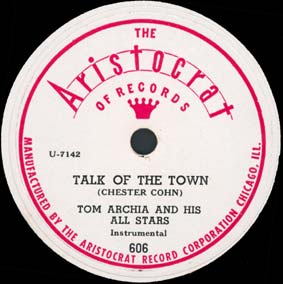
The ballad title was given as "It's the Talk of the Town," on most later issues. (And the bogus composer credit was dropped.) Needless to say, every one of the later releases played up Gene Ammons' role... In fact, except for Lord's Jazz Discography, which claims that Archia was on "Talk of the Town," all other sources have Ammons as the sole tenor saxophonist on the side. That's kind of odd, when Archia was the leader, Chess 1445 still puts him on the side, and he played a few ballads himself! (Vernel Fournier noted that the house band at the Macomba played lots of standards.) Porter does remark in his 1975 liner notes to the Cadet 2-LP set that "Talk of the Town" doesn't sound quite like any subsequently recorded Gene Ammons ballad. Nope.
Chess LP 1442, The Soulful Saxophone of Gene Ammons, was released in November 1959, according to Mike Callahan's Chess Album Discography. It was reissued in 1967 as Gene Ammons Makes It Happen on Cadet LPS-783. Chess LP 1445, Gene Ammons and Sonny Stitt: Jug and Sonny was issued in 1960, also according to Callahan; "Jam for Boppers" was credited to Ammons there. This LP was reissued with the same title on Cadet in 1967 as LP-785. Cadet 2CA 60038, Gene Ammons: Early Visions was released in 1975, and it came out later in a British edition, Chess CXJD 701; on these, "The Battle" was credited to Archia and "Jam for Boppers" was credited to Ammons (umm, they're versions of the same piece). This 2-LP set is particularly significant because it compiled all of Ammons' 1948-1951 recordings for Aristocrat and Chess, except the two sides by Christine Chatman on Aristocrat 8001, the two "Skeetz Van" sides, and "Hey Tom Archia"—on which company files had nothing to say about Jug's role. "Swinging for Christmas" was also reissued in 1997 on the various-artists collection A Traditional Jazz Christmas (GRP GRD9796), where Archia's name went completely unmentioned (one record reviewer opined that Jug must have been jamming with Sonny Stitt on "Swinging for Christmas"!); other tracks were by Louis Armstrong, Mel Tormé, Les Brown, Al Hibbler, Peggy Lee, et al. A British 4-CD compilation from 2000, BeBop Spoken Here, includes "Jam for Boppers." The first full reissue of this session on CD had to wait till February 2001, when Classics released Tom Archia 1947-1948 (Classics 5006).
There has been utter confusion about the details of this session, stemming from the lack of documentation in the company files, and the subterfuge surrounding "McKie's Jam for Boppers." Lord omits the original releases on Aristocrat 606. Ruppli has U7139 as the matrix number for both "McKie's Jam for Boppers" and "Jam for Boppers," U7140 as the matrix for "Swinging for Christmas" (an error propagated by some record labels and by the liners to Young Jug) and U7141 and U1743 as unidentified. This, no doubt, reflects what little could be gleaned from the company master books. However, the matrix number in the shellac for the original issue of "Swinging for Christmas," Aristocrat 606, was U-7141.
The jammed numbers have produced headaches of their own. It has been assumed (starting with the compilers of Chess CHV 414) that "The Battle" was the same piece as "McKie's Jam for Boppers." (See, for instance, the series of exchanges in Jazz Journal: Item 882, October 1972, p. 19; 882, January 1973, p. 13; 882, February 1973, p. 13; 882 one more time, April 1973, p. 18). No one who made this assertion had actually heard Aristocrat 605, on which "McKie's Jam for Boppers" made its sole appearance. "McKie's Jam for Boppers" has a different head, a trumpeter, guitarist, and alto saxophonist not heard on U7140-U7143, and a pianist who is not Willie Jones. "The Battle" and "Jam for Boppers" are two versions of the same tune. Both feature Ammons and Archia backed by Jones, Jackson, and Landers. "The Battle" runs 2:53; Ammons and Archia chase each other. "Jam for Boppers" (we're tempted to say that it was done first, and redone because it was way too long for a single-sided 78—but of course we don't know) runs 5:03, and consists of 4 full choruses by each tenor.
Finally, both Ammons and Archia are on "Talk of the Town." The ballad has been telescoped to fit a 3-minute 78 side: instead of two full AABA choruses, it's one full chorus, a half chorus picking up at the bridge, and a coda. The actual structure is AABABA-coda. Jug takes the first chorus, Tom the half chorus, and Jug the coda (there is a difference in timbre between the two, and Jug is breathier than Tom on his ballads). We are indebted to Vernel Fournier (who was the house drummer at the Macomba during the club's last months) for pointing out how the tenor players were switching off on this side. Fournier confirmed that Wes Landers was the drummer.
Discographies have customarily listed Christine Chatman as the pianist on this date, but Junior Mance (who is quoted in the liners to Young Jug, and who really ought to know) says it was Willie Jones, the regular pianist at Macomba during this period. The spiky Jones signature is apparent on these sides, including in his accompaniment to Jug on "Talk of the Town," which is either brilliantly contrarian (our opinion) or tremendously "unsympathetic" (Bob Porter's complaint in the notes to Early Visions). Any doubts about Jones' presence are removed by listening to the jams, where he gets into his locked-hands stuff. The differences of opinion should remind us that Willie Jones, who was acknowledged as an influence by both Andrew Hill and Sun Ra, was one of the most controversial musicians ever to play in Chicago.
So, finally, we have a solo lineup:
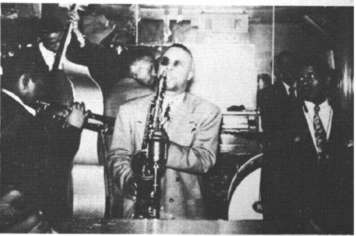
Tom Archia never recorded for Aristocrat again. (There are passages in Gene Ammons' February 28, 1949 session that sound like Tom for a moment, but this seems to be a matter of Gene quoting a few of Tom's licks on "Stuffy" and "Once in a While"—plus the use of another AABABA structure on "Once in a While.") "Swinging for Christmas" was allegedly one of Aristocrat's top three sellers in 1948 (as proclaimed in a 12/25/48 advertisement in Cash Box). After a deduction for hyperbole, the single does seem to have moved well in Chicago. Apparently Leonard Chess became more interested in Gene Ammons and Claude McLin, both of whom recorded regularly for the label between 1949 and 1951, and both of whom had hits in 1950.
On October 21, 1948, Tom Archia was in front of the Local 208 Board once again. Tom Archia's orchestra (Local 208 had finally accepted him as the leader) was called in "to explain why they played at the Club Rodi on their off night, from the Macomba Lounge." Archia wasn't there, and the other band members—William Searcy, piano; Lowell Pointer, bass; and Bob Aviles, drums—claimed that they thought everything was in order because their leader had negotiated it. Local 208 had a strict policy against members playing 7 nights a week "expecially [sic] when they are on a six day week engagement." The other members of the band were admonished and Tom Archia was fined $25 for accepting an off-night job against Local rules and for failure to appear.
On November 7, 1948, Tom Archia appeared as part of an all-star lineup at the Civic Opera House in Chicago. The inevitable Al Benson was the Master of Ceremonies and performers included Billie Holiday (voc); Jackie Paris (voc); Dolores Bell (voc); Fats Navarro (tp); Miles Davis (tp); Bennie Green (tb); Gene Ammons (ts); Charlie Ventura (ts); Allen Eager (ts); Max Roach (d); and Ed Shaughnessy (d).
Tom Archia was absent from the Macomba for a little while in early 1949. The Defender had "Tom Archia and his great combo playing your juke box hits" at Gene Ammons' usual haunt, the Congo Lounge, 4757 South Parkway, on February 19. On February 20, a "Triple Boogie Sunday" at the Pershing Ballroom featured a tenor battle between Tom and Gene, with Gene's father Albert Ammons as an added attraction. One vindication: Tom Archia was referred to as the leader in a Defender article on July 30, 1949, which noted that he had been at the Macomba for "moons." After appearing in a show on July 31, 1949 (Billie Holiday was the headliner), Archia went on the road in August, playing gigs in Cleveland and Columbus, Ohio, according to the Chicago Defender. The Pittsburgh Courier (August 13, 1949, p. 19, filed from Cincinnati) had Tom Archia, his band, and Andrew Tibbs set for a tour of Georgia, Louisiana, and Texas ("Andy Tibbs, Tom Archia Prep for Tour of Dixie"). Did Tibbs sing "Bilbo Is Dead"? The tour was managed by Charles Lee; it had previously included dates in Chicago.
An October 1949 gig at Corpus Christi auditorium in Chicago was mentioned in Down Beat for November 18. The Tom Archia Band included Archia (ts, ldr); Pat Boulby (as); Tommy Jones (as); Jim Bowman (p); and others. Was that Tommy "Madman" Jones, playing tenor? Meanwhile, Jim Bowman was presumably the same pianist who recorded with Sax Mallard and Duke Groner. Vocalists in this package included Ethel Duncan, Alice Roberts, Leo Ketchum, LeRoy Shields, and Robert Anderson.
In 1949, while he was still working the Macomba Lounge, Tom Archia met a young woman named Freda Kelln (born January 15, 1925). Freda was a jazz fan from Winnipeg, Manitoba, who had recently moved to Chicago with one of her girlfriends so she could hear live jazz in the clubs. Tom and Freda soon settled into a common-law marriage.
During this period, Tom Archia was still playing occasional Sunday dances at the Pershing Ballroom. According to Galen Gart in his First Pressings volume for 1950 (we need to track the original source), his appearance at a January 1950 event was advertised as follows: "McKie Fitzhugh will present an all-star line-up at the Pershing Ballroom, Sunday, Jan. 22 featuring a 'Battle of the Saxophonists' between Gene Ammons, Tommy Archia, and Eddie Chamblee. Supporting musicians will include Wesley Landers, Junior Mance, Eugene Wright and Leo Blivens [sic]." Mance, Wright, and Landers were all members of Gene Ammons' working combo at the time.
In February 1950, the Tom Archia Quartet was still holding forth at the Macomba Lounge: Archia (tenor sax, leader); Willie Jones (piano); Lowell Pointer (bass); "Hindoo" Henderson (drums). (This information is drawn from Down Beat, March 24, 1950.)
But now that he seemed comfortably established at the Macomba, there was another spot of trouble. Local 208 (rather incredibly for an organization that counted a large number of jazz musicians among its members) had a longstanding policy against jamming, which had been enforced against musicians at the Macomba Lounge in the past. On April 11, 1950, around 12:30 AM, Tom Archia's regular band (Willie Jones, Lowell Pointer, and Robert Henderson) were joined at the Macomba by Claude McLin, tenor sax, and Forrest Sykes, piano. McLin and Sykes were fined $25 each, as was Archia for inviting them.
McLin stated that he knew he was violating the law, but felt that the ruling was unfair, because it did not give musicians a chance to exchange their ideas under a proper environment. He further stated that rehearsals might be the right place to work out ideas, but musicians get more out of their playing when they have an audience.
Tom Archia stated that he knew no jamming was permitted, but took a chance and got caught.
Then disaster struck: on June 1, 1950, the Local 208 Board fined Tom Archia $50 and banned him from working anywhere in their jurisdiction for 60 days. The official cause for action appears to have been Archia's habit of taking one-night engagements on his off nights; no one in the Union was supposed to be working more than 6 days a week. But the recent flap over jamming at the Macomba couldn't have helped.
Archia had played the Brookmont Lounge on May 11, 1950 (accepting a percentage of the take that amounted to less than Union scale) and the Bo-Dollar Tavern on May 17 and 22 (paying the sidemen under Union scale for four hours of work each night) on his off nights from the Macomba. What's more, he hadn't filed contracts or paid his local tax for any of these engagements.
Archia stated that he meant to file the contracts and pay the tax as soon as he got some money. He admitted being paid for the engagements in question, but further stated that he had spent the money.
The Board had lost patience. "It was explained to Archia that he constantly failed to observe the rules and regulations of the local, and that fines seem to have no effect on him."
Tom Archia played another one-night gig in Chicago Heights on May 19, under the leadership of Willie Jones (on a night that the Macomba Lounge was closed). We know about the gig because Willie Jones thought Archia wouldn't be available, asked tenorist Melvin Scott to replace him, then told Scott an hour and a half before the engagment that Archia was available after all. Which led in turn to a beef between Jones and Scott that had to be heard by the Local 208 Board on June 15, 1950. The reason for the last-minute change is interesting. Jones told the board that "at the last moment he learned that the Macomba Lounge would not open as scheduled, and he decided to take Archia who was a good drawing-card" (Board minutes, p. 2).
On June 5, 1950, a special meeting was convened, at Leonard Chess's request, so the Board could hear an appeal of the 60-day suspension.
Archia admitted that he was guilty of all charges, was willing to pay his fine, but could not possibly see how he would be able to earn his livelihood without being able to work. He requested that the Board reconsider his case, promising that he would never be guilty of such violations again, and suggesting that he be placed on probation.
Members of the Board discussed the matter at length with Archia, suggesting that he appoint some level-headed member of his orchestra to handle his business for him. Archia stated that he had thoroughly learned his lesson, that it would not be necessary for him to depend upon someone else to take care of his transactions with the Local, as he intended conducting himself in an entirely different manner in the future, shouldering all of his own responsibilities, and behaving in a manner becoming to a professional musician.
President Gray advised Archia that he would be expected to live up to all of these promises, whereupon Archia promised complete and honest cooperation with the Local, adding that he should be guilty of another violation he would be willing for the Local to confiscate his instrument, which represents his whole life. He further asserted that he is definitely repentant, and his only desire is to be permitted to work.
President Gray questioned Archia about working six days per week, and accepting extra jobs on his off nights, pointing out that this practice is not permissable [sic].
Archia stated that he would not accept another engagement on his off night, and would work six nights per week on his regular job only.
After nearly an hour of this, Archia was let off with the $50 fine and 6 months of probation. Once again, Leonard Chess had come to his rescue.
On June 15, Tom Archia filed a new "indefinite" contract with Local 208; he continued to work the Macomba till some point in the early fall of 1950, when the club was forced to close after a fire. His final rhythm section consisted of Willie Jones, Lowell Pointer, and Vernel Fournier.
The Macomba Lounge had provided Archia with steady work and the best musical company for most of the preceding three and a half years. A job like that was impossible to replace.
Another announcement for a dance engagement is preserved in Gart's 1950 volume: "Madison Roller Rink, 2560 W. Madison St., will be the scene of an All-Star Breakfast Dance on Saturday nite, ([October] 21) from 12 midnite 'til 4 a.m.. Sponsored by Jeep Evans and Rudy Mauran, the dance will feature some of the top names in the business, including Tom Archia, Johnny Griffin, Von Freeman, King Kolax and his combo, Melvin Scott, George Freeman and Grant (Mr. Blues) Jones."
Around February 3, 1951, Joe's Rendezvous Lounge featured Duke Groner, an "International Famous Band featuring Tom Archer on sax" and Miss Sharecropper (aka LaVern Baker—she hadn't changed her marquee title yet). On October 13, 1951, Club Tally-Ho Lounge and Chicken Shack advertised "Music Nightly by Tom Archia and his Combo." This was a four-night-a-week engagement (Friday through Monday). However, Archia was soon in trouble with the club owner, Lloyd West, for leaving the gig early on October 26 and skipping October 27 and 28 entirely; on Monday night October 29, "he worked after midnight, because Assistant [William] Dover was there." It seems that Tom Archia had gotten an offer to work the Regal Theater and hadn't bothered to tell the club owner about it.
In front of the Local 208 Board on November 1, 1951, West complained that on Friday night Oct. 26 "Archia reported for work... and played one set, after which he left for the Regal Theater, and did not return until midnight, at which time he was too intoxicated to play." West wanted to deduct half of Archia's pay (which totaled $80 for 4 nights).
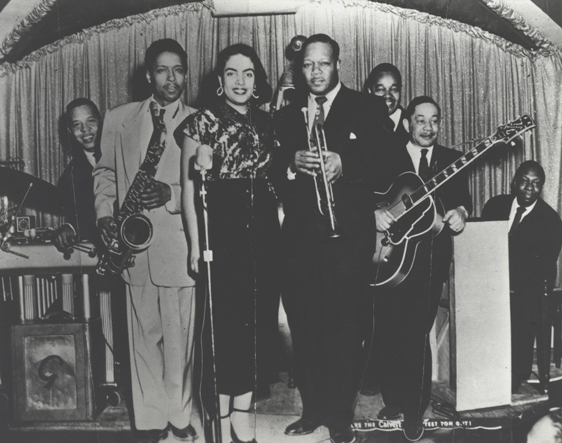
On January 19, 1952, the club in the Morocco Hotel, now known as the Flame Lounge, had Tom Archia and his All-Star Combo with Bill Martin (trumpet); Pete Hatch (piano); Lowell Pointer (bass); and Buddy Smith (drums).
Tom Archia also returned to the studio in 1952, after a three and a half year absence. Both of his appearances that year were uncredited work with pick-up bands; neither has been noted in the existing discographies. The first session was behind Dinah Washington, whose band he had directed in 1946. The second was the only Chicago session by blues singer Gates White, who lived in California and had previously recorded in Los Angeles.
Dinah Washington (voc); unidentified (tp); unidentified (tb); unidentified (as); Tom Archia (ts); unidentified (ts); Wynton Kelly (p); L. C. McKinley (eg); Keter Betts (b); Jimmy Cobb (d).
Mercury Studios, Chicago, May 6, 1952
| 9220-8 | Pillow Blues* (Cobb) | Mercury 8292, Jukebox Lil [Swe] JB1102, Official [Den] 3021, Official [Den] 83021 [CD], Mercury 831448, Mercury 832 448 [CD], Mercury [J]30JD-10055 [CD] | |
| 9221-9 | No Caviar (Cobb) | Official [Den] 3021, Official [Den] 83021 [CD], Mercury 831448, Mercury 832 448 [CD], Mercury [J]30JD-10055 [CD] | |
| 9222-? | Double Dealing Daddy* (Kirkland-Wyche) | Mercury 831448, Mercury 832 448 [CD], Mercury [J]30JD-10055 [CD] | |
| 9222-3 | Double Dealing Daddy* (Kirkland-Wyche) | Mercury 8292, Mercury MG20650, Jukebox Lil [Swe] JB1102, Official [Den] 3021, Official [Den] 83021 [CD], Mercury 831448, Mercury 832 448[CD], Mercury [J]30JD-10055 [CD] |
The prominent tenor sax soloist on this session (too prominent—he is seriously overmiked) has gone unidentified for 48 years. Previous guesses by discographers have included Lockjaw Davis, Paul Gonsalves, and (most appropriate from a stylistic standpoint) Paul Quinichette. There is no doubt that this is Tom Archia, however; the overmiking makes him sound rougher and more guttural than usual, but the phrasing is highly familiar from his earlier blues solos. Archia and the guitarist (who sounds like L. C. McKinley) are the only soloists. Dinah Washington as the time was working regularly with a rhythm section run by her then husband, Jimmy Cobb; the rest of the band still needs identifying.
Mercury 8292 was a 78-rpm single released at the time. Basic information about the session comes from the notes to Mercury 832 448, a 3-CD set issued in 1987 under the title The Complete Dinah Washington on Mercury Vol. 2 (1950-1952). Mercury 831448 was from the corresponding series of LPs; Mercury 30JD-10005 was the same CD set as issued in Japan. Tom Lord's Jazz Discography is the source for the other issues.
The discography in the back of the 3-CD set (compiled by Kiyoshi Koyama) suggests that Paul Quinichette was the tenor sax soloist, but the Wynton Kelly discography by Claude Schlouch (correctly) denies this.
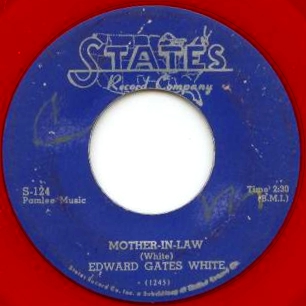
In June 1952, Tom Archia was working Club Gaiety (609 East 47th) in a trio led by Bill Searcy (piano); Jesse Simpkins played bass during the later part of this engagement. This did not work out well. On July 3, Alice Glass, who owned the club, appeared in front of the Local 208 Board, along with Searcy and Simpkins.
Mrs. Glass stated that member Tom Archia, the featured saxophonist with Searcy's trio, was drunk and boisterous to the extent that Searcy had to replace him. She contended that if Searcy had to replace Archia on the saxophone, and get another bass player for Simpkins who was only filling in, he did not have an organized trio.
Searcy admitted that Archia drank heavily, and was naturally too boisterous. He further added that Mrs. Glass had to issue orders not to serve Archia whiskey at her bar.
By mutual agreement, the engagement was declared closed as of June 30. Tom Archia was able to pick up work at the 528 Lounge (contract acceped and filed August 21).
On October 15, 1952, Tom and Freda's first daughter Cotie was born. She would be followed 14 months later, on December 4, 1953, by their second daugher Robin.
Edward "Great Gates" White was a blues shouter who recorded for several different labels. According to Bob Eagle, he was born in Madrid, Houston County, Alabama, although in later years he said he was born in Philadelphia. White was working in Southern California when States signed him. His previous recordings had been for small companies in the Los Angeles area: Kappa around February 1949, Rex Hollywood in April 1949, Selective around May 1949, Miltone in August 1949. On November 20, the Los Angeles Sentinel announced that White "recently boarded a plane for Chicago" for a recording session for "Lue Simpton" of United. (Thanks for Bob Eagle and Rob Ford for this information.)
Edward "The Great Gates" White (voc); prob. Fortunatus Paul "Fip" Ricard (tp); prob. Eddie Williams (ts); Tom Archia (ts); prob. Louis Carpenter (p); Ike Perkins (eg); Jimmy Richardson (b); Theodore "Red" Saunders (d).
Universal Recording, Chicago, November 26, 1952
| 1243-5 | Tired of Being Mistreated | Pearl PL-17, Delmark DE-717 [CD] | |
| 1244-7 | Love Is a Mistake* | Pearl PL-17, Delmark DE-717 [CD] | |
| 1245-4 | Mother-in-Law (White) | States 124, Krazy Kat [Br] KK 7435 Pearl PL-17, Delmark DE-717 [CD] | |
| 1246-9 | Rockabye Baby (White)* | States 124, Pearl PL-17, Delmark DE-717 [CD] |
States 124 was a single released in July 1953. It was promoted by Dave Clark, in his "Rhythm and Blues Tattler" column in Billboard, August 8, 1953, p. 36, and reviewed in the August 29 issue, p. 44.
The session information comes from Bob Koester's discography of the United/States labels. The liners to Pearl PL-17, Long Man Blues, an LP collection issued in 1989, indicate Red Saunders as a "possible" on this session. (The Pearl LP is also the source for the take numbers.) Delmark DE-717, also titled Long Man Blues, is a compilation from 2000 that subsumes all of the cuts from the Pearl LP and adds numbers by Eddie Boyd, L. C. McKinley, Ernest Cotton, Jack Cooley, and Harold Burrage.
Krazy Kat KK 7435 was an LP released in Britain in 1986, under the title The Great Gates: West Coast R'n'B 1949-1955. Our thanks to Bob Eagle and Stefan Wirz for information.
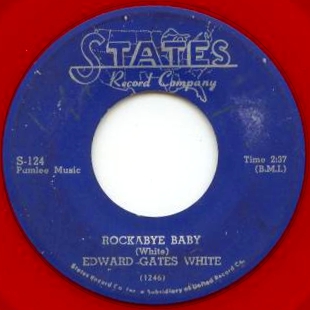
Listening upgrades Red to a "definite," and Jimmy Richardson seems to have come along with him. Pearl's identification of Ike Perkins as the guitarist seems correct. But this is not a typical Saunders ensemble. The pianist is not Earl Washington; whoever it is sounds like a less forceful Willie Jones. His disciple Louis Carpenter (who recorded with Red Holloway behind doo-wop groups for Chance in 1953; see the Appendix to our Al Smith listing) seems likely. The tenor player who solos on "Love Is a Mistake" and solos second on "Rockabye Baby" is obviously Tom Archia (captured in splendid fidelity, too). The obbligato on "Tired of Being Mistreated" and the first solo on "Rockabye" appear to be the work of Eddie Williams (who can also be heard on the Horace Henderson recordings from July 1954, later issued on IAJRC). No trumpet is credited by Pearl (or by the Delmark CD, which replicates the Pearl credits), but there is one in the ensemble, and he steps out for a few notes during the tag to "Rockabye." If it's a member of Red's band, Fip Ricard is the obvious choice.
In November 1952, Plantation Liquors had "Tom Archer & Tippy Lewis Combo." In December 1952, the Flame Show Lounge put on "The Jo Jo Show" with Tom Archia last on the bill, under Howard Thompson's All Stars.
Tom Archia is a "probable" on one more Dinah Washington session with a pick-up band. Two of the three tenor sax solos on this session sound like Tom Archia (at least when not so overmiked as on the session of May 6, 1952) but as their vocabulary has a high percentage of bop licks, we are not 100% sure.
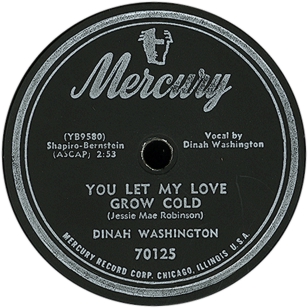
Dinah Washington (voc); prob. Hobart Dotson (tp; arr -1); unidentified (tp); unidentified (tb); prob. Porter Kilbert (as); prob. Tom Archia (ts); prob. Tommy "Madman" Jones (ts); prob. McKinley Easton (bars); poss. Beryl Booker (p); unidentified (eg); Keter Betts (b); Jimmy Cobb (d).
Mercury Studios, Chicago, c. February 1953
| YB9580 | You Let My Love Grow Cold (Robinson) | Mercury 70125, Mercury MG20579, Jukebox Lil [Swe] JB1102, Official [Den] 3021, Official [Den] 83021 [CD], Mercury 834 675, Mercury 834 675 [CD] | |
| YB9581-7 | Surprise Party* | Official [Den] 3021, Official [Den] 83021 [CD], Mercury 834 675, Mercury 834 675 [CD] | |
| YB9582 | Don't Get Around Much Anymore* | Mercury MG20622, Mercury SR60622, Mercury MG20829, Mercury SR60829, Official [Den] 3021, Official [Den] 83021 [CD], Mercury 834 675, Mercury 834 675 [CD] | |
| YB9583-5 | Ain't Nothin' Good (Fox-Friedman) -1 | Mercury 70125, Mercury MG20579, Official [Den] 3021, Official [Den] 83021 [CD], Mercury 834 675, Mercury 834 675 [CD] |
Information on the various releases from this session was drawn from Tom Lord's Jazz Discography. Mercury 70125 was a 78 and 45-rpm single, advertised in Billboard on March 28, 1953 (p. 33), presented as a "New Record to Watch" (April 11, 1953, p. 27), and reviewed in Billboard on April 18, 1953 (p. 30). Mercury MG20579 was a mono LP; MG20622 (SR 60622) and MG20829 (SR 60829) were somewhat later LPs available in mono (MG) and stereo (SR) versions. Mercury 834 675 [CD] is a 3-CD set titled The Complete Dinah Washington Vol. 3.
Except for the rhythm section (which regularly accompanied Dinah Washington during this period) the band has gone unidentified in previous discographies. There is some roughness in the playing, which stems to some degree from rhythmic incompatibility between the Chicago horn players and the non-Chicago rhythm section. There are at least two trumpets on the date; the lead trumpet player sounds like Hobart Dotson, and the arrangement of "Ain't Nothin' Good" resembles known Dotson arrangements for Sun Ra as recorded in 1959. A trombonist is not very salient in the ensemble but can be heard more clearly on "Ain't Nothin' Good," where the trumpets are muted most of the time. There is a Hodges-style altoist (if not Porter Kilbert, then Willie Randall), a very prominent baritonist (probably Chicago's old reliable, Mac Easton), and two tenors. One tenorist solos briefly, in a loud explosion of grit, on "You Let My Love Grow Cold"; this has to be "Madman" Jones or another bar-walking specialist. The other tenor player is heard in a short solo on "Surprise Party" and in a more extended outing on "Don't Get Around Much Anymore"; this appears to be Tom Archia.
Thanks to Yves Smierciak for pointing us to this session and Tom Archia's possible role in it.
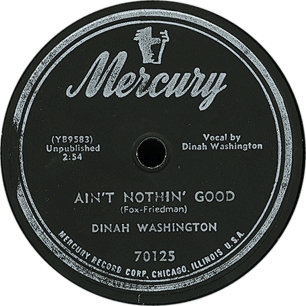
The March 7, 1953 issue of the Defender had a slightly different version of the same show at the Flame Show Lounge, now including blues ballad singer Little Miss Cornshucks. Later in March, the Savanah Club (350 East 51st Street) advertised "Tom Archer & Band, featuring Howard Thompson." On May 23, 1953, a Chicago Defender ad for the Nob-Hill at 5228 Lake Park called on everyone to "Come out and dance to the music of Lefty Bates new jazz combo featuring Harold Ashby (direct from Birdland N. Y. C.) vs. Tom Archia (Battle of Saxes)." (Bates had been leading a band part-time at the Nob Hill since the beginning of February.) On November 19, 1953, Tom Archia's indefinite-period contract with the Rodeo Club was accepted and filed by Local 208.
On February 2, 1954, the legendary Bee Hive Lounge advertised Tom Archia accompanied by the house trio of Junior Mance ("Piano Wizard, Mercury Recording Star"); Israel Crosby (bass); and Buddy Smith (drums). In the preceding weeks the house trio had backed Gene Ammons, Floyd "Candy" Johnson, and Eddie "Lockjaw" Davis. The same lineup was advertised on February 20 with "The New Tom Archia, Chi's Sax Star." The next week Allan Eager took Tom's spot.
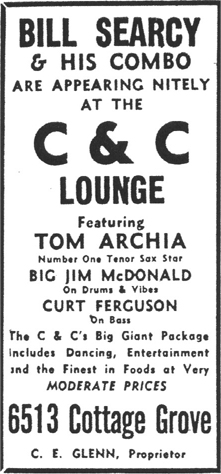
Tom Archia must have mended his fences with Bill Searcy after the June 1952 fiasco. Searcy landed a contract as a leader with the "C and C Liquor Store," as it was initially billed (indefinite contract filed with Local 208 on March 18, 1954). On March 13, the C&C Lounge at 6513 Cottage Grove offered pianist Bill Searcy & his Combo, including "Number One Sax Star" Tom Archia, Curt Ferguson (bass), and Big Jim McDonald (drums and vibes). On May 1, 1954, Searcy's combo was again advertised in the Defender along with Archia but not Ferguson or McDonald, and on September 25, 1954 the same ad appeared again. Archia might have defected for a while to another venue in the neighborhood: the Southtown Economist for October 27, 1954 (p. 8) had "Tom Archia, Sax King" as a featured attraction along with the Blue Notes, singer Jerry Mitchell, and the Melvin Scott Band at the Leather Glove, 6426 South Ashland. The ad was repeated on November 3 (p. 24). But Archia probably returned to the C&C in short order. At this point, Tom and Freda and their family were living in an apartment directly above the C&C; they would remain there until 1958. On February 6, 1955, Tom's son Ernest Alvin Archia III was born.
We used to think that "Downfall Blues" from the October 1947 quartet session for Aristocrat was an anomaly, because it's the only recording that Tom Archia sings on. However, a memorial column by George McElroy (The Houston Post, January 27, 1977, p. 20A) notes, "He'd often rest his instrument and sing in his gravel-voice style such songs as 'I Got My Mojo Working.'" It is a fair guess that he was singing in the clubs in the mid-1950s.
On May 7, 1955, the C&C Lounge was mentioned in a brief article as "presenting an allstar music group featuring Irma Thompson on piano, Tom Archia, sax and Goon Gardner, also on sax..." On June 18th, the same venue featured the "Battle of the Saxes" with Tom Archia and Porter Kilbert and the rhythm section of Junior Mance (piano); Lowell Pointer (bass); and Bill Hobbs (drums). Word about these All Stars in residence at the C&C Lounge spread further. Down Beat, July 16, 1955, mentioned the same lineup, with the detail that Kilbert was playing tenor sax. On October 8, 1955, the New York Age ("Chicago Nighteries on Swing, Bop Kick; Ravens in Spotlight," p. 8), in an entertainment rundown probably acquired from the Defender, had Archia and Kilbert at the C&C, with Dave McCullough (piano), Lowell Pointer, and Bill Hobbs. (Also in town that week: Max Roach and Clifford Brown, Danny Overbea, The Ravens, Ahmad Jamal, Melvin Scott with Willie Jones, Howlin' Wolf, The 4 Aces, Calvin Bostick, and, of course, Red Saunders.) As of December 3, the Archia/Kilbert Battle of the Saxes was continuing at the C&C. Dave McCullough was still there; the advertisement mentioned one Ver Nell (supposedly on bass); and Bill Hobbs (drums). This last advertisement was obviously a goof; the drummer was Vernel Fournier, not Bill Hobbs! Fournier told us that the bassist at this juncture was Eddie Calhoun.
And in January 1956, the C&C Lounge had "The All Stars" with Kilbert, Archia, Fip Ricard on trumpet (spelled "Richard" in the blurb), and trombonist Gus Chappelle. An advert from April 7 just mentions the C&C All Stars; the club had decided to deal with the periodic changes in the group's front line by not crediting the individual musicians. Tom Archia probably continued as a member of the C&C house band till the end of 1956. The All Stars took a blow in the fall of 1956 when Porter Kilbert was sidelined for a few months by a stroke (he was able to make a comeback in 1957, when he recorded as a leader for Ping).
Jodie Christian and Charles Walton (see their Bronzeville Conversation, http://www.jazzinchicago.org/Internal/Articles/tabid/43/articleType/ArticleView/articleId/106/JodieChristian.aspx) recalled that the trio came together in mid-February 1957 at Cadillac Bob's request; the first tenor player was Clifford Jordan. No sooner had Cadillac Bob finally sprung for an ad mentioning the group in the Chicago Defender than Clifford Jordan decided to leave town. He and John Gilmore were invited to record in New Jersey for Blue Note (the session took place on March 3); Jordan ended up staying in New York City. Christian had never played a Hammond organ before, so Jack McDuff, who was living in the hotel at the time, had to show him how to turn the instrument on. The late Charles Walton said:
Playing in the organ trio, we had a ball for two weeks. We worked three nights a week, Friday through Sunday, 10 PM to 4 AM, and very few customers. The third week Clifford Jordan went to New York with John Gilmore to record an album with Horace Silver. Tom Archia replaced Clifford and his followers came in. All of a sudden we had customers. "Sleepy" Anderson replaced Jodie on the organ for a while and then both he and I quit. adillac Bob, as usual, became funny with the money and didn't pay us on time.
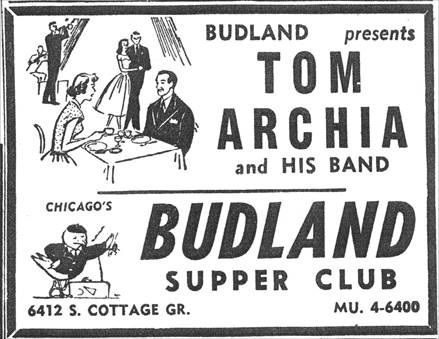
In fact Christian was in the band through early May, and Walton stayed longer. On May 11, 1957 Budland advertised Tom Archia "No. 1 Tenor Stylist and his new band"; this was the trio with Sleepy Anderson at the organ and Charles Walton on drums. They shared the bill with Sun Ra and his Arkestra, who had been working, in some capacity or other, at the club most of the time since January 1956, when it was still called Birdland.
By the week ending August 3, 1957, William Hobbs was on drums, and Jack McDuff, a recent arrival in Chicago from Danville, Illinois, had just taken over at the organ. Archia had an altercation with Jo Jo Adams at a breakfast dance (see below) and took off for another engagement. Hobbs and McDuff got John "Flaps" Dungee, a bebopping altoist, to replace him; they continued through August 17. (The changeover was so abrupt that Tom Archia was still being mentioned in Budland's Defender ad on the 17th.) The Hobbs/McDuff/Dungee version of the trio ended up being summoned in front of the Board of Local 208 on September 5, because McDuff was not supposed to take the engagement while in his first 3 months as a "transfer member" of 208. (Interestingly, the Board minutes refer to the owner of Budland, whose real name was given in an earlier installment as Robert Cherry, simply as Cadillac Bob!) There were other irregularities going on; the Board asked Cadillac Bob why he wasn't paying Bill Hobbs a leader's fee.
Archia's other engagement turned out to be with Bill Martin's band at the Grand Terrace. What had once been one of Chicago's leading ballrooms was trying one last time to mount an organized show. As in the attempted revivals in 1955 and 1956, Rudy Crier directed. But the effort was half-hearted. The first display ad in the Defender was about the same size as the last one for the show that Sun Ra had played in the fall of 1955.
An ad for Tony's House of Joy (August 24, 1957) promoted a Gala Labor Day Party and Dollar Party, coming up on September 2. Top billing went to trumpeter Bill Martin's Band starring Tom Archia. Helen Calloway (vocal) and Jimmy Dorsey's Band were also mentioned. We're not sure what the Dorsey reference was about, but the other acts were all appearing at the Terrace.
Tom Archia appeared before the Board on September 19, explaining that he had been out of town on the 5th. The Board wanted to know why he had left the engagement without giving notice.
[Archia] stated that his employment at Budland had been very displeasing. First, because he received his wages in dribbles. Second, because he was asked to do more work than he had agreed to do. Third, because Dr. Jo-Jo Adams became so belligerent that he quit the job without notice rather than have a fight and have bodily injury. He stated that he was earning $23 per night and that Cadillac Bob still owed him $28 for the last week that he worked.
The Board backed Tom Archia on his claim against Cadillac Bob, then turned around and fined him $25 for hiring Jack McDuff and thereby "imperiling the interest of the Local and its members." (Despite Harry Gray and Local 208's fervent desire to replace McDuff with a Chicago-based organist, on October 3 the Board had to take further action to run him off the job. Hobbs would be called on the carpet on October 17 for not getting rid of McDuff right away. The underlying problem was that Jimmy Smith had made organ trios hugely popular in the black community—and there weren't a lot of Chicago-based organists who could play in the style that the pubic wanted to hear. The last thing Cadillac Bob wanted to do was get rid of a popular performer to please Local 208.)
The show at the Terrace stumbled along. At the end of September, the performers from the show ended up doing some midnighters at the Indiana Theatre. But Tom Archia had already left. A Defender ad announced a BATTLE OF SAX opening on Friday, September 20 at McKie's Disc Jockey Show Lounge, featuring Little Wash, His Sax and his Allstars plus Tom Archia. Little Wash (real name Lucius Washington; he was born in Memphis on June 18, 1926, and arrived in Chicago in 1942) was used to the tenor-battle format; he had featured it in his first combo from 1949-1952, squaring off nightly with Grady Johnson. Little Wash was also in considerable demand for recording sessions as part of Al Smith's units at Vee-Jay from 1956 to 1958; his solo on "Oh What a Nite" by The Dells, recorded at one of his first sessions with Al Smith on May 21, 1956, ought to be regarded as a classic. The contract for the McKie's engagement (accepted and filed by Local 208 on September 19, 1957 for an "indefinite" period) was in Lucius Washington's name.
McKie's would be Tom Archia's home base for much of the next two years. When not promoting its fried chicken, the club devoted substantial advertising space to playing up the tenor battles. Meanwhile, on October 17, 1957, the Local 208 Board heard out Tom Archia and Dr. Jo-Jo Adams concerning their altercation at Budland back in August.
Archia had stated at previous Board meetings that he and Jo-Jo had an argument and that he was afraid that bodily harm would come to him if they continued to work together and that he left the Budland engagement because of that reason, among others.
Mr. Adams stated that he and Mr. Archia had never had an argument to his knowledge, but they did have a few words one morning after everyone had been drinking and the band seemed to think that he stayed on the floor too long. He explained that on Monday mornings, everyone drinks more than usual and there is a lot of tension about the money coming in in dribbles and that on this particular Monday morning there was a breakfast show, which they refer to as a "jam session," and that he does numbers by request and the four tunes which he sang were rather long, and Archia walked off the band stand, and they had a few words concerning this.
The Board reprimanded them about drinking too much while they were working and instructed Mr. Adams to refrain from making threats to musicians.
The Grand Terrace show closed down in mid-October; the last Defender ad ran on October 12. It was the last gasp for the ballroom where Earl Hines and other nationally renowned bandleaders had performed.
On November 11, 1957, McKie's advertised Little Wash and his All Stars with Tom Archia and Gene Ammons. On November 23, the ad mentioned Tom Archia, Gene Ammons, and Little Wash, and displayed a small photo of Archia and his dueling partners. And on December 21, there was an ad for McKie's Big Holiday Sputnik Dance on Sunday, December 29, to be topped off by "Crowning Miss 58." Now the headliners at the Sax Battle were Gene Ammons and Johnny Griffin; Little Wash and Tom Archia were pushed to the bottom of the bill.
Lucius Washington (interviewed by Robert Campbell, July 18, 2001) recalls that he and Archia were regulars at McKie's for three years. The rhythm section consisted of Hal Roach, piano; George Boozer, bass; and Alrock "Al" Duncan, drums. McKie Fitzhugh often broadcast 30 minutes from the proceedings on his radio show. When Sonny Stitt and Gene Ammons were in town, Fitzhugh would bring them in as guest artists and feature them on his broadcast. Washington says he stayed out of the Stitt-Ammons duels. "They had such a grudge, they didn't need my help." In any case, Stitt and Ammons were notorious nomads, and Washington and Archia were the ones who kept the format going.
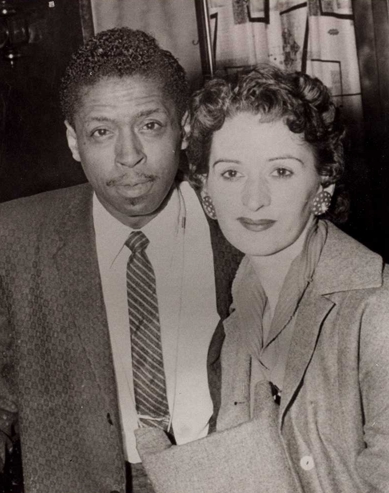
The February 1, 1958, issue of the Defender ran a short promo item to the effect that: The 'Celeb Breakfast Party' at the C&C lounge features Tom Archia and his band. The party gets underway every Monday morning at 7 am with celebrities galore on hand to meet and greet and entertain you." The C&C ad for that week mentions the Norman Simmons C&C All Stars for the Friday, Saturday, and Sunday shows, and concludes with the "Celeb Breakfast Party" for Monday morning.
1958 also saw the breakdown of Tom's relationship with Freda, who could no longer take his excessive drinking. Like many other jazz musicians in the Chicago area, he was suffering financially; in the late 1950s, gigs hadn't disappeared yet in Chicago, but more of them were at non-Union joints and they were paying less.
There seems to have been another recording opportunity—unreleased for years and completely uncredited. If we are right about it, it was the only time that Tom Archia entered the studios for the Chess brothers after they changed the name of the label.
The Larks (vocal group); with Tom Archia (ts); unidentified (p, org); unidentified (eg); unidentified (b); unidentified (d).
Chess Studios, Chicago, 1959
| 9869 | She's a Good One* | Broadcast 1002, Rarin' LP 777, Power Vine CD 6082 [CD] | |
| 9871 | Flirting with Florence* | Power Vine CD 7093 [CD] |
These two tracks have lived their lives in the shadows. "She's a Good One" was first released around 1971 on Broadcast 1002, a 45-rpm single. Our thanks to Levy Jonasson for alerting us to the Broadcast release.
Broadcast was a company that specialized in doowop releases of high bogosity; it was probably also the source for a "Gems" single that took Ray Pettis' solo outing on Drexel 908 and dubbed other voices onto it. The other side of Broadcast 1002, "Baby Wants to Rock" by the Clouds, came from a master tape that had been stolen from the Chess vaults; it derived from a recording session on January 25, 1955 conducted as a joint venture by Chess and Parrot.
"She's a Good One" was reissued on Rarin' Records LP 777, Doo Woppin' the Blues — Rare and Unreleased Recordings from 1949-1956. This was a bootleg collection of vocal group recordings from Aristocrat/Chess; it also included tracks by the Dozier Boys, Arbee Stidham with an unidentified vocal group, and Leon D. Tarver and the Chordones (see our Chess Part I and Chess Part II pages for more about these other items). "She's a Good One" was reissued, and "Flirting with Florence" appeared for the first time in 1998 and 1999 respectively, on two bootleg CDs of Chess doowop that purportedly originated in Indonesia: Catch the Windy City Harmonizers: Unreleased & Rare Chicago R&B Vocal Groups. 6082 carries the subsubtitle The First Round and 7093 goes as The Second Round.
We know nothing about The Larks, though apparently they were a local Chicago group and not the same aggregation that recorded for Apollo or Lloyds. "She's a Good One" features a tenor sax solo and a guitar solo. On "Flirting with Florence" there are solos by the guitarist and the pianist as well as Tom Archia. The pianist appears to be a jazz musician, although we are not sure who he is; he briefly switches to organ on "She's a Good One."
The tapes used on the Power Vine release have stretched over the years, causing some passages to go flat, especially on "Flirting." At first we thought the tenor soloist might be Von Freeman... "She's a Good One" suffers less on the Rarin' LP than on the Power Vine releases, going slightly flat only at the very end, and Tom Archia's solo is easily recognizable, employing a couple of his favorite slow blues licks. On the Broadcast release, which has been used as the audio to a YouTube video, http://www.youtube.com/watch?v=iXSVVNpeYhg, the ending doesn't appear to go flat at all.
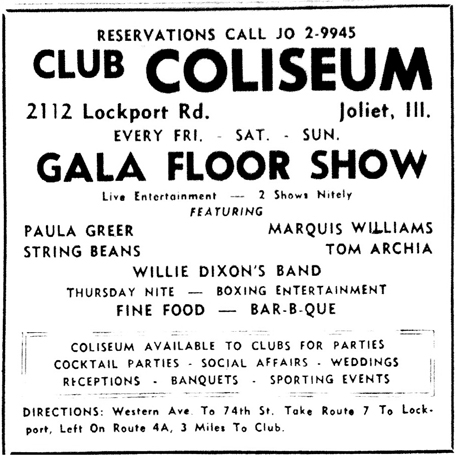
On September 19 and 26, 1959 a Gala Floor Show at the Club Coliseum in Joliet, Illinois, was advertised with a lineup that included a comedian called String Beans (maybe the same "Stringbean" who had been part of the Chocolateers?), local singer Paula Greer, Willie Dixon's Band, and Tom Archia. An October 3 ad from the same venue had Nate Jackson vs. Tom Archia plus Paula Greer and String Beans again.
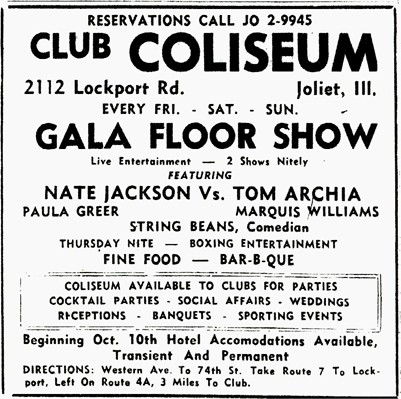
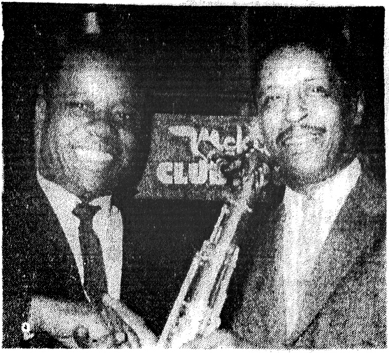
What may be the final duel between Little Wash and Tom Archia took place at McKie's in the final month of 1959. It was advertised on December 5 and 12.
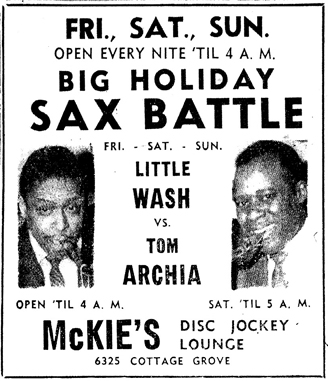
In 1960, after writing several letters to Henrietta Archia complaining about lack of financial support for her and the children, Freda married Stanley Desmond. The children's new stepfather did not want Tom Archia around. After 1960, he never saw two of his children again, and was reunited with Robin only in 1976. (Freda and Stanley Desmond were divorced in 1969 or 1970.)
Tom Archia's final session is best known for a famous photo by William Claxton (see below). In fact, the Blues Party was a special event organized by Jump Jackson for Claxton and German jazz critic Joachim Ernst Berendt, who were traveling around the United States putting together a book on jazz history.
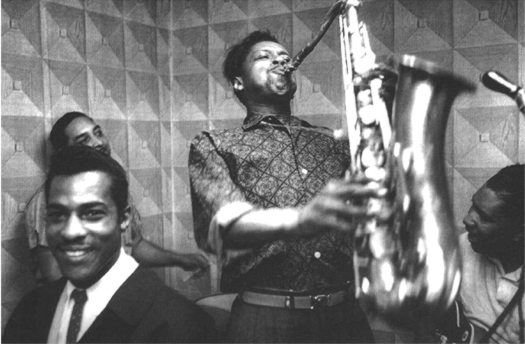
The book, titled Jazz Life, was published in 1961, in German only, by Burda. This first edition is now an extremely rare book, but a copy is preserved in the Otto Flückiger collection. In 2005, Taschen Verlag put out a significantly expanded second edition as Jazzlife: Auf den Spuren des Jazz um 1960. Eine Reise durch Amerika, now including an English translation of the original German; a parallel offering was an extremely expensive limited edition that included two original prints by William Claxton and other extras.
Here's what Berendt had to say about the event (in English from the second edition):
The blues in Chicago was one of the high points of our trip. We wanted to invite the many blues musicians to a party, but how were we going to get their addresses? And anyway, once we had their addresses, who would come? A Chicago blues record company that we'd asked for help told us to abandon all hope - our "blues party" was a pipe dream. But the singer and boogie pianist Memphis Slim, who comes from Memphis but has been connected to the Chicago blues scene for so long now that he should really be called 'Chicago Slim' sent us to Jump Jackson, and Jump is a drummer whose band accompanies all these blues musicians at their recording sessions. [...] Jump Jackson gave us his address book and his garage. He calls the garage a "studio", but if it isn't a garage, it's a wooden shack — it's definitively not a studio. It is located at South La Salle Street. We invited our blues musicians. And all of them came: St. Louis Jimmy, Sunnyland Slim, Little Brother Montgomery, Lee Jackson, Willie Mabon, Clear Waters, Memphis Slim, Roosevelt Sykes, Shakey Jake, Jonnie Thompson, Jimmie Thompson, Tom Archia, Corky Roberts [sic], Jump Jackson's band ...
The first edition of the book was accompanied by two 7-inch 33-rpm records on the German Metronome label. Some of the tracks included were commercial recordings available elsewhere, but others were newly recorded by Claxton and Berendt on their history tour. One of the 7-inch 33-rpm records contains two tracks from the session not previously known to us; one of these, in turn, includes Tom Archia.
But there is much more...
St. Louis Jimmy Oden (voc -1); Sunnyland Slim (p -2, voc -3); Willie Mabon (p -4, voc -5); Roosevelt Sykes (p -6, voc -7); Memphis Slim (p, voc -8); Shakey Jake (hca, voc -9), Eddie Clearwater (as "Clear Waters") (eg, voc -10); Lee Jackson (eg -11; voc -11a); Tom Archia (ts -12); Corky Robertson (b -13); Armand "Jump" Jackson (d -14); Johnny Thompson (voc -15); James Thompson aka Jimmy Johson (eg, voc -16)
Jump Jackson's garage, 5727 La Salle Street, Chicago, summer 1960
| Goin' Down Slow* (Oden) -1, 6, 12, 13, 14 | Private recording | ||
| Hard Drivin' Woman* (Luandrew) -2, 3, 11, 12, 13, 14 | Private recording | ||
| Boogie Woogie (Jackson-Luandrew) -2, 11, 13, 14 | Private recording | ||
| Goin' Back to Tennessee (Mabon) -4, 5, 11, 13, 14 | Private recording | ||
| Wanna Be Cool (Harrington) -2, 10, 13, 14 | Private recording | ||
| Long Lonesome Night* (Sykes) -6, 7, 12, 13, 14 | Private recording | ||
| Born with the Blues (Chatman) -8, 13, 14 | Private recording | ||
| Things Are Different (Harris) -4, 9, 11, 13, 14 | Private recording | ||
| Come Day Go Day (Oden) -1, 6, 11, 13, 14 | Private recording | ||
| Depression Blues (Luandrew) -2, 3, 11, 12, 13, 14 | Private recording | ||
| El Capitan (Chatman) -8, 13, 14 | Private recording | ||
| Miss Ida B. (Sykes) -6, 7 | Private recording | ||
| Sunnyland Bounce (Four Day Bounce) (Luandrew) -2, 3, 11, 13, 14 | German LP [no label or #] | ||
| Love My Baby (Harris) -4, 9, 11, 13, 14 | Private recording | ||
| Please Send Me Someone to Love (Mayfield) -11, 13, 14, 15 | German LP [no label or #] | ||
| Hillbilly Blues (Harrington) -10, 11, 12, 14 | German LP [no label or #] | ||
| Change of Love -11, 11a, 12, 14 | Private recording | ||
| Save Me a Drink -1, 6 | unissued | ||
| The Girl I Love -1, 6 | unissued | ||
| Poor Boy -1, 6 | unissued | ||
| I'll Always Love You -9, 11, 12, 14 | German LP [no label or #] | ||
| In My Dreams -6, 7, 11, 12, 14 | German LP [no label or #] | ||
| Long about Midnight -11, 12, 14, 16 | German LP [no label or #] | ||
| Number Nine (Sykes) -6, -7, -11, -12, -13, -14 | Metronome [G] JEB 1001 B [7 inch 33 rpm] | ||
| Spoiled Your Baby (Harris) -9, -10 or 11 | Metronome [G] JEB 1001 A [7 inch 33 rpm] |
The first 15 tracks (through "Please Send Me Someone to Love") came to our attention back in 1997, as part of a 45 minute private recording circulating among collectors. The personnel and location came from a note accompanying the tape made available by Daniel Gugolz. Between pieces, some of the musicians are identified on the tape and Tom's name is spelled out. Another William Claxton photo of the session shows Eddie Clearwater. All of the 15 tracks are now listed in Les Fancourt and Bob McGrath, Blues Discography 1943-70 (West Vancouver, BC: Eyeball Productions, 2006); Fancourt and McGrath were our source for the mysterious German LP on which some of these tracks have also appeared.
The next 8 tracks (from "Hillbilly Blues" through "Long about Midnight") are not on the aforementioned private recording, and were previously unknown to us. However, they are listed in Fancourt and McGrath, sometimes as merely unissued, sometimes as unissued and recorded for La Salle. They are not attributed to the Blues Party, but the dates, personnel, and the suggested attributions to La Salle make the connection clear. The German LP with no label or number that is mentioned by Fancourt and McGrath needs tracing.
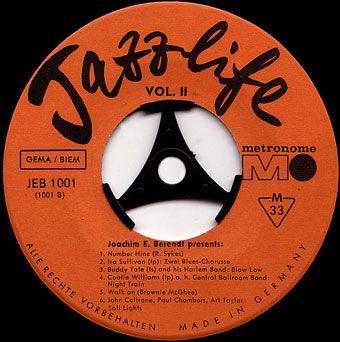
The last 2 tracks were not previously known to us, and are not listed in Fancourt and McGrath either. However, they are on one of the two 7-inch 33-rpm compilation records that were included with the first edition of Jazz Life back in 1961. The contents of these two records have been reissued on an unnumbered CD with the second edition of the book, but regrettably none of the other tracks from the party were added.
Tom Archia plays on 10 of the 25 tracks now known. He delivers prominent obbligati to "Goin' Down Slow" and "Long Lonesome Night". A full solo, on "Hard Drivin' Woman," shows him using his favorite blues licks. His role on "Depression Blues" is a less prominent one, sharing a simple riff with guitarist Lee Jackson. On "Number Nine" he plays another full solo, with a rough tone and some rock and roll phrasing. We have yet to audition his contributions to "Hillbilly Blues," "Change of Love," "I'll Always Love You," "In My Dreams," and "Long about Midnight."
A full-fledged commercial release of this material is long overdue; Archia's playing is just the cherry on the blues piano pie.
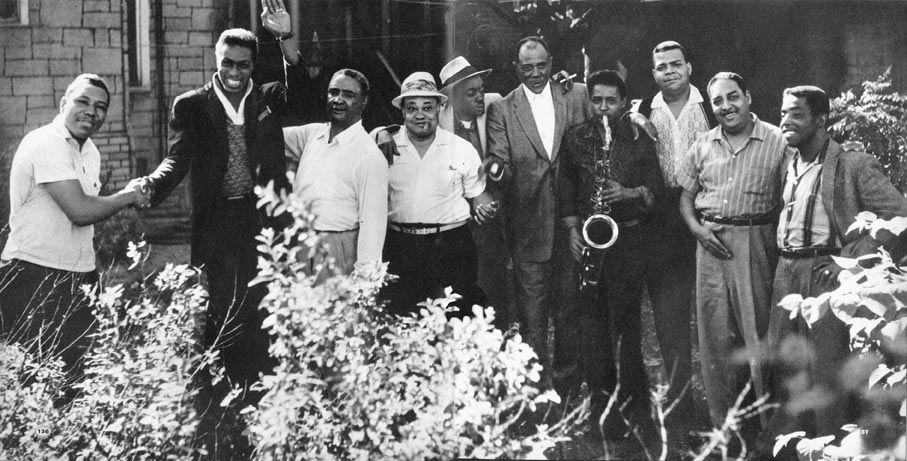
As might be expected, many of the musicians appearing at the party made recordings under their own names for Jump Jackson's La Salle label (Sunnyland Slim, for instance, and Eddie Clearwater). The announcements ("and here's Willie Mabon's newest ...") were helpful for Berendt and Claxton's intended readership, but make the whole affair less spontaneous than a party.
The exact date of the party is not known, but judging from the clothes worn in the photo it appears to have been during the summer. Little Brother Montgomery is the only musician in the group photo who is not known to be on any of the 25 tracks listed above. He was, however, included in a Sunnyland Slim session of July 14, 1960, which produced 10 tracks; 7 of these saw release on a British 77 LP, and all 10 have now appeared on a Southland CD. The rhythm section on that session consisted of an unidentified guitarist, Corky Robertson, and Jump Jackson. However, the other participants in the Blues Party, including Tom Archia, were not on these sides, and a version of "Depression Blues" without Archia was apparently included. So this was most likely a separate outing close in time to the Blues Party.
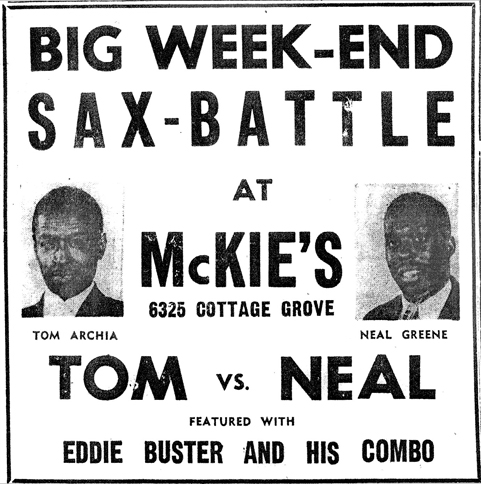
Henrietta Archia died in 1960 while visiting Richie Dell in California. Tom Archia ended up spending part of that year in Houston. However, he was back in Chicago by October, because McKie's staged a sax battle between him and Neal Green on October 8 and 9. There is no mention of Tom Archia in the Defender from 1961. In July 1962 he was leading a combo at the Pershing Lounge; we know about this engagement because he was called in front of the Local 208 Board on July 19, 1962 and fined $10 for failing to file a contract, failing to pay local tax—and for hiring Steve Boswell, a drummer who had been "erased" for failure to pay quarterly dues, local tax, and a fine to the Union. On September 22, 1962 an a Defender ad from Gladys' Cocktail Lounge specified "Tom Archer & his Combo." And on August 24, 1963, McKie's DJ Lounge advertised a stand through Sunday September 1: Illinois "Bonita" Jacquet & his organ trio plus Tom Archia. There is an extant photo of McKie's taken from the street, in which banners for this gig are plainly visible. According to Bob Porter, who caught them one night, Tom was still near the top of his form at this time: "Tom opened—using the same organ and drums. I heard two sets and they [Archia and Jacquet] did not play together. Tom was great!"
Although the gig at McKie's is the last one that we have found an advertisement for, Tom Archia continued to play the Chicago clubs. But as the 1960s wore on, it became tougher and tougher for jazz musicians to find work, and alcohol was taking its toll. At some point in 1964, Tom Archia was "erased" from the membership rolls of Local 208, probably for failing to pay "local tax" (although we should note that during the three years of struggle that preceded the January 1966 merger of the old Union locals in Chicago, musicians who moved to the formerly all-White Local 10 and stopped contributing to Local 208 were punished by being "erased"). On December 31, 1964, he played a New Year's Eve event at the Trianon Ballroom. We know about this gig because on January 7, 1965, three other musicians were called on the carpet by the Local 208 Board for working the job with him:
James [sic] Barge, a member of Local 702, appeared before the Board with Robert King, Ben Turner, and Max Robinson. (Tom Archia, erased member of Local 208 did not appear.)
In fact, the leader on the gig was tenor saxophonist Gene "Big Daddy" Barge, who had been affiliated with Chess Records for some time, but had relocated to Chicago just recently.
After the two locals finally merged, Ernest A. Archia (no address or telephone number) was still listed in the Membership Directory of the Chicago Federation of Musicians in August 1966. But the next year found him in dire straits. According to his old dueling partner, Lucius Washington, Tom had been badly injured in a fight; his jaw was broken and he couldn't play. (A possibly embroidered version of this story, still to be verified, is that Tom was beaten up by a policeman who was offended by the risqué lyrics that to some of his vocal numbers.) By this time, his sister had long since returned to Houston with her three children, and was teaching music and directing the chorus at Fidelity High in Galena Park (a suburb on the east side of the city). "Illinois Jacquet said I'd better send for him. I sent for him the same day." An ambulance was waiting at the railroad station in Houston when the train pulled in. After a long period of recuperation, Tom Archia was able to perform again. Meanwhile, Freda and the children left Chicago, moving to her home town, Winnipeg, in 1968.
Gigs had become very hard to find. "The demand for music in Houston was nil," Richie Dell recalls, and Tom Archia did not try to gain a toehold in soul music, as King Kolax had done in Chicago, or in salsa, as other jazz players have done in Texas. But Tom Archia played clubs all over Houston, including a place on Blodgett run by Fred Williams (probably the Ritzy Lounge). Alvin Hubert recalls working with Tom Archia (who by then had acquired the nickname "The Devil"—"he literally played the Hell out of his sax"): "I met Tom in 1973. We played in the Sonny Franklin Big Band—he naturally played 1st tenor and I played 2nd tenor. I learned a whole lot by listening and talking to him. Richie Dell also played with this band from time to time, a very fine pianist and a first class LADY..." Other Franklin band members included Joe Bridgewater (trumpet), "Blip" Thompkins (trombone), Arnett Cobb (tenor sax), George Haynes (drums, vocals), and "another Great and forgotten Texas Tenor by the name of Don Wilkerson was also in the band, boy talk about a great learning situation..." Larkin band veteran Cedric Haywood provided the arrangements, and guests included Eddie "Cleanhead" Vinson and Clarence "Gatemouth" Brown. In Alvin Hubert's opinion, "Now Arnett Cobb was a tremendous saxman but, 'The Devil' was way ahead of him in that aspect. I have seen them both together at jam sessions at which I was present, Tom was light years ahead..."
From the George McElroy column, we learn a little of Tom Archia's repertoire in his later days. He was fond of "Danny Boy," "Amapola," "Malagueña," and "April in Paris"—none of them tunes that Aristocrat would have been inclined to record! Like so many tenor players of the period, including Madman Jones, Tom paid attention to the output of Stan Getz. McElroy noted that "He introduced 'The Girl from Ipanema' to music lovers at Houston's Club Supreme, Ritzy Lounge on Blodgett, Continental Showcase, Laveek, and other spots."
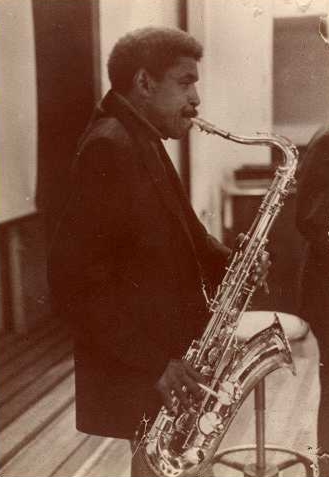
In 1976, Robin Archia (now 23 years old) was able to locate her father in Houston. She visited him for Thanksgiving, not knowing that he was ill with cancer and had less than two months to live.
Tom Archia died at St. Elizabeth's Hospital in Houston on January 16, 1977. He was 57 years old. Richie Dell says, "He had a self-satisfying life. He was doing what he wanted to do." The obituary in the Houston Post noted that the funeral would include "Arnett Cobb, soloist." His fellow musicians (also including trumpeter Joseph Bridgewater and drummer Isidore Pollard) saw him off. "Nobody said a word. When they had his wake on Lyons Avenue, the musicians came out of the blue. They came, they took their horns out, they jammed for an hour. They woke up the Fifth Ward that night... It was a beautiful tribute to him." Alvin Hubert, who also worked in combos with Tom Archia, adds, "I remember my friend's wake very well. Instead of the regular funereal music, Charlie Parker was played and then there was a jam session. I felt very proud for my friend 'THE DEVIL,' he was a very fine musician and a very special friend." The McElroy column mentions bassist Johnny Williams, guitarist Sonny Franklin (whose rehearsal band Tom Archia had been a regular in), and saxophonists I. H. Smalley and Joe Fletcher among the participants. Tom Archia was buried at Oakwood Cemetery in Hempstead, Texas. Although the obituary spelled his name as we have done here, on the gravestone his last name appears as "Archie," the form still used by everyone else on his father's side of the family (George McElroy also spelled the name "Archie").
None of Tom's three children has taken up music as an occupation. Robin Archia is an international trade manager for a customs house broker in Chicago. However, Cotie's daughter, now nine years old, has shown an interest in music. Tom's nephews and nieces have carried on the Archia musical tradition. Richie Dell's three children sang together as a vocal trio; she started their training when they were as young as 4. They appeared on Ted Mack's Amateur Hour, and performed in Los Angeles and Houston. Anita Moore was the featured vocalist during the last two or three years of Duke Ellington's Famous Orchestra, and she continued with the latter-day band under the direction of Mercer Ellington. Anita Moore died in Houston, Texas on April 28, 2001; she had been in a coma for several months after a heart attack. Angela Moore sings with the Opera Guild in Houston. Bernard Moore (who died in the mid-1990s) played flute, clarinet, bassoon, tenor and soprano saxes, and settled in Helsinki, Finland.
Tom Archia's ex-wife Freda Desmond died on June 15, 1991. His one-time employer, Milt Larkin, retired from performing in 1995 and died on August 31, 1996. oe Knight, the pianist in that much-recorded Hot Lips Page band, died in Brooklyn on April 23, 1999.
How can an artist of Tom Archia's caliber have been overlooked for so long? Millions of R&B fans have enjoyed the buoyant ending of "Good Rockin' Tonight" without realizing that Tom Archia made it possible, or being moved to investigate his other recordings. In part, this happened because his recording career was only a short segment of his time on the scene. Moreover, he recorded all of his work as a leader for Aristocrat. After Muddy Waters assured the financial survival of the label, and its name was changed to Chess, the earliest Aristocrat material was overlooked, and too much of it has never been reissued in any form. (Even with the 15-CD historical overview of Chess records that came out in 1999, only 7 sides from Archia's Aristrocrat days had seen release on CD; neither the "Slumber" session, the clandestine live session, nor the two sessions with Jo Jo Adams had been touched at all.) As a sideman, Archia recorded prolifically for King Records, but little attention has been paid to his contributions there, except on "Blow Your Brains Out," where Wynonie Harris improvises vocal lines about him and fellow duelist Hal Singer.
In the compact disc era, a comprehensive release of Tom Archia recordings is both a technical and a commercial possibility. We have nearly reached this goal, with the 2001 releases of Classics 5006 (Tom Archia 1947-1948) and Classics 5001 (Marion Abernathy 1947-1949), followed by the 2002 release of Classics 5028 (Andrew Tibbs 1947-1951). The 2-CD set from Ace, Wynonie Harris King & Deluxe Acetates, finally arrived in 2015 with two new sides and a host of previously unissued alternates. Tom Archia's work with Jump Jackson for Aristocrat still awaits comprehensive reissue, as do his appearances with the Hot Lips Page band behind Barbara Cameron and on several more instrumental tracks.
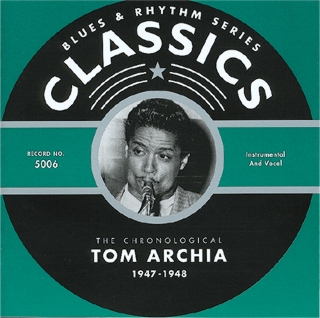
There are three more King sessions from December 1947 where we used to suspect the Page band's involvement. (Existing discographies don't even get the date and location right for these items, and say nothing about the musicians.) The material is entirely pop standards on the first two session, and mostly standards on the third. Now that we he have been able to hear "You're Mine You," we know that the first of the three did not involve the Page band. A review in Billboard of the album made at the second session also indicates a different band. But the third session remains open, so we will keep these sessions as an appendix until we have been able to check more of the sides. Unfortunately, some King 78s from this era were put out in extremely limited editions. If disc jockeys showed no interest in a record, no more copies were pressed, which apparently is what happened to the output from all of these sessions.
Both singers were affiliated with radio stations in the region: Barbara Cameron with WLW in Cincinnati and "Lonesome Gal" with WING in Dayton.
Barbara Cameron (voc); unidentified (org); unidentified (eg).
prob. Cincinnati, late December 1947
| K5354 | Mad about the Boy | unissued | |
| K5355 | You're Mine You (Green-Heyman) | King 4281-A | |
| K5356 | Your Eyes Have Told Me So | unissued | |
| K5357 | If This Be Love | unissued | |
| K5358 | Where or When | unissued | |
| K5359 | How Deep Is the Ocean? | unissued | |
| K5360 | I've Had My Moments | unissued | |
| K5361 | My Wonderful One | King 4269-B |
Our basic information is from Ruppli, The King Label. Ruppli gave no location for this session or the next two, but they are all from the same block of matrix numbers that were used for the late December sessions in Cincinnati. King 4269 and 4281 were 78-rpm singles released at the time.
A listen to King 4281-A, in the collection of Tom Kelly, indicates that the accompaniment on "You're Mine You" consists of organ (in the Glenn Hardman or Milt Herth mode) and electric guitar. The label in fact reads "Vocal with Organ." The matrix number appears on the label as 5355 without the K prefix.
Lonesome Gal [Jean King] (voc); Ralph Lane (p, dir); others unidentified.
prob. Cincinnati, late December 1947
| K5362 | You Go to My Head | unissued | |
| K5363 | I See Your Face before Me | unissued | |
| K5364 | Don't Blame Me | King 36807, King K-6 | |
| K5365 | But Not for Me | King 36809, King K-6 | |
| K5366 | Why Shouldn't I? | King 36807, King K-6 | |
| K5367 | I Could Write a Book | King 36808, King K-6 | |
| K5368 | If I Loved You | King 36808, King K-6 | |
| K5369 | Speak Low | King 36809, King K-6 |
Ruppli's discography gave us matrix numbers, issue numbers, and titles, but not the location or accompaniment. King K-6 was an album in the original sense, containing three 78s. Billboard noted on January 24, 1948 that "King platters will release late this month the first disking by Lonesome Gal, mystery platter pilot of WING, Dayton, O" (p. 21). We don't know whether the individual 78s were released singly. However, King K-6 was reviewed in Billboard, appropriately on Valentine's Day (February 14, 1948, p. 33; album received on February 7, p. 34), and the accompaniment was credited to the Ralph Lane "Orchestra" (consisting of piano and rhythm). The singer was shown on the cover wearing a mask. Although each 78 in the album got a number in the 36800 series, the matrix numbers are from King's main series.
According to Ted Schober (email, April 7, 2003), Jean King, who had been an actress in Tarzan movies, began appearing on a radio program in October 1947. The 15-minute show, called "Lonesome Gal," originated from WING in Dayton, Ohio. King's husband, Bill Rosseau, was a radio producer best known for the radio version of "Dragnet." As Schober says, the show "became wildly popular mixing some romantic music with sexy chatter. Part of the allure was that her identity was not revealed until 1953." Well, maybe not to the average listener. But Billboard was referring to Lonesome Gal by her real name not long after King K-6 was released (May 8, 1948, p. 10)
The titles on the Lonesome Gal session are all standards that would have been featured on the program. And since King was headquartered in Cincinnati, its owner Sid Nathan was in a good position to hear about the radio show and try to capitalize on it. "Lonesome Gal" later recorded for Columbia; a single featuring her theme song was reviewed in Cash Box on March 17, 1951 (p. 8).
Barbara Cameron (voc); accompaniment unspecified.
prob. Cincinnati, late December 1947
| K5370 | If You Play the Blues, I'll Cry | unissued | |
| K5371 | I Love You, Yes I Do | King 4203 | |
| K5372 | What'll I Do? | King 4209 | |
| K5373 | Two Loves Have I | King 4203 |
Ruppli gave no location for this session and said nothing about the accompaniment. The matrix numbers immediately follow the Lonesome Gal album (which ended at K5369) and immediately precede the Lonnie Johnson side (K5374) that we know is from a Page band session on December 23, 1947. Without hearing the sides, which are extremely rare, we can say no more. The inclusion of Bull Moose Jackson's big ballad hit for King, "I Love You, Yes I Do," might point to the Page band's involvement, but the number was being taken up by lounge trios at the time (for instance, on Duke Groner's first record as a leader; see our Ebony page for more about that). King could also have recorded Barbara Cameron with Ralph Lane.
King 4203 was reviewed in Billboard on February 14, 1948 (p. 31). It was listed as one of 8 recorded versions of "I Love You, Yes I Do" in an ad for Lois Music Publishing (King's house music publisher, named after Lois Nathan; Billboard, February 21, 1948, p. 34). We haven't found a mention of King 4209 in the trades, but interpolation among the company's releases (right before Wynonie's blockbuster, King 4210) puts it in March or April 1948. Some Kings from this period were pressed in very limited quantities; we hope copies of these items can be found.
Click here to return to the Red Saunders Research Foundation page.